This brief discusses the experiences of early career Black, Latina, and Afro Latina women in the trades. The COVID crisis has put a spotlight on the concentration of Black, Latina, and Afro-Latina women in low-wage jobs, including in many essential healthcare and retail jobs. The skilled construction trades have given many women an alternative to the poorly paid jobs in the service sector that many had to turn to before finding the trades. Skilled construction trades provide opportunities to build careers that are both challenging and fulfilling, pay a family sustaining wage with benefits, and can be accessed through ‘learn as you earn’ apprenticeships.
Topics
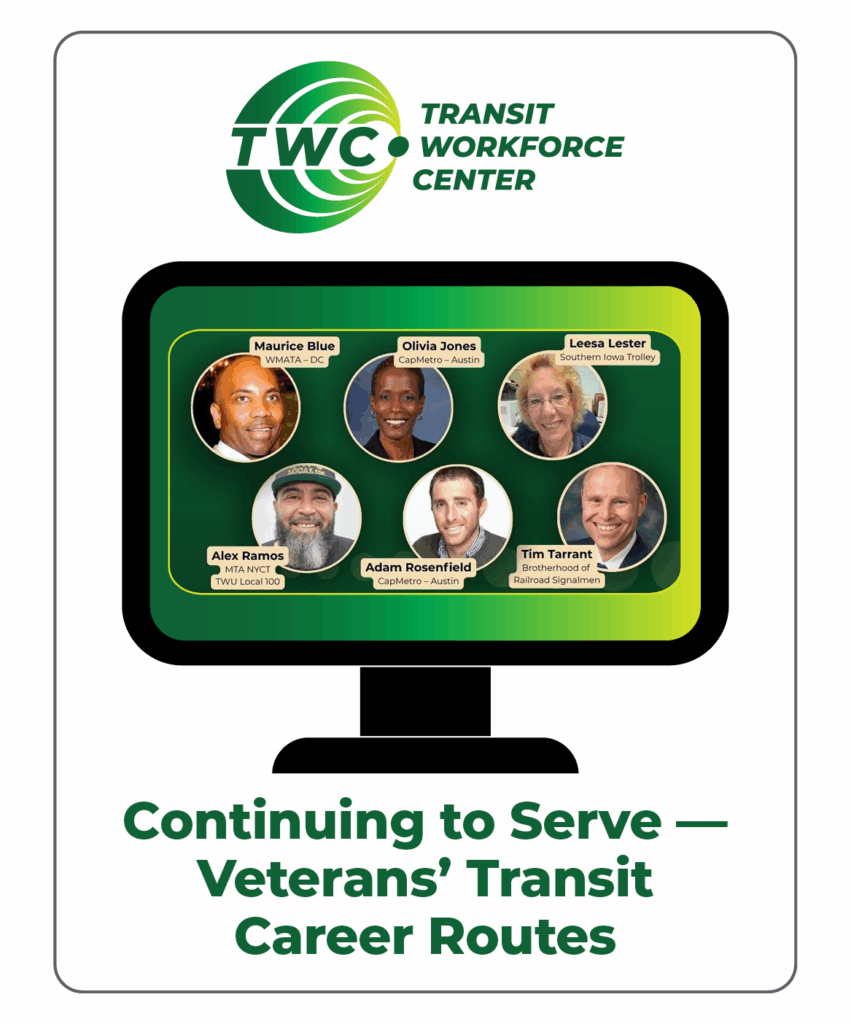
Continuing to Serve — Veterans’ Transit Career Routes
Transit Workforce Center
November 2025
In celebration of Veterans Day, TWC and external partners hosted a webinar exploring public transportation workforce pathways and opportunities for veterans. Check out the webinar recording below to hear from transit agencies and veterans about the experience veterans bring to public transportation, the various career trajectories they can follow in the industry, and how to launch veteran-focused outreach and recruitment programs.
Panelists:
- Maurice Blue — Senior Sourcing Officer, Proactive Sourcing, Washington Metropolitan Area Transit Authority (WMATA)
- Olivia Jones — Director, Operations Control Center and Training, CapMetro
- Leesa Lester — Transit Director, Southern Iowa Trolley
- Alex Ramos — Outreach Coordinator, Transport Workers Union Local 100/Training Upgrade Fund; Light Maintainer, Metropolitan Transportation Authority–New York City Transit
- Adam Rosenfield — Program Manager, Workforce Outreach, CapMetro
- Tim Tarrant — Vice President for Commuter/Passenger, Brotherhood of Railroad Signalmen
Recording:
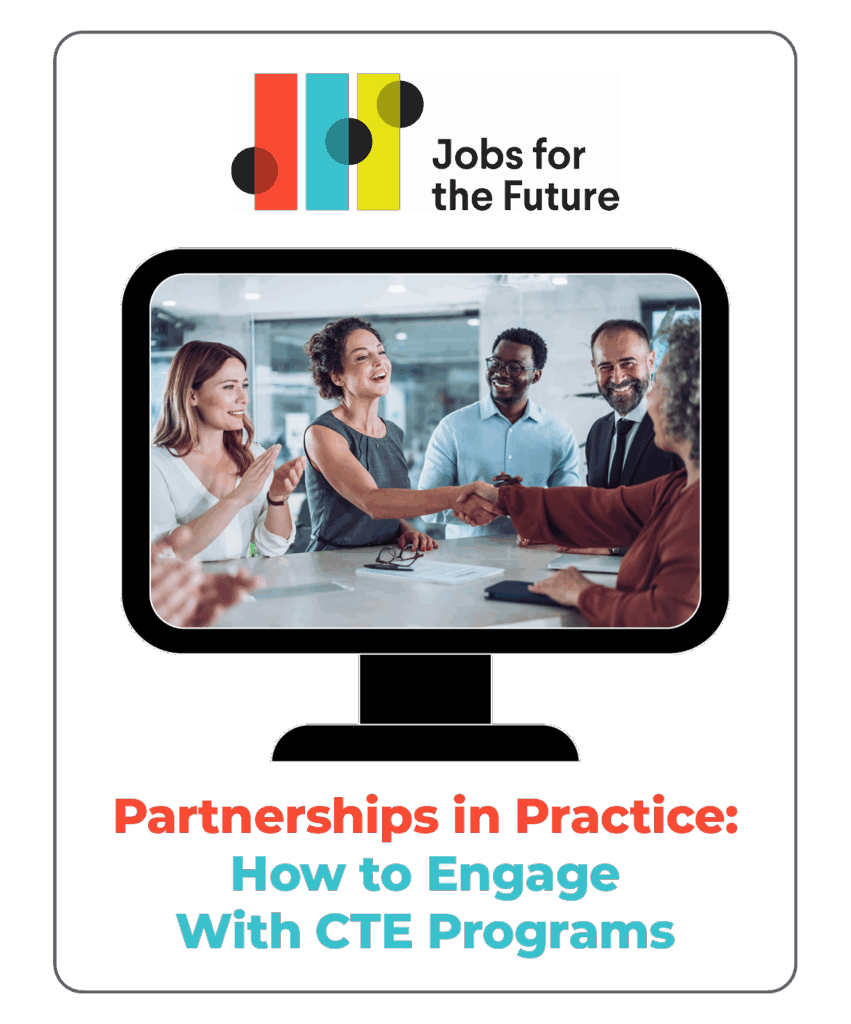
Partnerships in Practice: How to Engage With CTE Programs
This guide outlines a range of ways employers can engage with community college career and technical Education (CTE) programs, which are shown to be local sources of skilled workers. Offering strategies, tools, and advice for employers, it’s a companion piece to the JFF Power Your Workforce playbook.
Jobs for the Future
September 2025
Check out TWC’s college partnership case study for examples from transit of agencies engaging with their local college partners.

Power Your Workforce
This playbook introduces the business value of partnering with CTE, explains how these programs prepare learners with in-demand skills, and shows how employers can tap into this pipeline to meet current and future workforce needs. It explains how community college CTE programs work and provides a clear path to collaboration. It’s companion piece, Partnerships in Practice, offers strategies, tools, and advice for working with local colleges.
Jobs for the Future
September 2025
Check out TWC’s college partnership case study for examples from transit of agencies engaging with their local college partners.
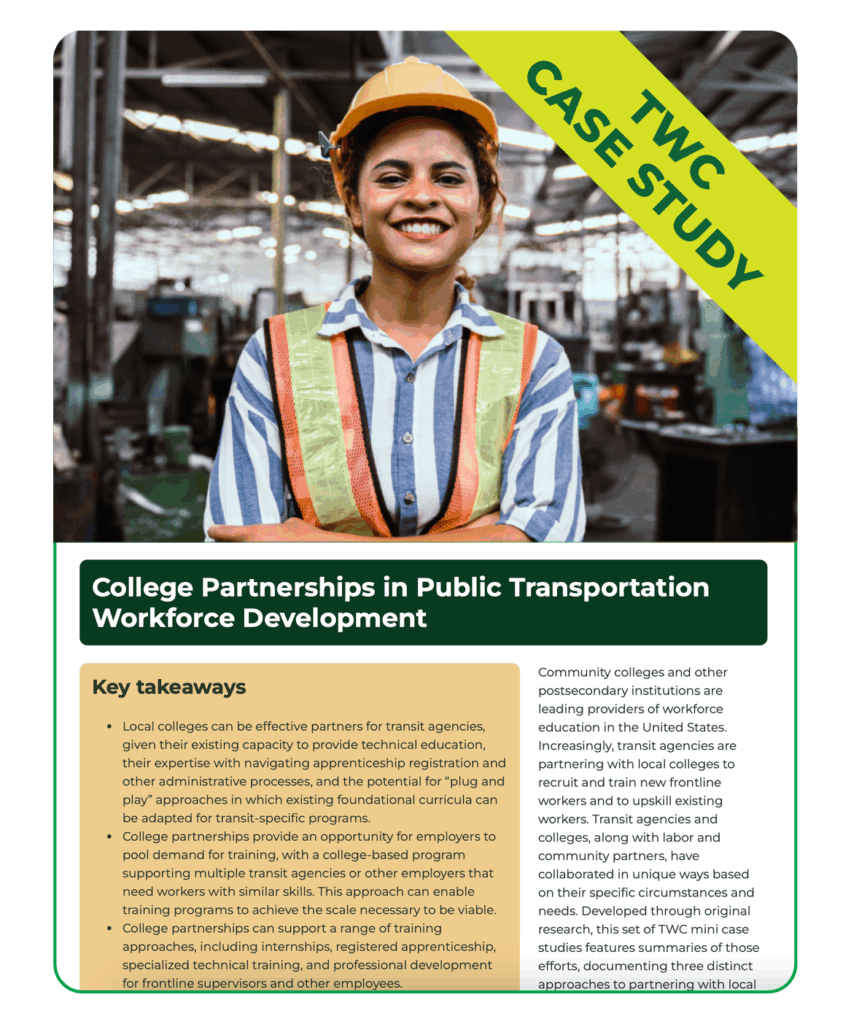
College Partnerships in Public Transportation Workforce Development
Community colleges and other postsecondary institutions are leading providers of workforce education in the United States. Increasingly, transit agencies are partnering with local colleges to recruit and train new frontline workers and to upskill existing workers. Transit agencies and colleges, along with labor and community partners, have collaborated in unique ways based on their specific circumstances and needs. Developed through original research, this set of TWC mini case studies features summaries of those efforts, documenting three distinct approaches to partnering with local colleges.
Transit Workforce Center
September 2025
TOPICS: Apprenticeship , Career Pathways , Community Engagement , Hiring and Recruitment , Training
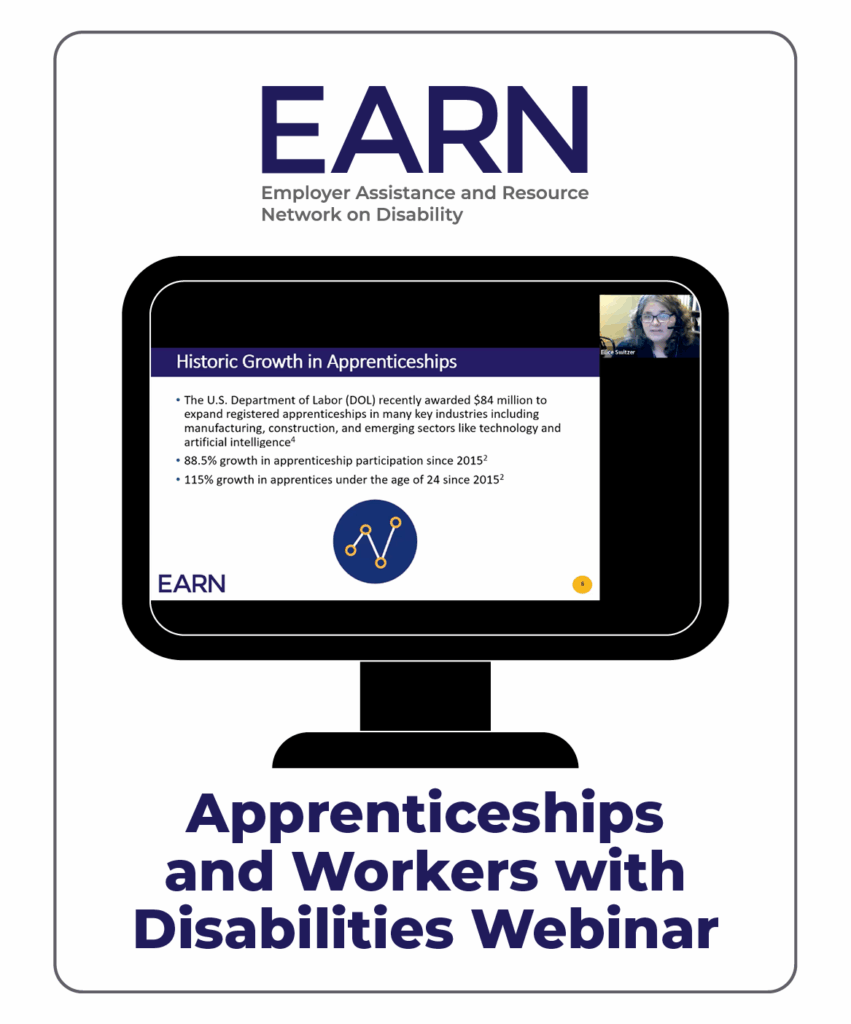
Apprenticeships and Workers with Disabilities Webinar
Employer Assistance and Resource Network on Disability
August 2025
Paid apprenticeships combine education and on-the-job training to prepare workers for long-term career success. By ensuring that all qualified candidates, including those with disabilities, have an opportunity to access apprenticeship opportunities, employers benefit from a broader pool of qualified workers. This webinar recording details practical strategies for recruiting and supporting apprentices with disabilities, as well as where to find recruitment resources and how to develop partnerships to build a talent pipeline. It also highlights a case example of a manufacturing business that credits its partnership with a local community-based organization serving jobseekers with disabilities with saving the local business.
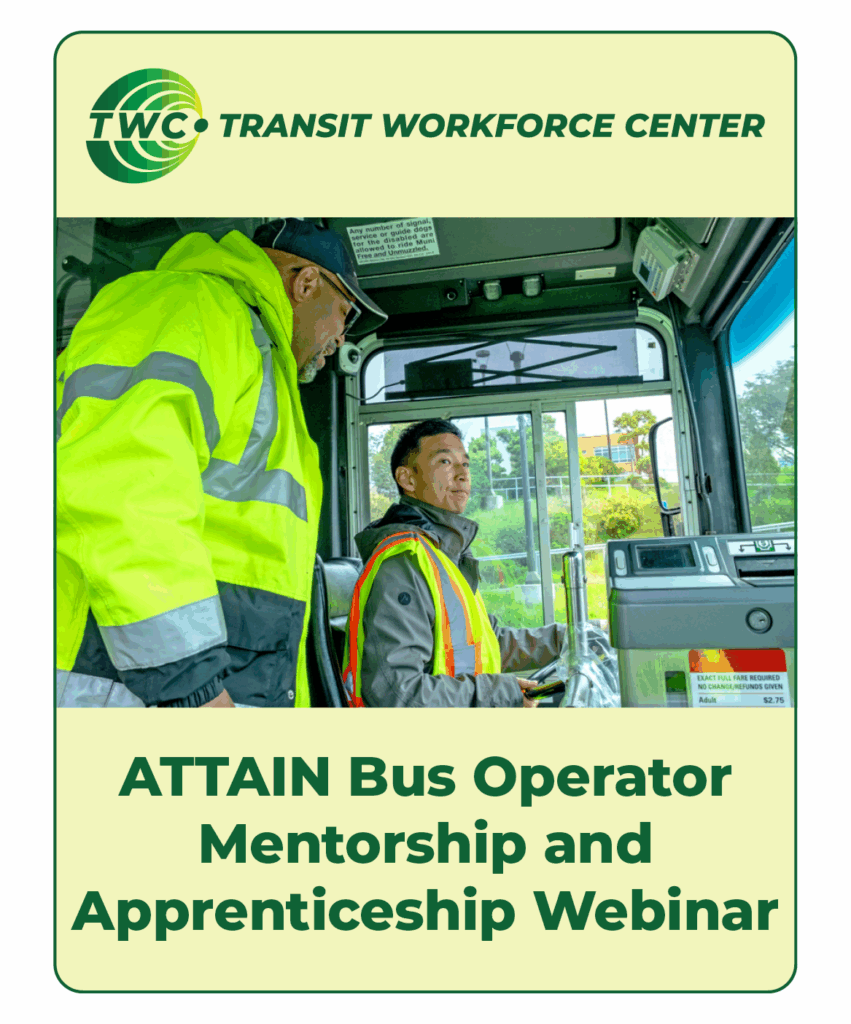
ATTAIN Bus Operator Mentorship and Apprenticeship Webinar
Transit Workforce Center
July 2025
This webinar featured presenters from Greater Richmond Transit Company (GRTC)/ATU Local 1220 in Virginia and Champaign-Urbana Mass Transit District (MTD) in Illinois.
- GRTC and ATU Local 1220 partnered to implement a mentorship program for their bus operators that launched in 2024. Presenters will describe that process, how the program has grown, and the benefits that it has provided.
- MTD launched its bus operator mentorship program in 2023 and has tracked metrics showing the program’s impact. Responding to both quantitative measures and qualitative feedback and observations, MTD is working to restructure the program to better meet the needs of the transit agency and the bus operators participating in the program as mentees or mentors.
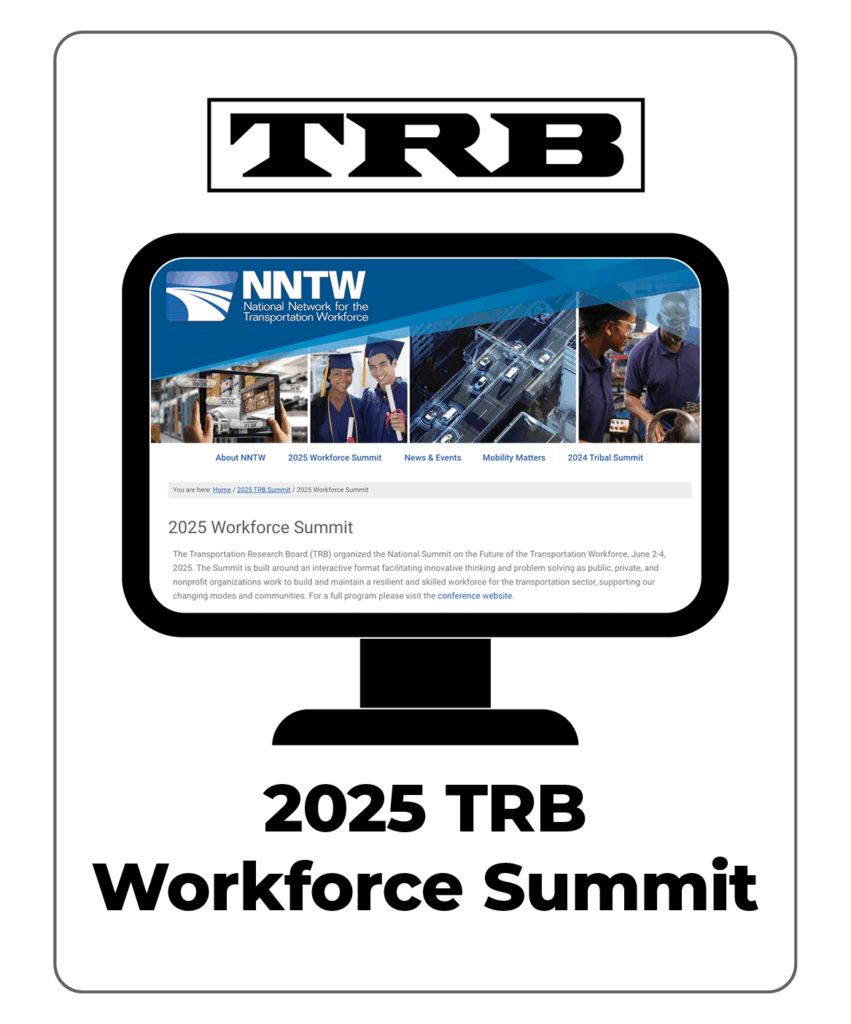
2025 TRB Workforce Summit
The Transportation Research Board (TRB) organized the National Summit on the Future of the Transportation Workforce, June 2-4, 2025. The Summit is built around an interactive format facilitating innovative thinking and problem solving as public, private, and nonprofit organizations work to build and maintain a resilient and skilled workforce for the transportation sector, supporting our changing modes and communities. This landing page provides links to pre-conference webinars and briefing papers from summit sessions.
Transportation Research Board
June 2025
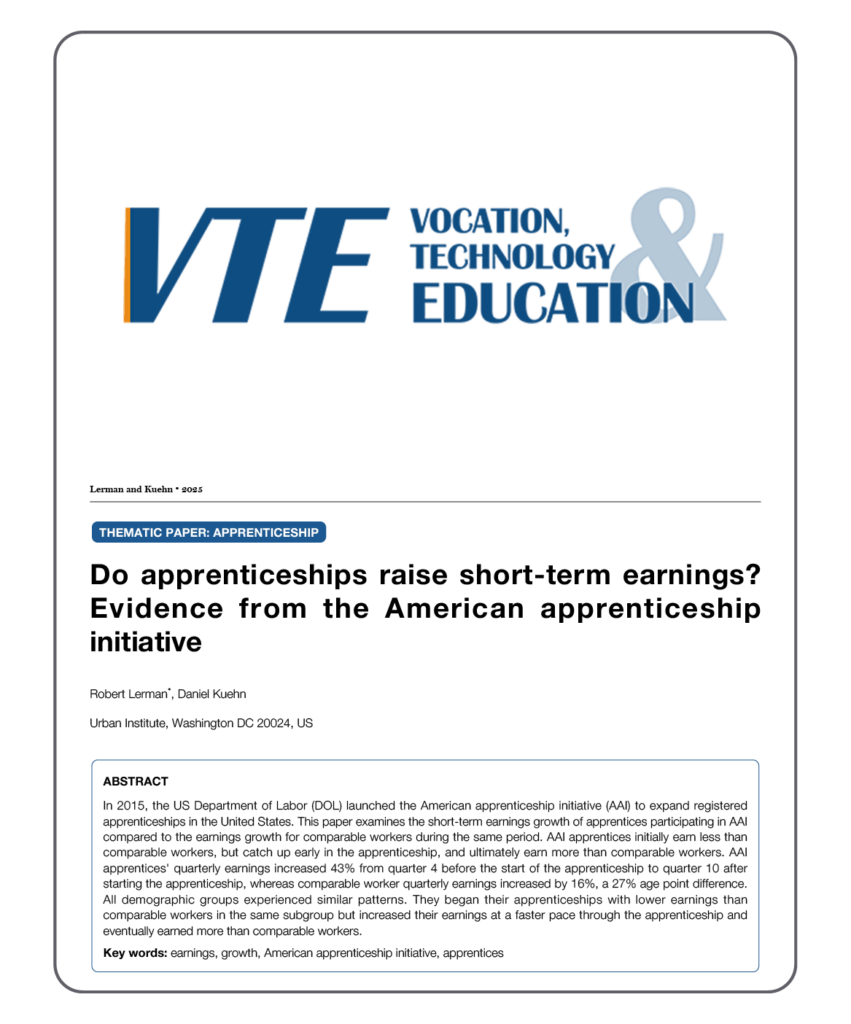
Do apprenticeships raise short-term earnings? Evidence from the American apprenticeship initiative
Vocat Tech Edu.
May 2025
TOPICS: Apprenticeship , Career Pathways , Community Engagement , Policy and Planning
This paper examines the short-term earnings growth of apprentices participating in the American apprenticeship initiative (AAI) compared to the earnings growth for comparable workers during the same period. Researchers found that AAI apprentices initially earn less than comparable workers, but catch up early in the apprenticeship, and ultimately earn more than comparable workers.
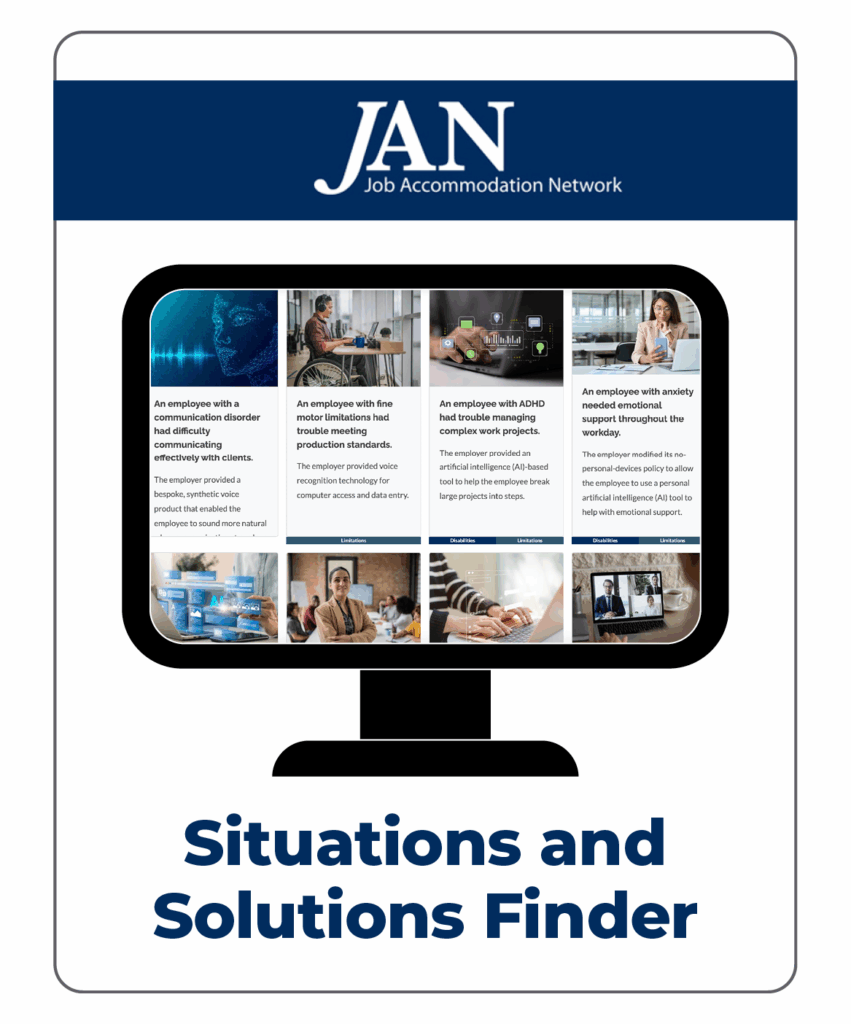
Situations and Solutions Finder
The Situations and Solutions Finder offers a library of workplace accommodation scenarios for industries, such as transportation (e.g., bus drivers, mechanics, dispatchers, etc.) to support workers with disabilities (by disability type, limitations, and occupation). The situations and solutions included are examples of accommodations that were made by JAN customers. Because accommodations are made on a case-by-case basis, these examples may not be effective for every individual or workplace but offer ideas about the types of accommodations that may be possible.
Job Accommodation Network
TOPICS: Community Engagement , Policy and Planning , Safety and Health
The Job Accommodation Network provides free, expert, and confidential assistance on work accommodations for employers, workers and job seekers with disabilities, and all others in industries, such as transportation.
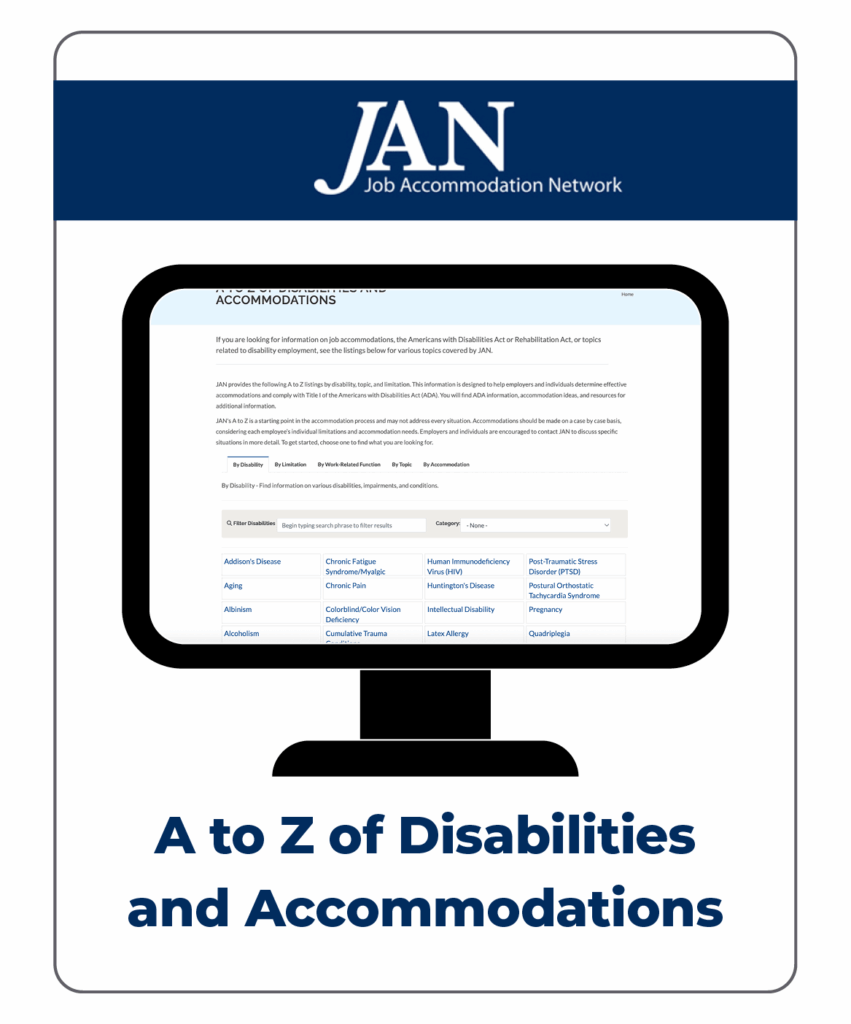
A to Z of Disabilities and Accommodations
The A to Z Library of Disabilities and Accommodations presents information on many common work accommodations, which is sortable by disability, work limitation, work function, and accommodation type and issue. This information is designed to help employers and individuals determine effective accommodations and comply with Title I of the Americans with Disabilities Act (ADA). You will find ADA information, accommodation ideas, and resources for additional information.
Job Accommodation Network
TOPICS: Community Engagement , Policy and Planning , Safety and Health
The Job Accommodation Network (JAN) provides free, expert, and confidential assistance on work accommodations for employers, workers and job seekers with disabilities, and all others in industries, such as transportation.
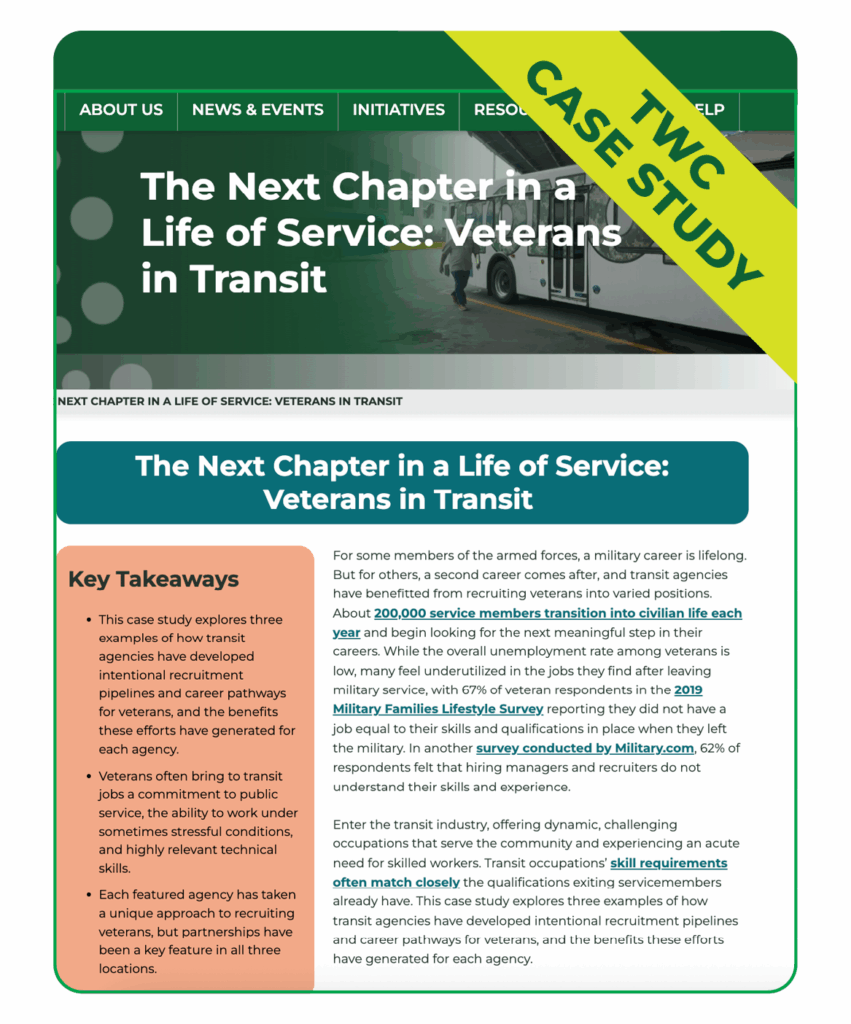
Case Study—The Next Chapter in a Life of Service: Veterans in Transit
For some members of the armed forces, a military career is lifelong. But for others, a second career comes after, and transit agencies have benefitted from recruiting veterans into varied positions. About 200,000 service members transition into civilian life each year and begin looking for the next meaningful step in their careers.
The transit industry offers dynamic, challenging occupations that serve the community and is experiencing an acute need for skilled workers. Transit occupations’ skill requirements often match closely the qualifications exiting servicemembers already have. This case study explores three examples of how transit agencies have developed intentional recruitment pipelines and career pathways for veterans, and the benefits these efforts have generated for each agency.
Transit Workforce Center
March 2025
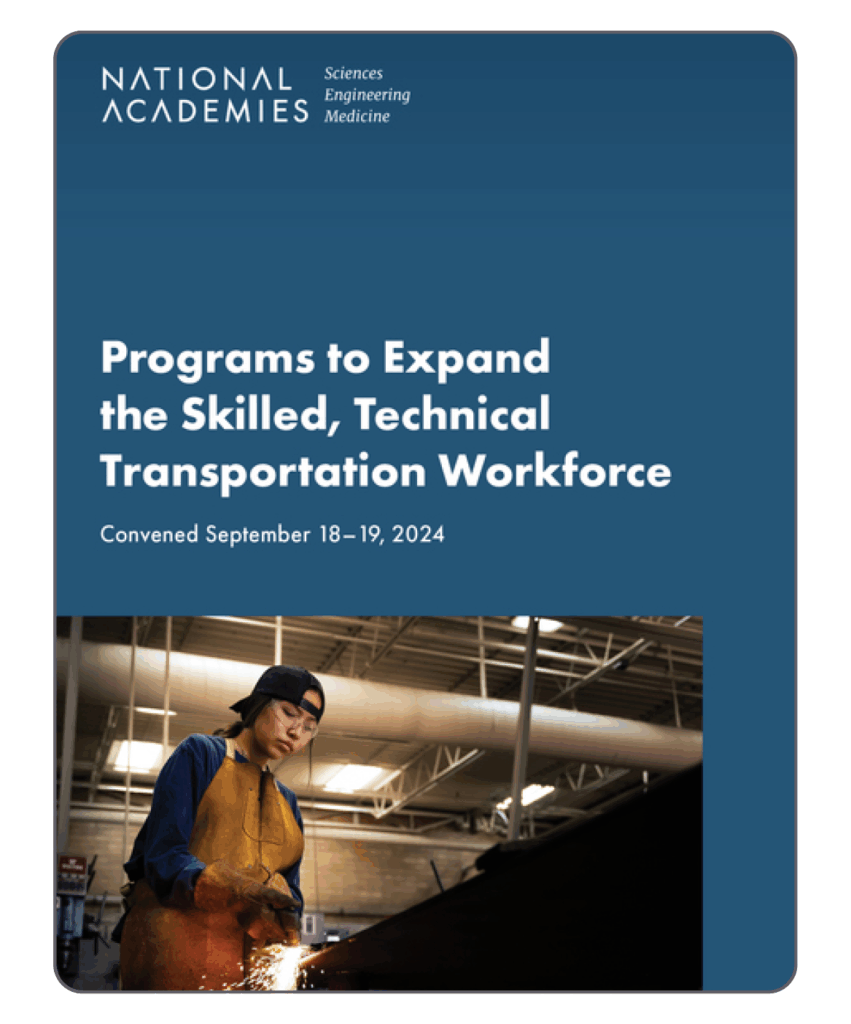
Programs to Expand the Skilled, Technical Transportation Workforce
Programs to Expand the Skilled, Technical Transportation Workforce: Proceedings of a Workshop summarizes the Workforce held in September 2024 at the National Academies of Sciences Building in Washington, DC. The workshop was sponsored by the Federal Transit Administration and the National Science Foundation and brought together experts and educators across academia, government, and industry.
National Academies of Sciences Engineering and Medicine
March 2025
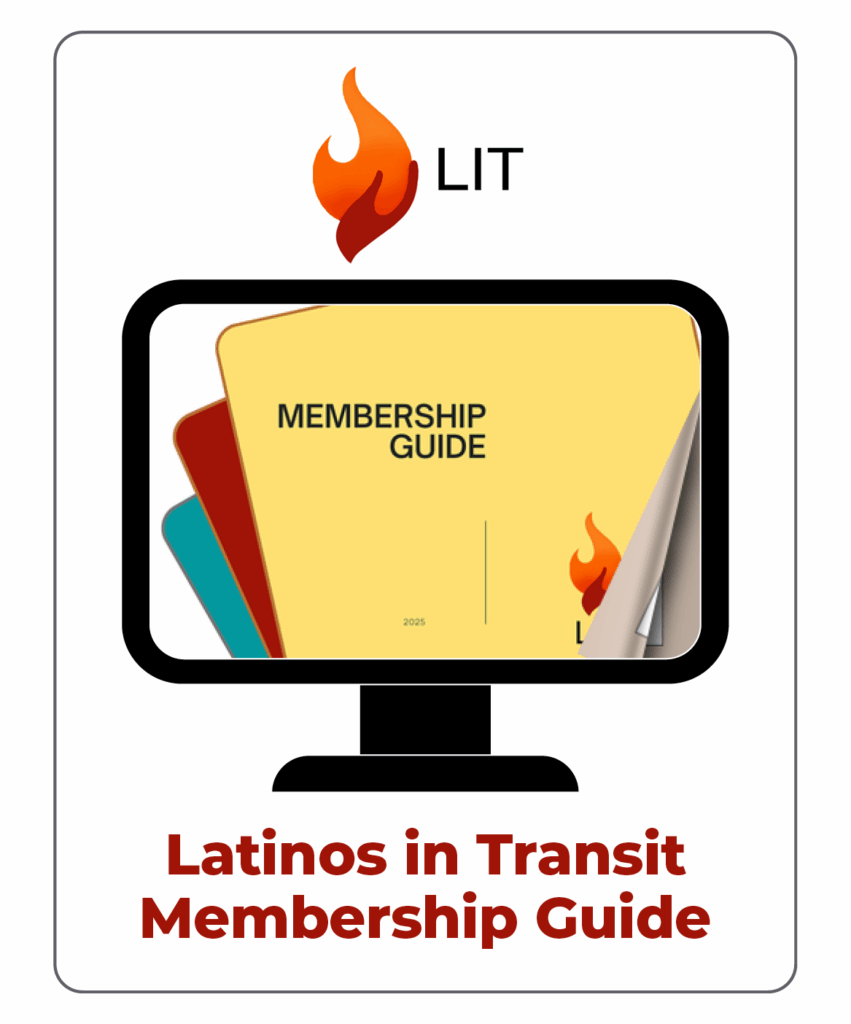
Latinos in Transit Membership Guide
Latinos in Transit is committed to empowering professionals in the transit industry to achieve leadership roles by advancing opportunities for workforce development, mentorship, networking, and education. The LIT Membership Guide explains membership levels and benefits, as well as programming, access, participation, opportunities, and more.
Latinos in Transit
TOPICS: Career Pathways , Community Engagement , Policy and Planning
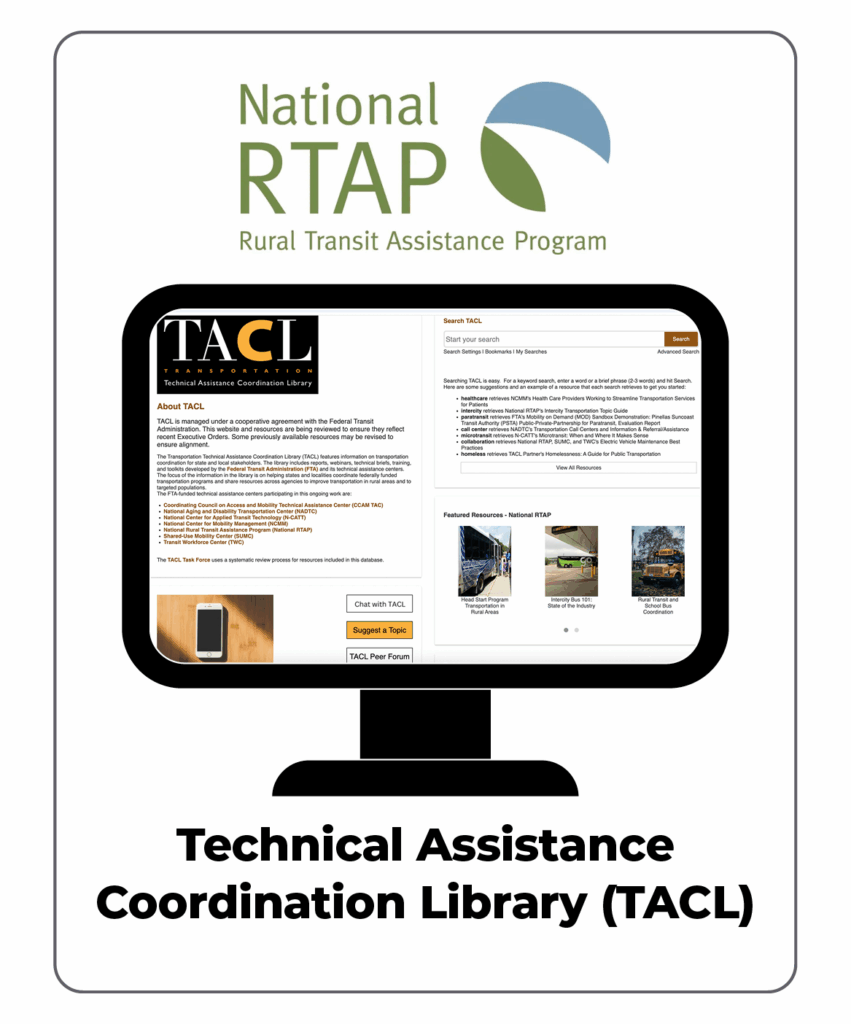
Technical Assistance Coordination Library (TACL)
National Rural Transit Assistance Program
TOPICS: Apprenticeship , Career Pathways , Community Engagement , Hiring and Recruitment , Labor-Management Partnerships , Low-No , Mentorship , Policy and Planning , Procurement , Program Evaluation and ROI , Retention , Safety and Health , Trainer and Mentor Development , Training , Workforce Shortage
Transportation Technical Assistance Coordination Library (TACL)
The Transportation Technical Assistance Coordination Library (TACL) provides a viable methodology and platform for access and findability of rural and tribal transit coordination resources across a broad range of transportation technical assistance centers and the Federal Transit Administration (FTA).
The FTA-funded Technical Assistance (TA) Centers participating in this ongoing work are:
- National Aging and Disability Transportation Center (NADTC)
- National Center for Applied Transit Technology (N-CATT)
- National Center for Mobility Management (NCMM)
- National Rural Transit Assistance Program (National RTAP)
- Shared Use Mobility Center (SUMC)
- Transit Workforce Center (TWC)
The TACL Task Force uses a systematic review process for resources included in the database. New resources will be added on a quarterly basis. Let us know if you would like to serve as a peer reviewer for our resources.
Why was TACL created?
The United States Government Accountability Office (GAO) published Public Transportation: Enhanced Federal Information Sharing on Coordination Could Improve Rural Transit Services in January 2020. GAO recommended that FTA “develop a communication plan that will effectively share information with state and local stakeholders on coordination opportunities in an accessible and informative way.” This effort was created to improve interagency resource coordination between FTA and its five TA Centers.
How can TACL be used?
TACL resources can be used to identify high quality technical assistance on transportation coordination. The resources can be used for research, training, practice, operations, planning, and other purposes. We encourage authors to cite TACL resources.
Ready to get started?
Visit http://transportation-tacl.org. Click on the Training tab at the top for instructions.
If you have a question about TACL, or if you would like to be considered to become a TACL peer reviewer, please contact info@nationalrtap.org
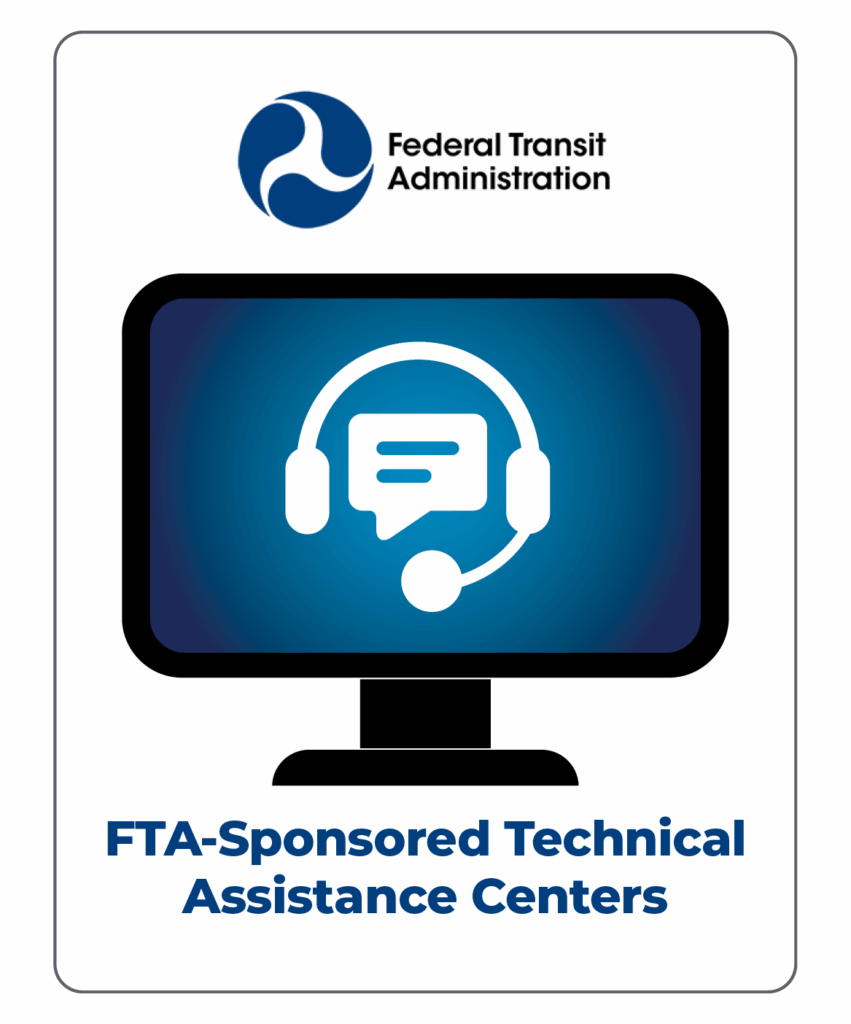
FTA-Sponsored Technical Assistance Centers
Federal Transit Administration
TOPICS: Apprenticeship , Career Pathways , Community Engagement , Hiring and Recruitment , Labor-Management Partnerships , Low-No , Mentorship , Policy and Planning , Procurement , Program Evaluation and ROI , Retention , Safety and Health , Trainer and Mentor Development , Training , Workforce Shortage
FTA’s Technical Assistance and Workforce Development Program (49 U.S.C. § 5314) and the Public Transportation Innovation Program (49 U.S.C. § 5312) fund technical assistance centers through national nonprofit organizations across a number of areas to improve public transportation. These nonprofit partners and the work they do play a critical role in supporting public transit agencies. Their services help to:
- Improve transportation for older adults and people with disabilities
- Drive the adoption of mobility management and related promising practices
- Accelerate innovative mobility practices and strategies
- Support rural communities
- Leverage new transit technologies
- Train the public transit workforce
- Provide workforce development technical assistance
- Support research projects chosen by the transit industry that address day to day issues
- Support the transit industry meet safety regulations
National Center for Applied Transit Technology (N-CATT)
The National Center for Applied Transit Technology (N-CATT) delivers expert, focused technical assistance to transit agencies and organizations in rural areas and small cities to use or develop transit technologies and innovations that make services more cost-effective and efficient. N-CATT’s work supports FTA’s mission and focus on innovation by developing and supporting transit programs and services in rural and small-city America.
National Aging and Disability Transportation Center (NADTC)
The National Aging and Disability Transportation Center (NADTC) is a national technical assistance center funded by FTA with guidance from the U.S. Department of Health and Human Services’ Administration for Community Living to promote the availability of transportation options that serve the needs of people with disabilities, seniors and caregivers with a focus on the Section 5310 program and other transit investments. NADTC supports the delivery of more effective, efficient, high-quality and coordinated specialized transportation services that maximize federal investments. NADTC provides technical assistance, information and referral; develops field training; implements interactive communication and outreach strategies; and supports communities in assessing their needs and developing innovative transportation solutions.
National Rural Transit Assistance Program (National RTAP)
The National Rural Transportation Assistance Program (RTAP) was established by FTA in 1987 to provide a wide range of professional services and products. National RTAP addresses the training and technical assistance needs of rural and tribal transit programs across the nation and supports state RTAP programs. National RTAP provides comprehensive free technical assistance programs and resources including training materials, webinars, newsletters and technical briefs, peer resources, research, and innovative technology initiatives. The National RTAP also manages the Transportation Technical Assistance Coordination Library (TACL), which provides a sustainable methodology and platform to access resources across a diverse range of transportation technical assistance centers and FTA.
Shared-Use Mobility Center (SUMC)
The Shared-Use Mobility Center is a public-interest organization dedicated to achieving equitable, affordable, and environmentally sound mobility across the US through the efficient sharing of transportation assets. By connecting the public and private sectors, piloting programs, conducting new research, and providing policy and technical expertise to cities and regions, SUMC seeks to extend the benefits of shared mobility for all. The Shared Mobility 2030 Action agenda includes improving access to public transit, on-demand shuttles or buses, ride-on-demand services, carpooling and vanpooling, and carsharing, bikesharing and scooter-sharing.
Coordinating Council on Access and Mobility (CCAM)
The strategic goal of CCAM, operated but the Community Transportation Association of America, is to support federal agencies, their grantees, partners, and stakeholders in improving transportation access for people with disabilities, older adults, and individuals of low income. CCAM promotes and facilitates human services transportation, public transit, and non-emergency medical transportation (NEMT) coordination that advances people’s access to everyday destinations.
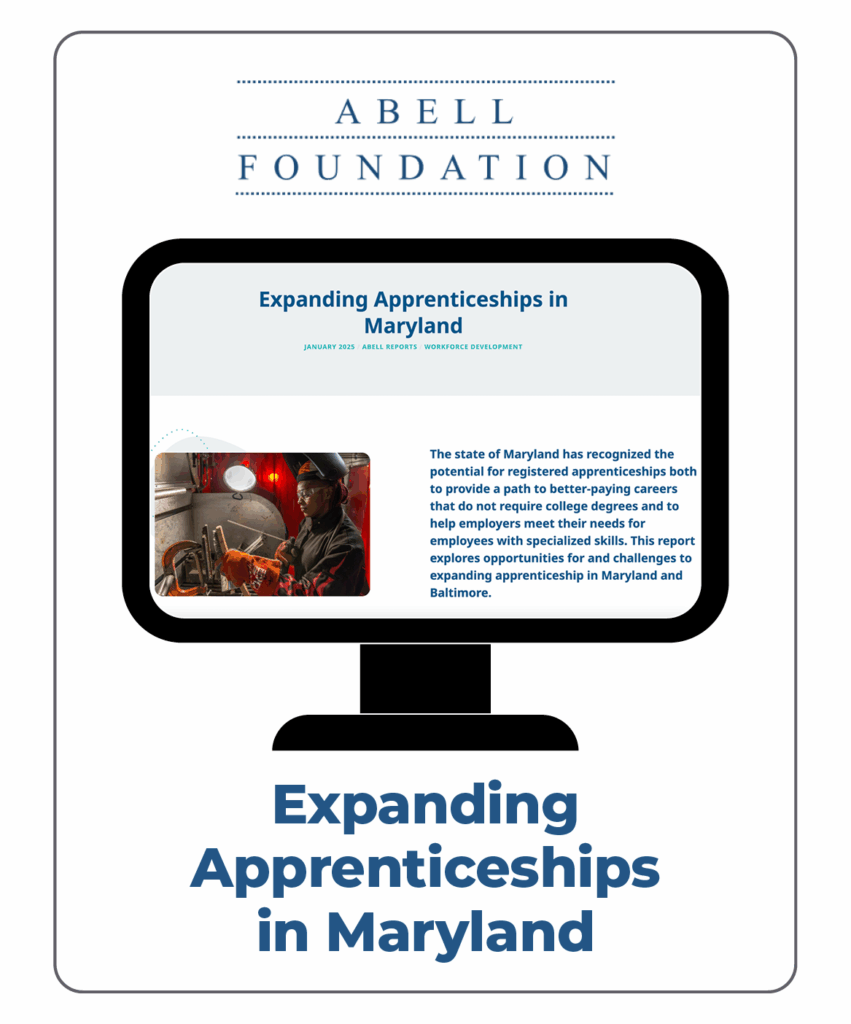
Expanding Apprenticeships in Maryland
The state of Maryland has recognized the potential for registered apprenticeships both to provide a path to better-paying careers that do not require college degrees and to help employers meet their needs for employees with specialized skills. This report explores opportunities for and challenges to expanding apprenticeship in Maryland and Baltimore.
Abell Foundation
January 2025
TOPICS: Apprenticeship , Career Pathways , Community Engagement , Policy and Planning
The report includes topics such as overcoming barriers to participation, such as transportation and childcare; countering employer misconceptions about apprenticeship; supporting apprenticeship in non-traditional sectors; and improving data collection and analysis.
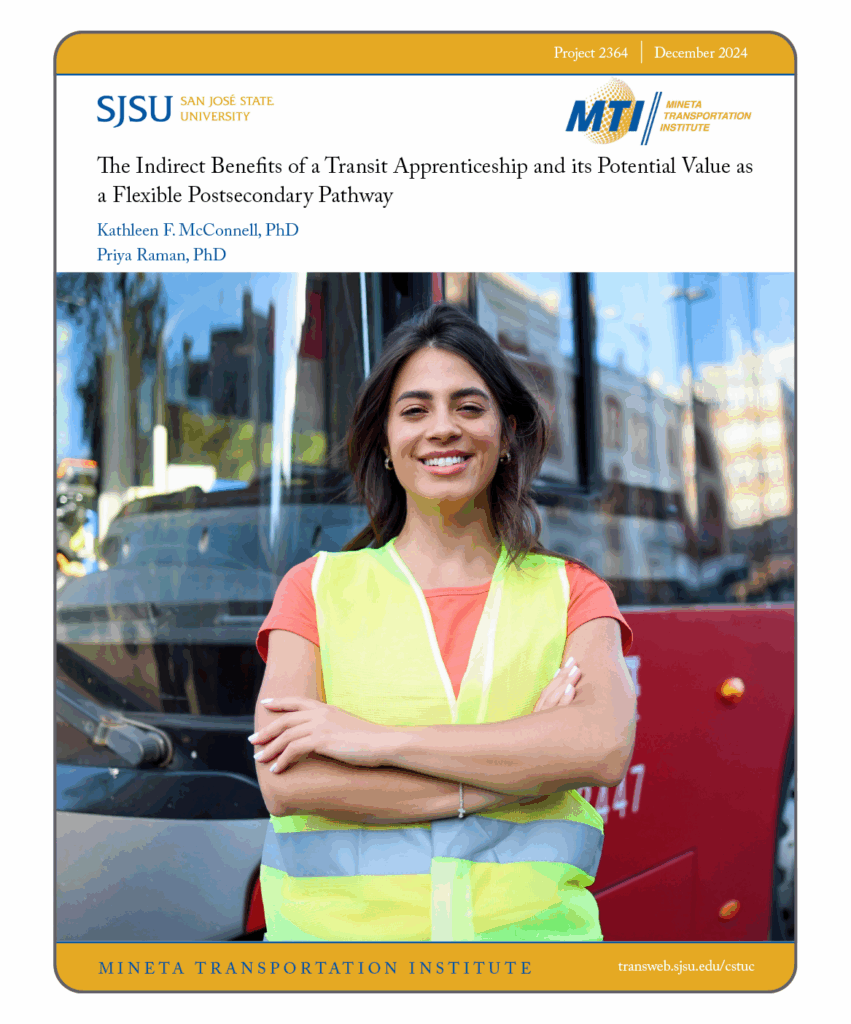
The Indirect Benefits of a Transit Apprenticeship and its Potential Value as a Flexible Postsecondary Pathway
As apprenticeships become more prevalent in the transit industry, they can also emphasize both technical and soft skills to invest in career advancement. This can attract young people to transit careers, which helps address challenges with recruitment and an aging workforce. Santa Clara Valley Transportation Authority’s Joint Workforce Initiative (JWI) employs this model by formally recognizing skills acquisition with accredited certificates. This study explores the JWI’s strengths within the revival of non-degree credentials fueled by efforts like the California Guided Pathways Program. Drawing on guidelines for connecting job training with degree programs, the study details the importance of affordability, portability, and articulation and outlines how these features could be further developed in the JWI.
Mineta Transportation Institute
December 2024
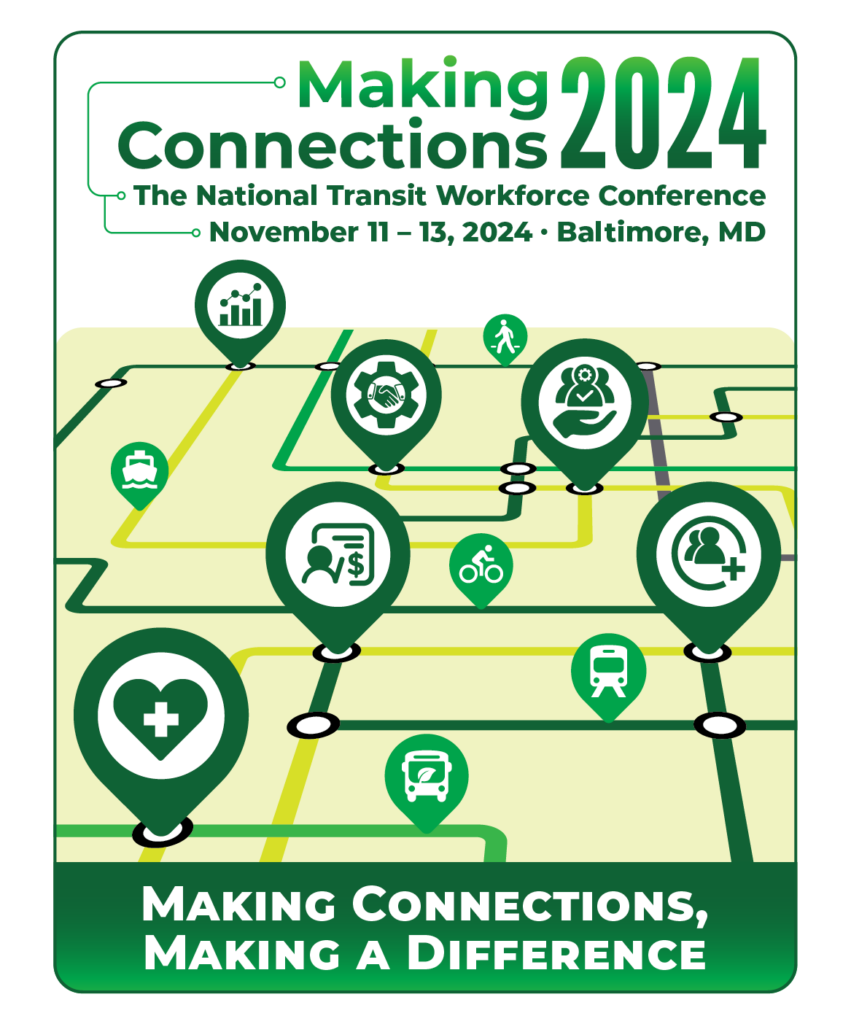
Making Connections 2024 – Workforce Data in Context – National Trends, Future Projections, and Implications for Transit Locations
This session about national and agency-level workforce datasets was presented as part of TWC’s Making Connections 2024 transit workforce conference in November, 2024.
Transit Workforce Center
November 2024
Session Description: Employment in public transportation is affected by broad economic and demographic dynamics, but honing in on transit workforce trends can be challenging. The Transit Workforce Center created the Transit Workforce Data Dashboard to distill relevant data points from national datasets. In this session, TWC highlighted specific employment patterns and challenges in transit-related occupations and panelists covered research and trends in national and agency-level datasets.
Moderator:
- Douglas Nevins: Senior Researcher – International Transportation Learning Center / Transit Workforce Center
Speakers:
- Dr. Asha Weinstein Agrawal: Director of Education – Mineta Transportation Institute
- Kenneth Blacks: Transportation Program Analyst – Federal Transit Administration
- Michaela Boneva: Research Associate – International Transportation Learning Center / Transit Workforce Center
- Dr. Shayna Gleason: Senior Researcher – International Transportation Learning Center / Transit Workforce Center

Making Connections 2024 – What Do Young People Want from a Transit Career?
This session about outreach and retention of youth in transit was presented as part of TWC’s Making Connections 2024 transit workforce conference in November, 2024.
Transit Workforce Center
November 2024
Session Description: As the transit industry works to reach out to the communities it serves to establish strong and effective career pipelines, agencies and their partners often explore how to best attract young people into the industry. In this session, attendees heard from and engaged with young people themselves, along with national and local experts who have conducted research and worked directly with youth. Topics covered include the most effective approaches to connecting with young people and creating awareness and excitement about career opportunities in public transportation.
Moderator:
- Dr. Beverly Scott: Founder and CEO – Introducing Youth to American Infrastructure
Speakers:
- Justin Augustine: Project Manager II – Alameda-Contra Costa Transit District
- Kayla Cooper-Redd: 12th Grade Student – TransSTEM Academy, Cardozo High School (DC)
- Sean Holley: Bus Transportation Instructor – Maryland Transit Administration
- Cheryl Rodgers: Director – TransSTEM Academy, Cardozo Education Academy (DC)
- Edwin Rodriguez: Director – Office of Research Management, Innovation, and Outreach – Federal Transit Administration
- Jamaal Schoby: Transportation Planner – Transportation Research Board

Making Connections 2024 – Successful Models for Career Awareness, Outreach, and Recruitment in Our Varied Communities
This session about national and agency-level workforce datasets was presented as part of TWC’s Making Connections 2024 transit workforce conference in November, 2024.
Transit Workforce Center
November 2024
Session Description: Consistent with FTA’s strategic goal of driving workforce recruitment, this session explored successful models and strategies for increasing awareness of transit careers among potential workers. Presenters also focused on approaches to recruiting and retaining individuals from varied backgrounds, emphasizing engagement with the communities transit serves. Through discussions of hands-on initiatives, mentoring and training programs, and partnerships between transit agencies and community organizations, this session explored various ways transit systems can create sustainable pipelines to attract and retain talent from communities of different sizes and demographics.
Moderator:
- David Stephen: Senior Communications Specialist – International Transportation Learning Center / Transit Workforce Center
Speakers:
- Scott Joiner: Senior Manager, Talent Acquisition – Bi-State Development/Metro Transit (St. Louis)
- Adam Parast: Enterprise and Strategic Initiatives Lead – King County Metro (WA)
- Antonio Pollard: Organizer – Amalgamated Transit Union Local 689 (DC)
- Dan Stoffer: Manager, Bus Instruction – Metro Transit (MN)
- Jaymi Swarbrick: Director of Human Resources – Merrimack Valley Transit (MeVa – MA)
- Trenise Winters: Assistant Executive Director – Bi-State Development/Metro Transit (St. Louis)
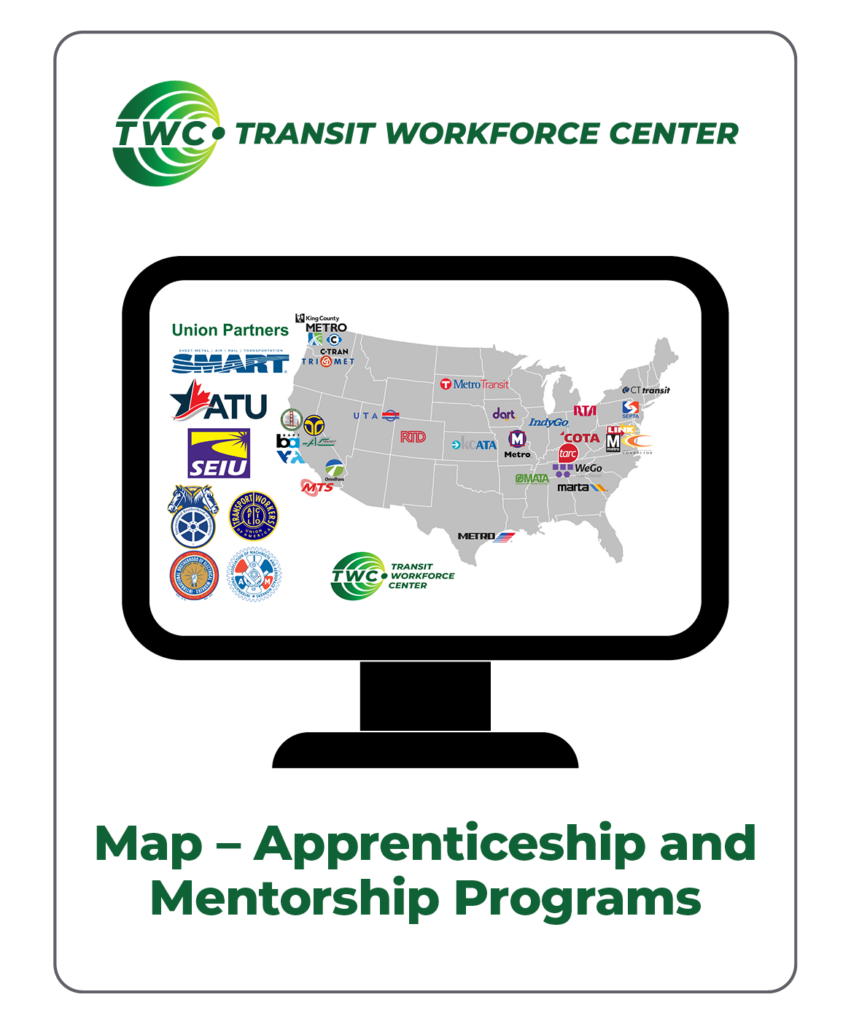
Map – Apprenticeship and Mentorship Programs
Visualizing the Growing Trend of Registered Apprenticeship in U.S. Transit Agencies
Over the past 10 years, the U.S. Department of Labor (DOL) and other federal agencies have invested heavily in promoting and supporting registered apprenticeship, resulting in a significant expansion of registered apprentice programs across the country. Likewise, the use of registered apprenticeship for frontline public transit occupations has increased significantly, with many transit agencies and their corresponding unions jointly adopting labor-management standards that create a framework for apprenticeship. Only five transit agencies had a registered apprenticeship program in 2013, compared with 30 transit agencies in 2023.
This map displays transit locations with registered apprenticeship or mentorship programs. Users can reveal information about the active apprenticeship/mentorship programs at each agency, the agency’s workforce-related statistics (such as wage, employee count, labor hours, and ridership), and links to Standards of Apprenticeship, which include details about qualifications, wages, hours, and training schedules.
Transit Workforce Center
September 2024
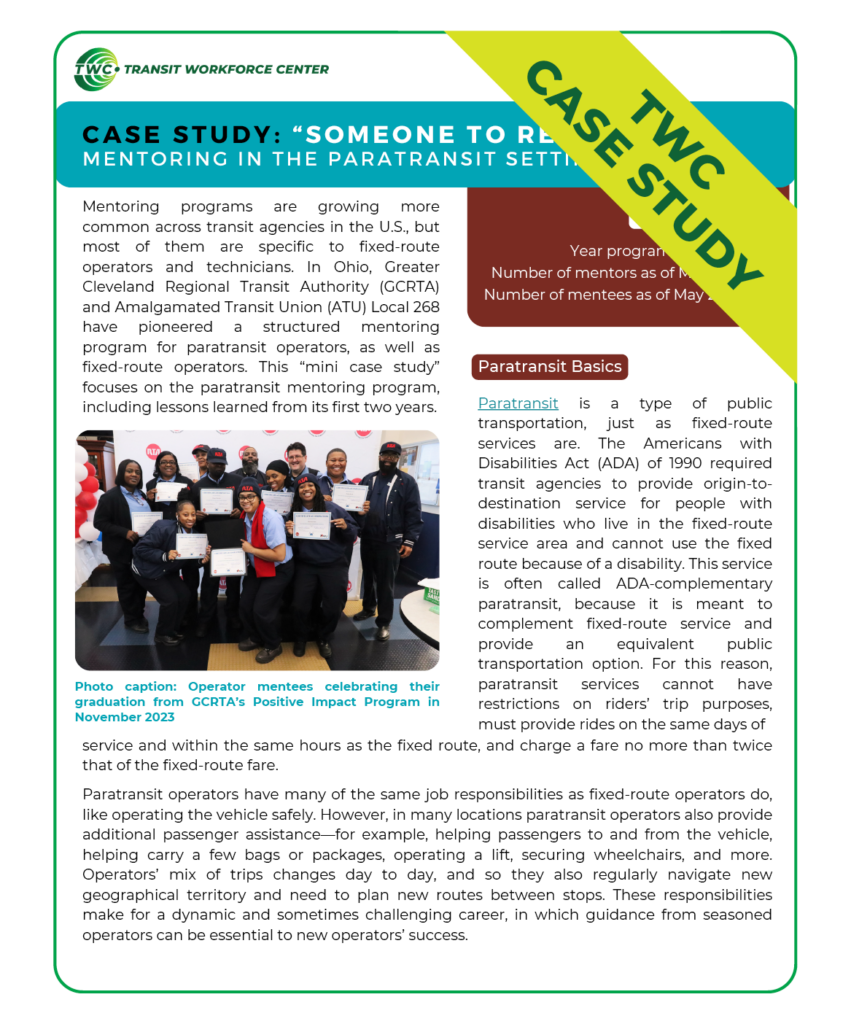
Case Study: Mentoring in the Paratransit Setting
Transit Workforce Center
September 2024
TOPICS: Community Engagement , Mentorship , Trainer and Mentor Development , Training
“Someone to Rely On”
Mentoring programs are growing more common across transit agencies in the U.S., but most of them are specific to fixed-route operators and technicians. In Ohio, Greater Cleveland Regional Transit Authority (GCRTA) and Amalgamated Transit Union (ATU) Local 268 have pioneered a structured mentoring program for paratransit operators, as well as fixed-route operators. This “mini case study” focuses on the paratransit mentoring program, including lessons learned from its first two years.
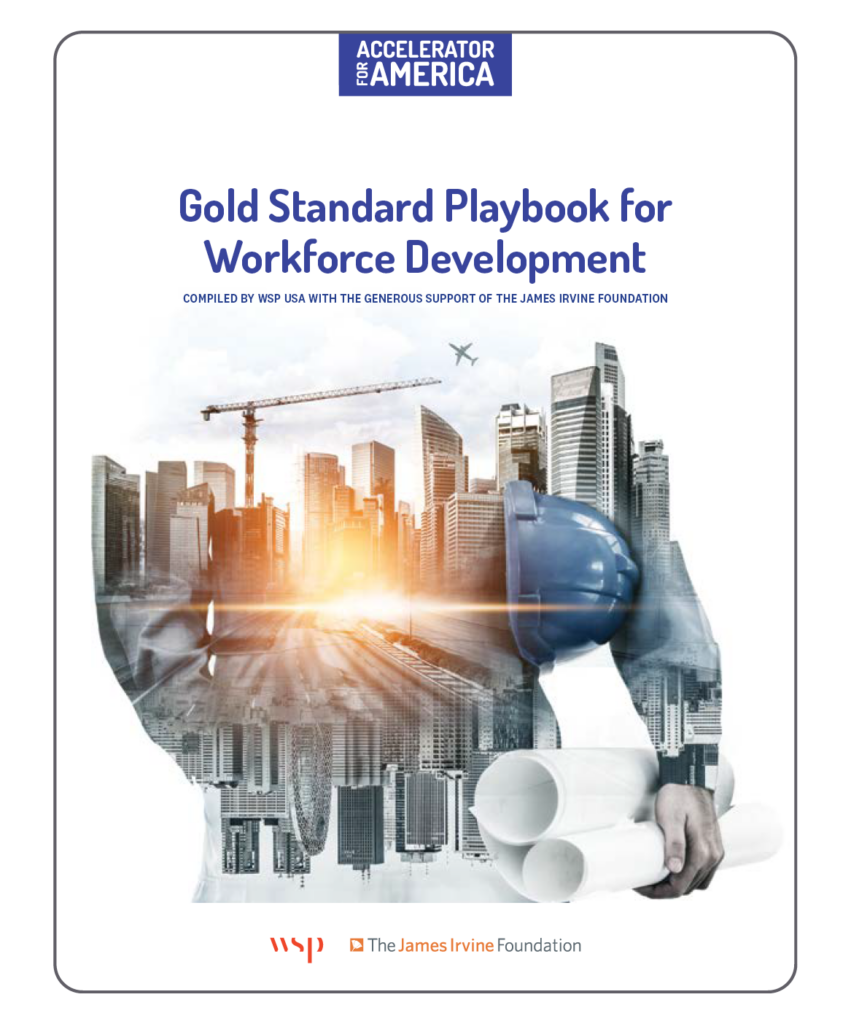
Gold Standard Playbook for Workforce Development
Accelerator for America
August 2024
This Workforce Development Playbook – a menu of malleable strategies and tactics that can be applied in different situational contexts – is meant to serve two purposes:
- To document best practices in workforce development focusing on California but with applicability nationally and sources.
- To set the first “Gold Standard” guiding owners who want to incorporate workforce development goals into their infrastructure projects.
To develop the Playbook, WSP and Accelerator for America (AFA) supported by The James Irvine Foundation, gathered information on current standards, practices, and barriers to workforce development efforts through interviews with key stakeholders across the industry in California, including project owners, community benefit organizations (CBOs), and government leaders.
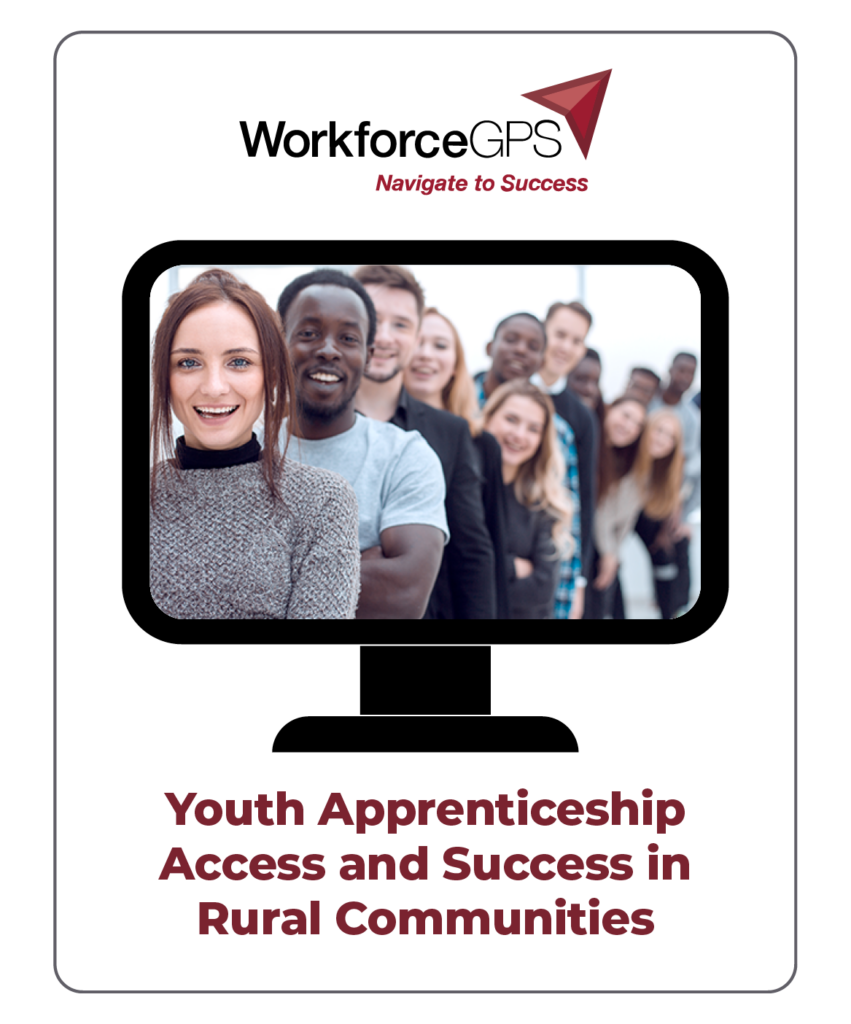
Youth Apprenticeship Access and Success in Rural Communities
WorkforceGPS
August 2024
In rural communities, widely dispersed populations face a multitude of access challenges. Faced with a declining talent pool, lower educational attainment, and rising poverty rates caused by the Covid-19 pandemic, there is an urgent need to prepare young people in rural areas for high-demand careers.
As part of the Implementing Workforce Programs for Rural Youth series, this webinar, hosted by the Office of Apprenticeship, focused on best practices and creative solutions for increasing pre-apprenticeship and youth apprenticeship access, enrollment, retention, and program completion for young people in rural areas. Featured youth apprenticeship intermediaries and partners shared their accomplishments in developing youth apprenticeship opportunities in rural areas, establishing networks of support, and best utilizing available resources to ensure pre-and youth apprenticeship success.
MODERATOR(S)
- Maisha Meminger, Manpower Analyst , Division of Youth Services, U.S. Department of Labor, Employment and Training Administration
PRESENTER(S)
- Vanessa Bennett, Associate Director, Center for Apprenticeship & Work-Based Learning, Jobs for the Future
- Zach Boren Senior Policy Program Manager, Urban Institute
- Bhavani Arabandi, Senior Research Associate, Urban Institute
- Jacqueline Rayfield, Policy Analyst, Urban Institute
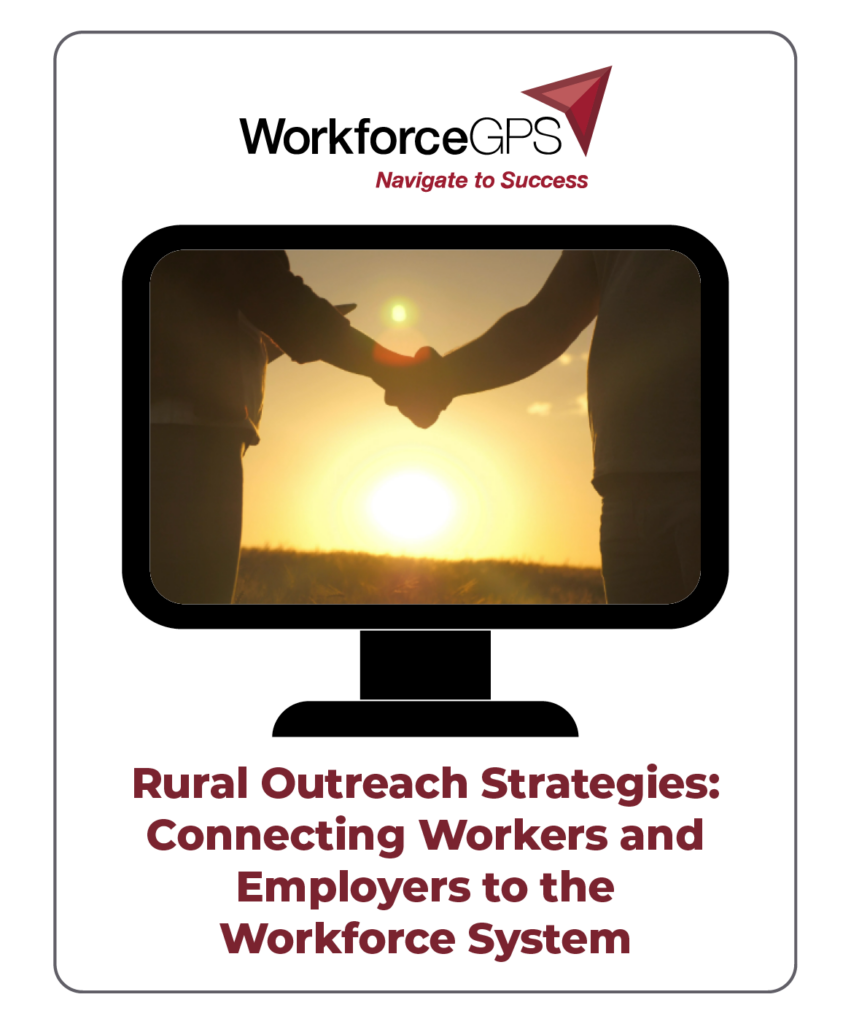
Rural Outreach Strategies: Connecting Workers and Employers to the Workforce System
WorkforceGPS
August 2024
Bringing services to rural workers and employers has long been a challenge in the workforce development system. This webinar features two real-world solutions: the use of mobile units, and the use of virtual job fairs.
Hear from South Carolina and Massachusetts about their successful implementation of their unique strategies.
MODERATOR(S)
- Tim Theberge, Division Director, Office of Trade Adjustment Assistance
PRESENTER(S)
- Adam Wagoner, Deputy Director, South Carolina Department of Employment and Workforce
- Chris Mills, Program Coordinator, MassHire Department of Career Services
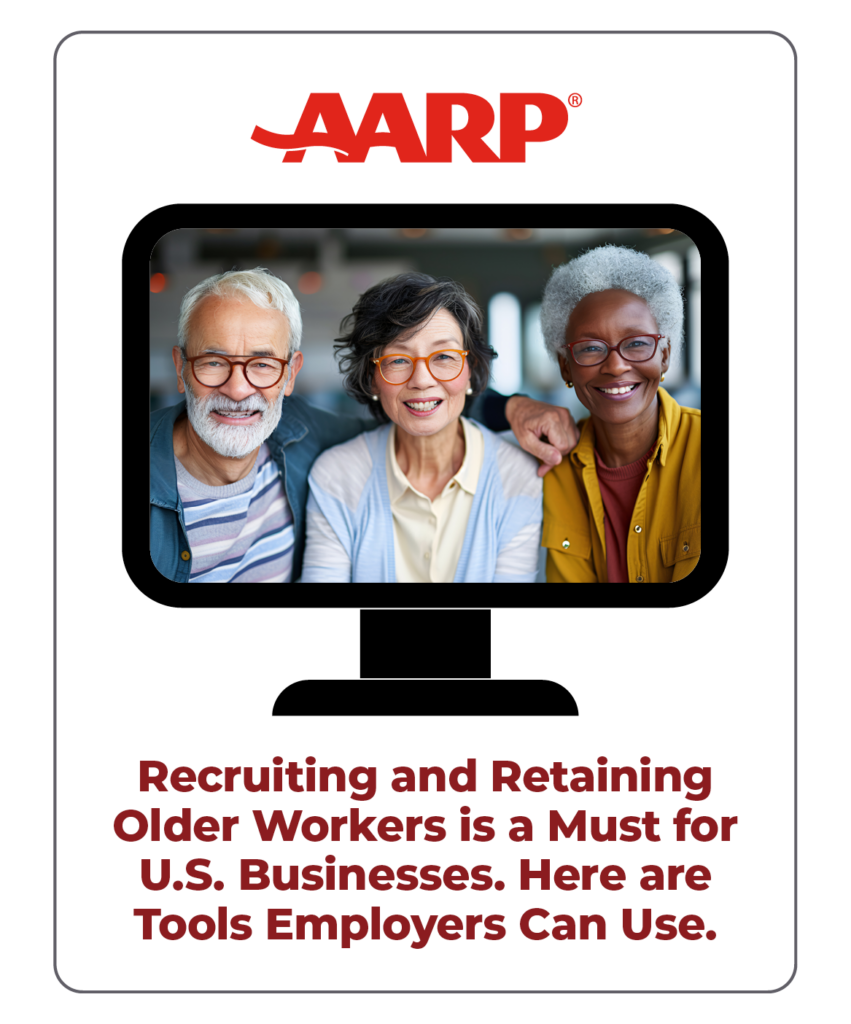
Recruiting and Retaining Older Workers is a Must for U.S. Businesses. Here are Tools Employers Can Use.
AARP
July 2024
Shifting demographics in the U.S. workforce indicate that businesses are probably going to need to recruit, train, and retain older workers to ensure their companies remain competitive. However, workplace surveys indicate that most firms are currently not prepared to find and welcome workers who are 50 years of age or older.
Fortunately, a broad array of evidence-based hiring and talent development strategies are at the ready for U.S. employers. These strategies draw from a recent and comprehensive review of employer practices and their influence on economic security and mobility for U.S. workers.
Three key connected takeaways for employers to consider as they plan for ways to leverage this segment of the workforce are as follows:
• Engage directly with older employees in developing their digital skills.
• Seek out the social networks in which older workers operate to find the best recruiting matches.
• Lean into current or former employees and their online connections to identify these social networks.
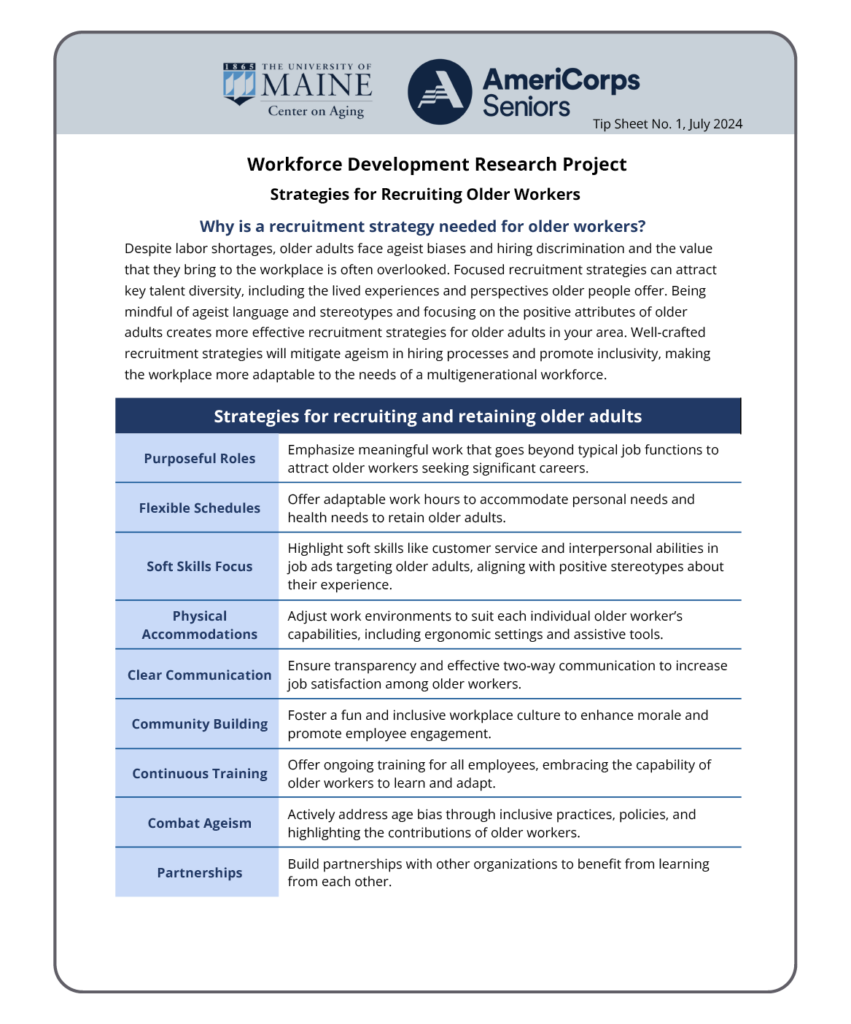
5 Tip Sheets for Working with Older Adults
UMaine Center on Aging & AmeriCorps Seniors
July 2024
TOPICS: Community Engagement , Retention , Workforce Shortage
Given current workforce shortages, reaching out and engaging older workers is of interest to many employers. The AmeriCorps Seniors research team developed five older adult workforce program tip sheets on topics relevant to interacting with older adults in the workforce. You can view the tip sheets on the project website, which are linked here:
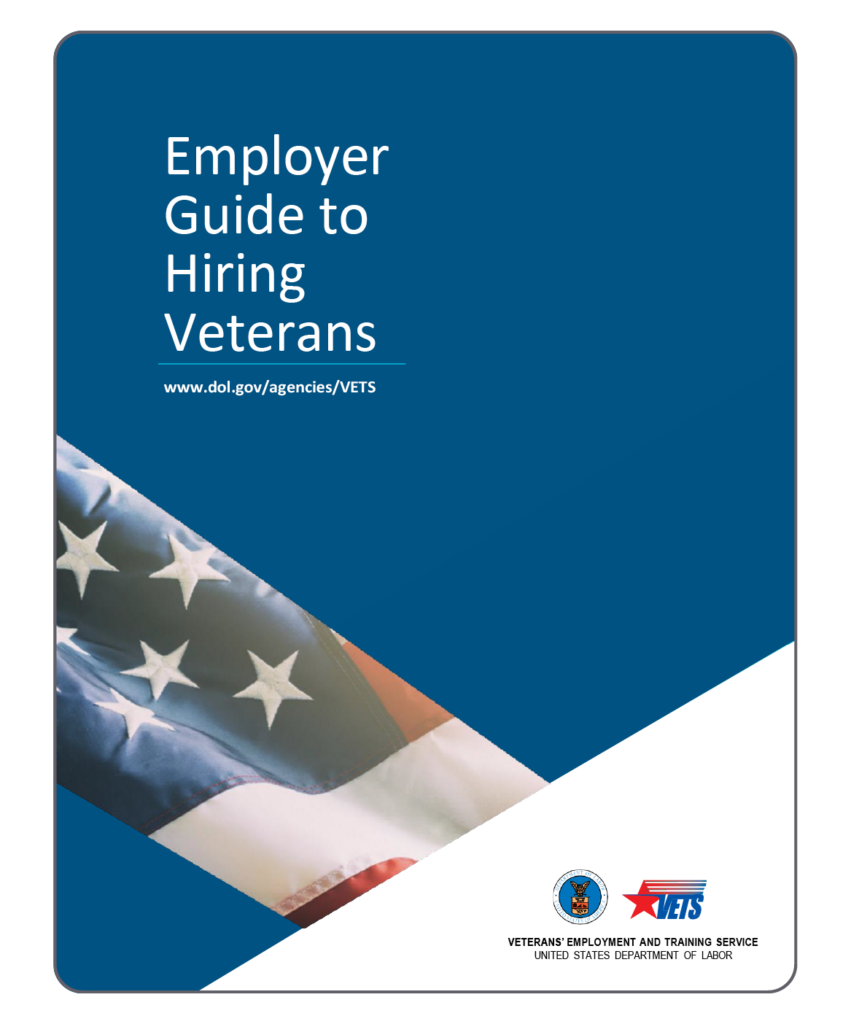
Employer Guide to Hiring Veterans
Employers recognize the value veterans bring to the workplace but often find it challenging to connect with separating service members and veterans seeking employment. Veterans are in high demand, so it requires dedicated efforts by employers to find and hire veterans.
This guide intends to:
• Provide accurate information about service member and veteran demographics.
• Share federal, state, and other resources with employers to facilitate veteran employment; and
• Make recommendations on how to attract, train, and retain veterans.
United States Department of Labor
TOPICS: Community Engagement , Hiring and Recruitment , Retention
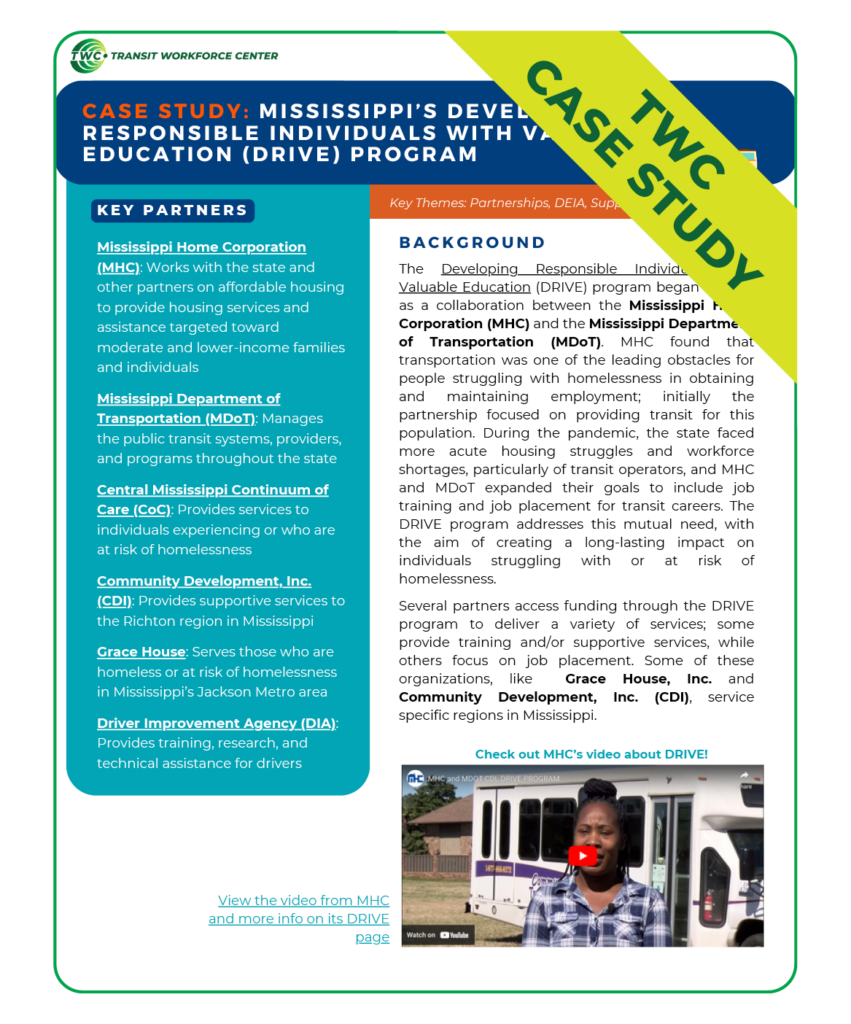
Mississippi’s Developing Responsible Individuals with Valuable Education (DRIVE) Program
This TWC case study is about the Mississippi Developing Responsible Individuals with Valuable Education (DRIVE) Program, which uses Emergency Solutions Grants (ESG) from the U.S. Department of Housing and Urban Development, distributed by the Mississippi Home Corporation (MHC), to partners such as Grace House, Inc. and Community Development, Inc. (CDI). These partners use the funding in a variety of creative ways to provide housing and other supportive services to DRIVE participants while they complete training and certification for a commercial driver’s license (CDL). Partners also provide job assistance to participants, placing them and helping them succeed in local transit jobs. Learn more about the program, services offered, and how stakeholders leverage funding in the full case study.
Transit Workforce Center
May 2024
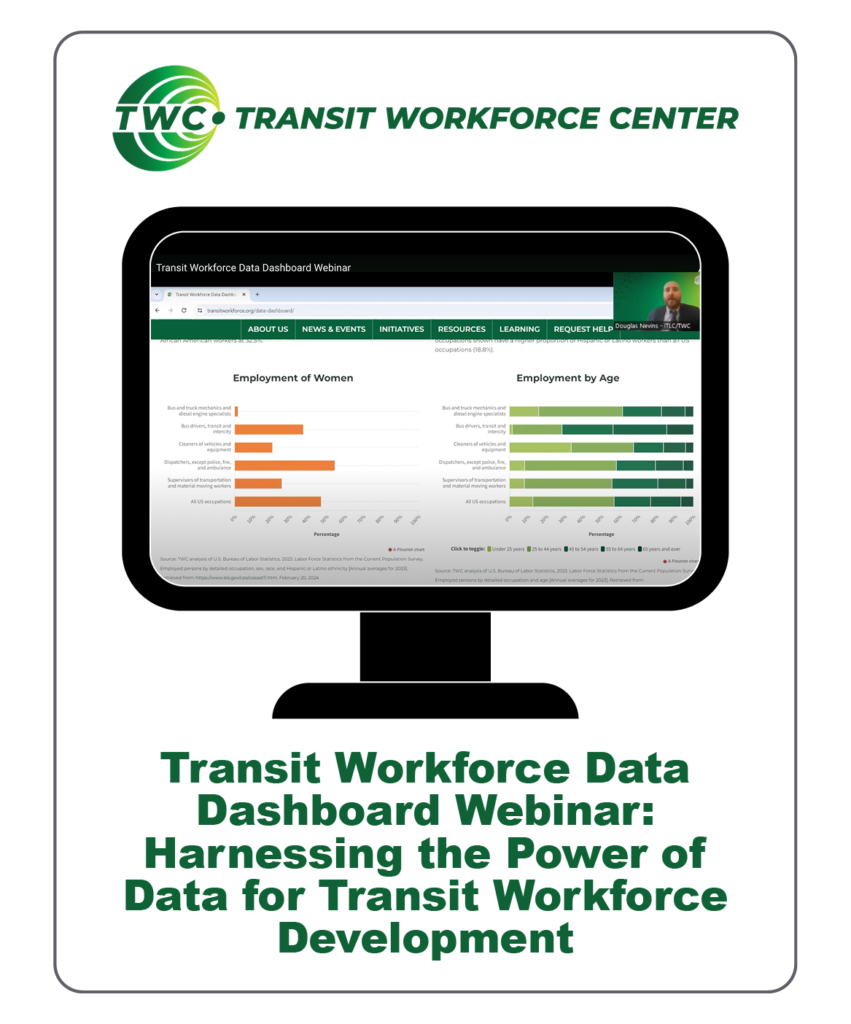
Transit Workforce Data Dashboard Webinar: Harnessing the Power of Data for Transit Workforce Development
TWC hosted a webinar titled “Transit Workforce Data Dashboard Webinar: Harnessing the Power of Data for Transit Workforce Development” on February 28, 2024. The Dashboard features innovative visualizations of transit and transportation workforce statistics and demographics from the National Transit Database (NTD) and Bureau of Labor Statistics (BLS). It can be used to highlight key issues, like the high proportion of transit workers nearing retirement age, the potential for greater participation in key transportation occupations, and the need to hire extensively in the coming decade. A new interactive page launched in February, allowing users to filter NTD employment data by agency.
TWC demonstrated the full dashboard, discussed lessons learned from working with NTD and BLS data, and opened up a Q&A for participants to ask questions or share their unique data needs.
Transit Workforce Center
February 2024
At the end of the webinar, TWC shared a survey to collect unique transit workforce data needs and feedback for potential additions to the Data Dashboard. The survey continues to accept responses and can be found below.
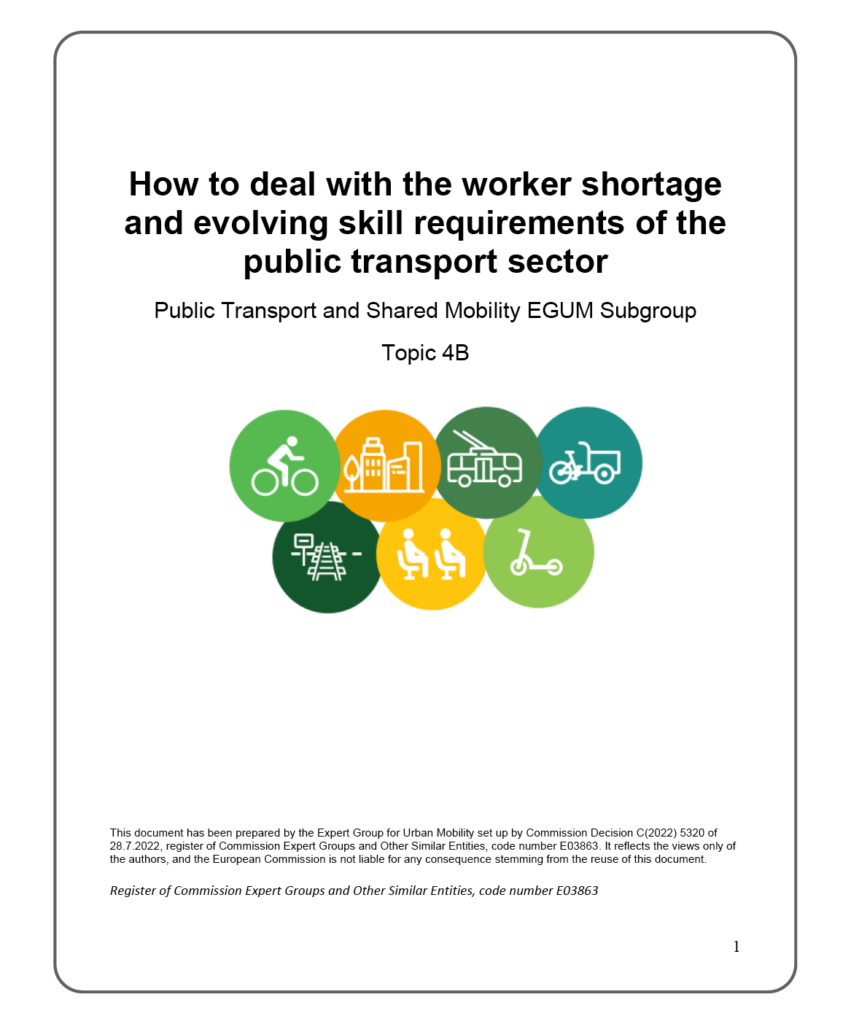
How to Deal with the Worker Shortage and Evolving Skill Requirements of the Public Transport Sector
This report provides a European counterpart to those produced within the United States on the transit workforce shortage. It gives an overview of the workforce shortage’s causes, as well as recommendations for addressing evolving skill requirements and more.
Expert Group on Urban Mobility, European Commission
February 2024
TOPICS: Community Engagement , Hiring and Recruitment , Training , Workforce Shortage
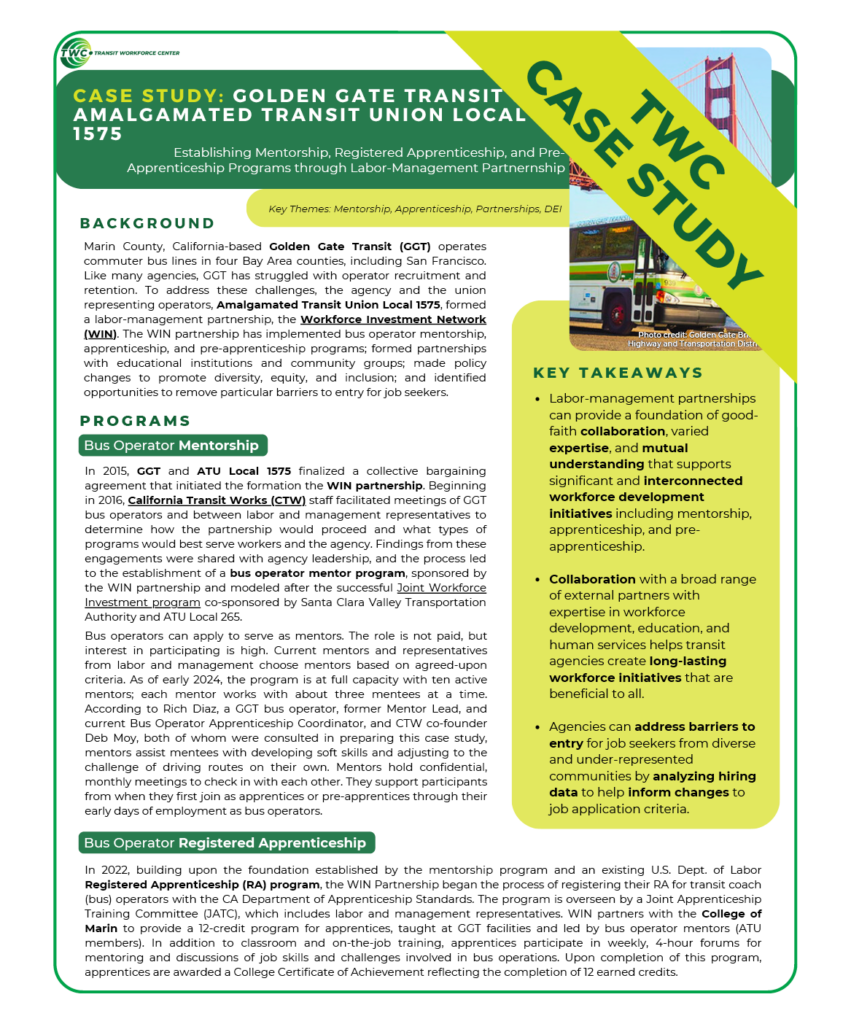
Case Study: Golden Gate Transit & Amalgamated Transit Union Local 1575
Marin County, California-based Golden Gate Transit (GGT) operates commuter bus lines in four Bay Area counties, including San Francisco. Like many agencies, GGT has struggled with operator recruitment and retention. To address these challenges, the agency and the union representing operators, Amalgamated Transit Union Local 1575, formed a labor-management partnership, the Workforce Investment Network (WIN). The WIN partnership has implemented bus operator mentorship, apprenticeship, and pre-apprenticeship programs; formed partnerships with educational institutions and community groups; and identified opportunities to remove particular barriers to entry for job seekers.
Transit Workforce Center
February 2024
Read Rich Diaz’s Transit Career Story on the TWC Blog to learn more.
View the full case study below:
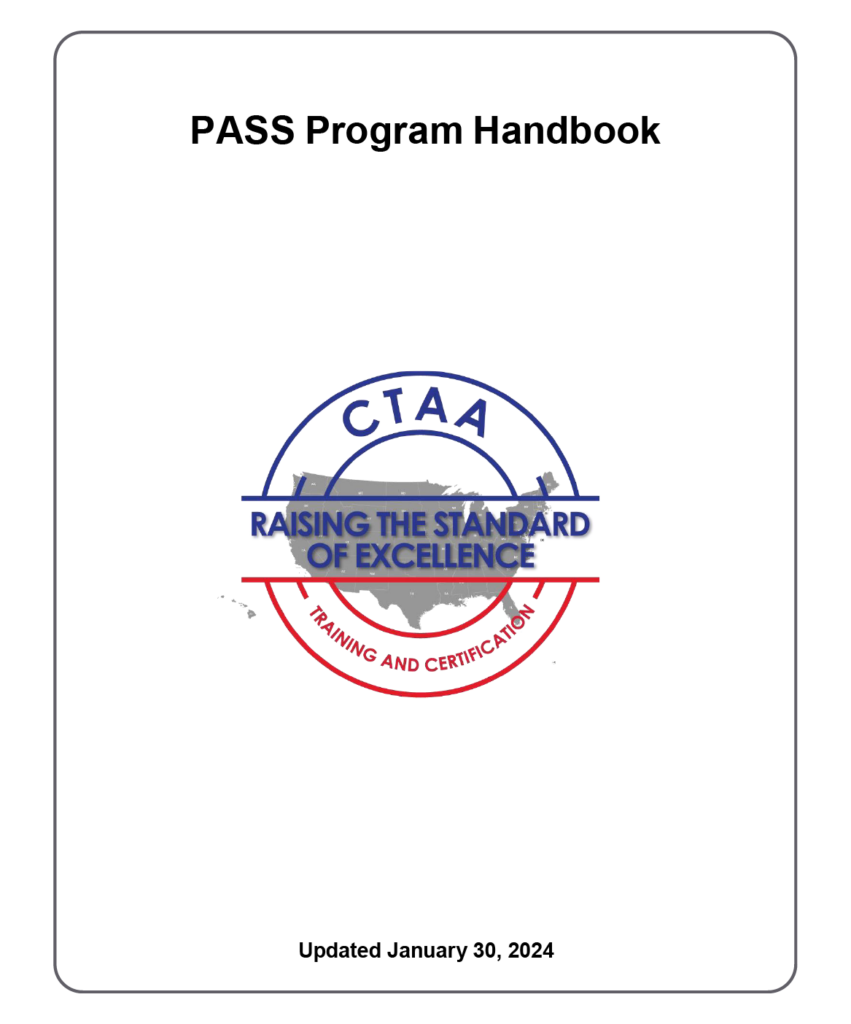
Passenger Assistance, Safety And Sensitivity (PASS) Program Handbook
CTAA’s Passenger Assistance, Safety and Sensitivity (PASS) driver training program provides resources and standards for operators to transport passengers in the most safe, sensitive and careful manner possible. PASS is ideal for non-emergency medical transportation (NEMT) trips, for ADA paratransit services, for specialized transit for older passengers, for human and social service riders — really any transportation operation where the passengers require extra care.
Community Transportation Association of America
January 2024
TOPICS: Community Engagement , Safety and Health , Training
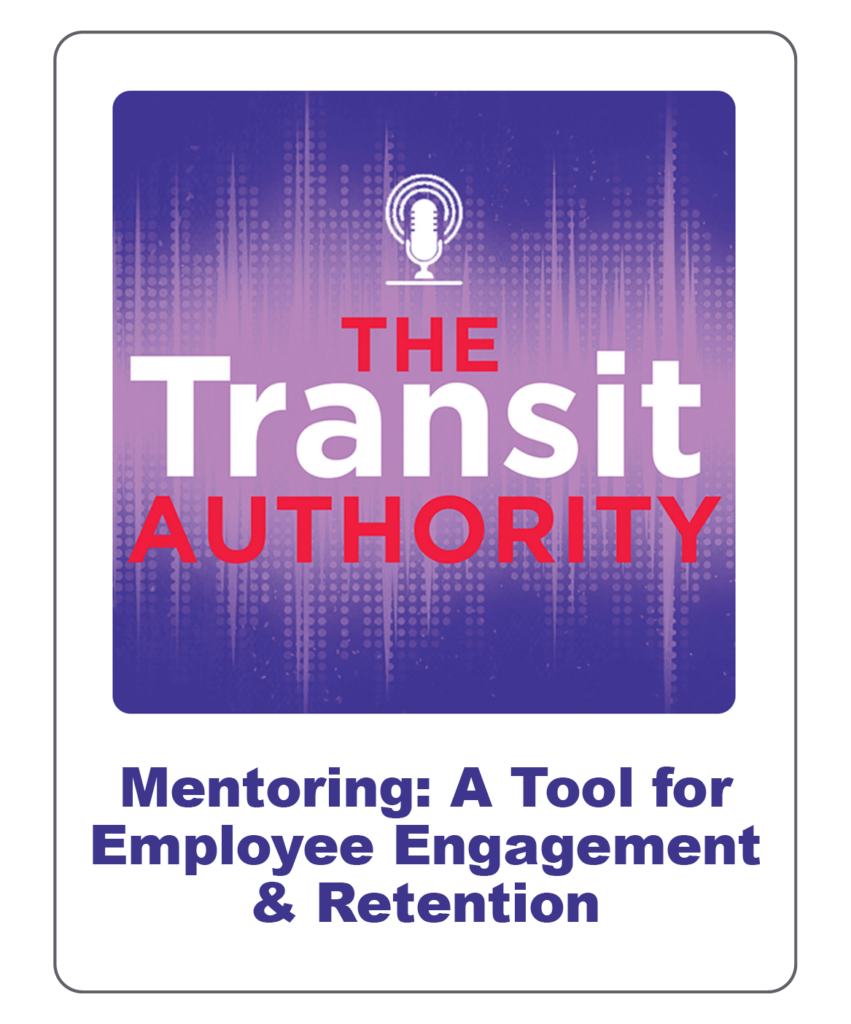
Mentoring: A Tool for Employee Engagement & Retention
APTA’s podcast, The Transit Authority, presents a two-part series on mentoring. The Santa Clara Valley Transportation Authority (VTA) and Greater Cleveland Regional Transit Authority (GCRTA) will discuss their partnerships with ATU to build and manage successful mentoring programs and how mentoring is a critical tool for knowledge transfer and positive work culture.
American Public Transportation Association
January 2024
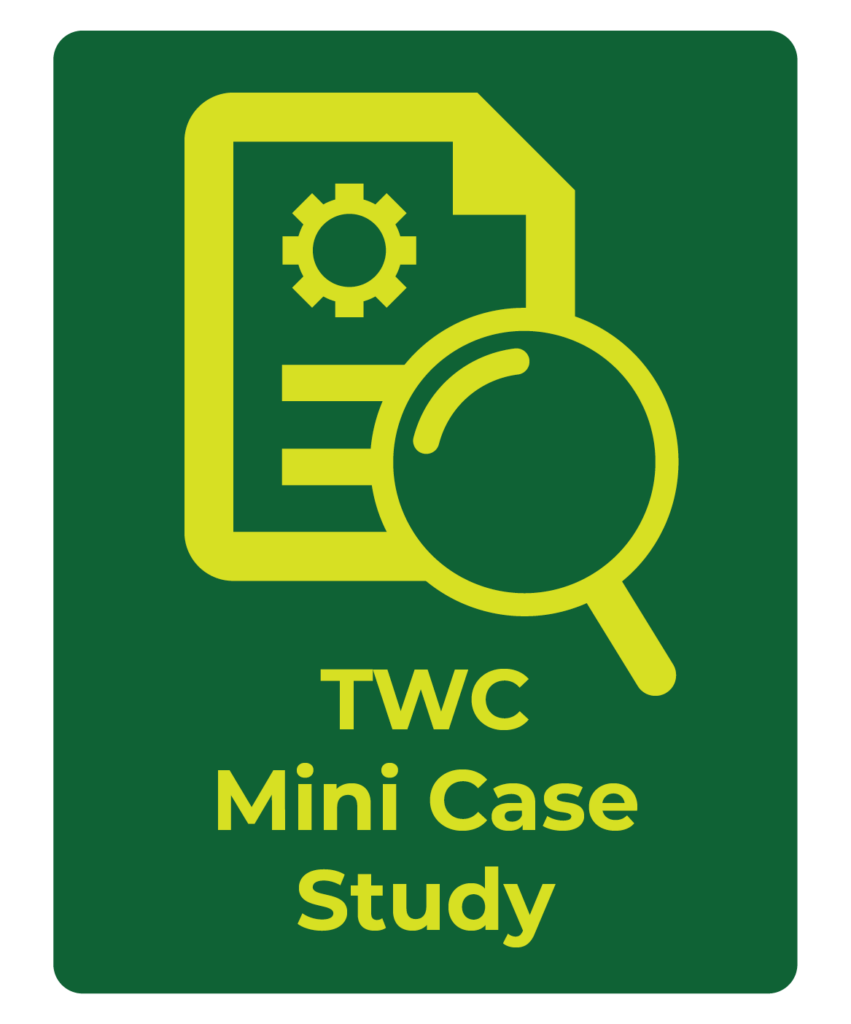
Approaches to Childcare Support in the Transit Industry: Prairie Hills Transit
Across the nation, the lack of access to affordable and accessible childcare is often a major employment barrier for workers in the transit industry. TWC hosted a pivotal discussion on this issue in the webinar, “Approaches to Childcare Support in the Transit Industry”.
Check out the presentation from Barb Cline, Executive Director of Prairie Hills Transit (Spearfish, South Dakota) who shares her approach to creating childcare solutions tailored for her transit employees. She will delve into the inception of the Prairie Hills program, their ongoing hurdles, and the successes that have marked their journey.
Transit Workforce Center
November 2023
TOPICS: Community Engagement , Policy and Planning , Retention , Workforce Shortage
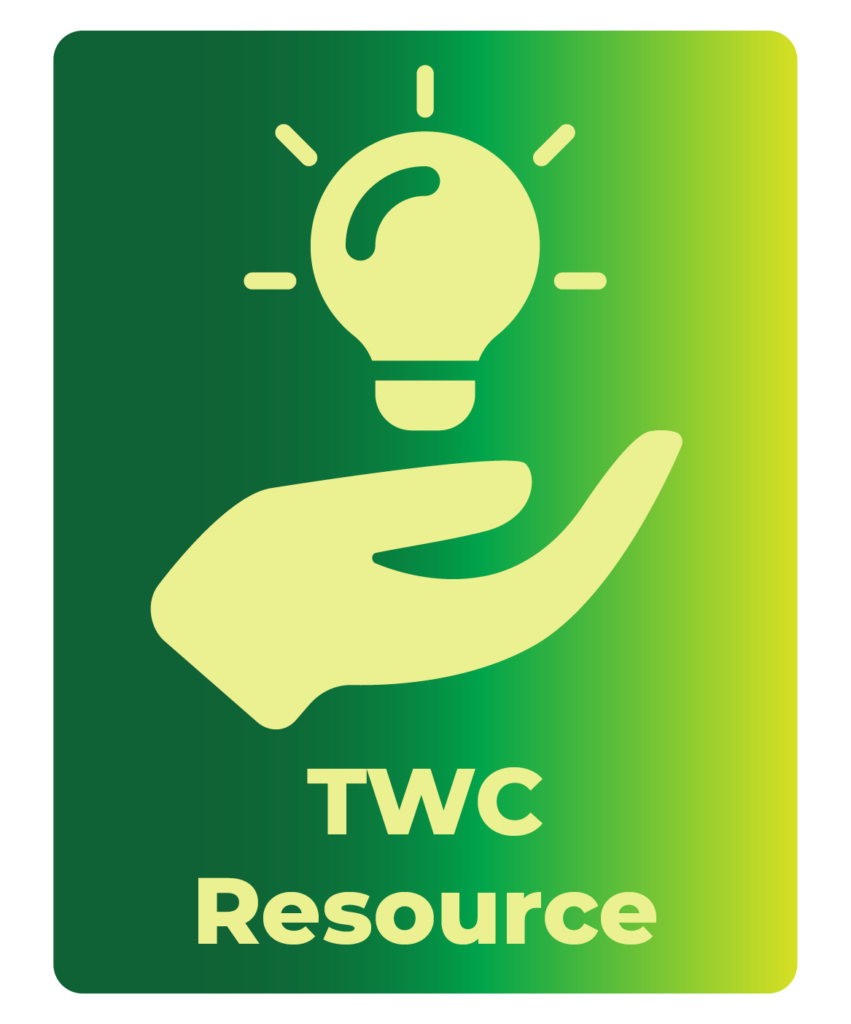
Critical Conversations: The Public Transport Frontline Worker Crisis
Public transportation agencies across the country are facing challenges in attracting, recruiting, and retaining frontline employees. Critical Conversations provides insights from youth on transit’s frontline workforce crisis – bus and train operators, and entry-level mechanics. Researchers conducted a national survey targeting respondents under the age of 30, compiled agency-specific human resources information, and held focus groups asking participants to share their experiences and insights about challenges, lessons learned, and opportunities regarding the workforce crisis.
introducing youth to American infrastructure
November 2023
Contributors: Dr. Jamaal Schoby, Dr. Beverly Scott
The Barr Foundation provided support for the research element of this important youth empowerment and “people-readiness” initiative.
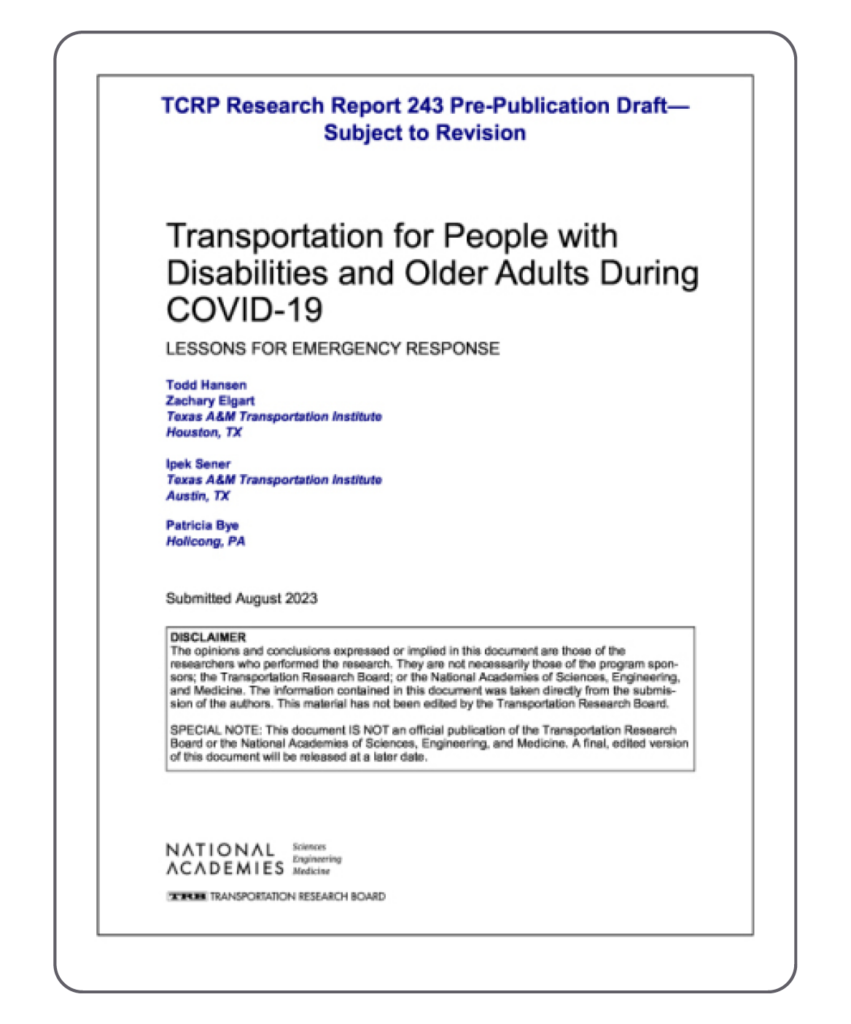
Transportation for People with Disabilities and Older Adults During COVID-19: Lessons for Emergency Response
This pre-publication report aims to provide transportation organizations (including transit agencies, specialized transportation providers, and other local government agencies and stakeholders) with helpful information and strategies on providing service for persons with disabilities and older adults in emergency situations.
Transportation Cooperative Research Program
October 2023
TOPICS: Community Engagement , Policy and Planning , Safety and Health
Contributor(s): National Academies of Sciences, Engineering, and Medicine; Transportation Research Board; Transit Cooperative Research Program; Todd Hansen; Zachary Elgart; Ipek Sener; Patricia Bye
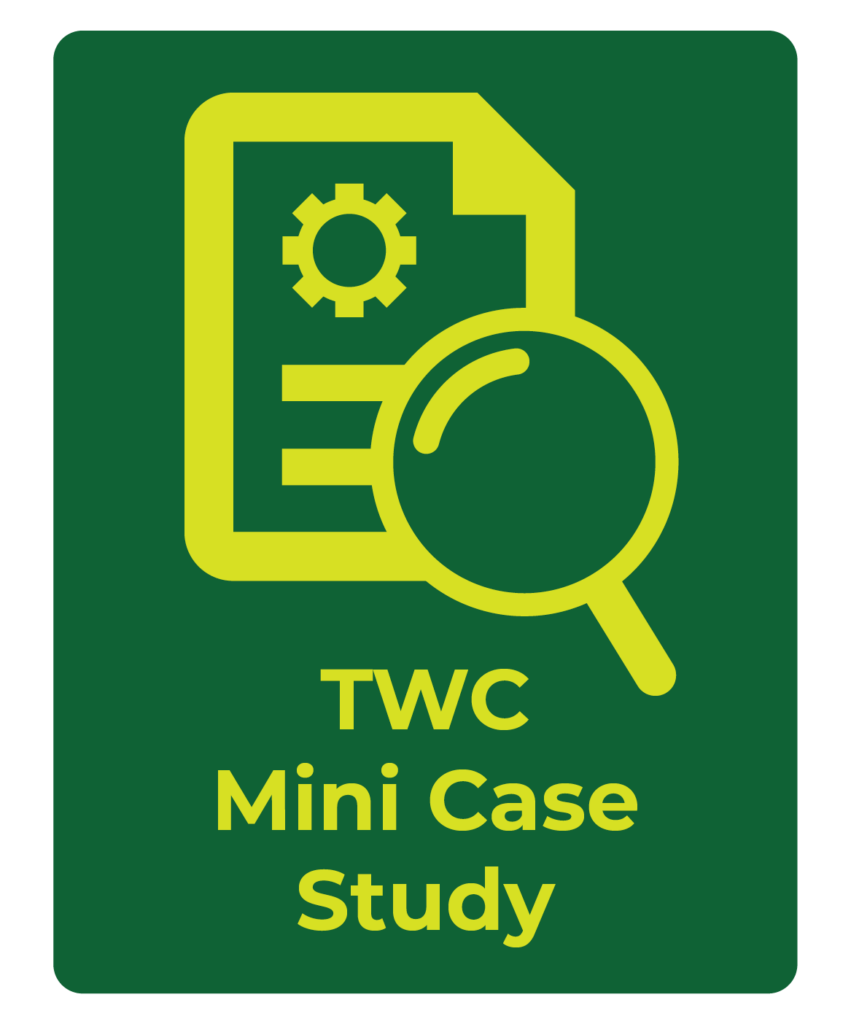
Approaches to Childcare Support in the Transit Industry
Transit Workforce Center
September 2023
- There are many ways to support the childcare needs of employees; there is no one-size-fits-all model.
- The models examined in this case study include a voucher system, an on-site center managed directly by the agency, and a discounted center managed by a contractor with supplemental referral services.
- Challenges remain, including childcare affordability and availability.
- Still, these programs can boost morale and attendance among working parents and caregivers.
At New York City’s Metropolitan Transit Authority (MTA), the first sign of a problem was attendance. Los Angeles Metro experienced a similar phenomenon of worker absences, which grew worse during the COVID-19 pandemic. At Prairie Hills Transit in South Dakota, the agency (like many employers in the community) struggled just to get workers in the first place. In community after community, public transit is suffering from low employee availability, and a key driver of the workforce shortage is clear—a lack of affordable childcare.
The good news for the public transit industry is that a variety of models already exist that support the childcare needs of frontline workers. This case study describes three such models: a voucher system, an on-site center managed directly by the agency, and a discounted center managed by a contractor with supplemental referral services. Across the spectrum of agency sizes—from a small rural agency to an agency serving one of the world’s largest cities—transit providers have opportunities to support their workers, both as employees and as parents.
Please see the summary table at the end of the case study for an overview of each of these programs.
Background: The Urgency of Childcare Needs
The United States used to have one of the highest rates of working women among Organization for Economic Cooperation and Development (OECD) countries, but in recent years, the U.S. rate has declined. As parents struggle to find stable access to childcare, they are forced to limit their workforce participation, leave employment altogether, or pay an often-unsustainable portion of their income towards a childcare program. Using data from the National Survey of Children’s Health, the Center for American Progress (CAP) estimated that in 2016 nearly two million Americans made career sacrifices due to issues with childcare.
As the United States, and in particular the transit industry, faces a difficult and ongoing labor shortage, it is important for mothers to be able to participate in the workforce if they choose. Even though women are less present in the labor force, families are becoming increasingly dependent on the maternal income. Only about 30 percent of families with children rely solely on a father’s income; women are primary or equal earners in about two-thirds of families. Women of color with children are even more likely than white women to be in the labor force, be primary breadwinners, and be in low-earning jobs (NWLC).
Despite this necessity, childcare remains a determining obstacle. An analysis of the 2016 Early Childhood Program Participation Survey (ECPP) indicated that half of American families struggle to find adequate childcare, with cost most commonly reported as a barrier. Another CAP analysis found that over half of Americans live in childcare deserts (areas with few or no options for childcare). The maternal workforce participation rate is an average of three percent lower in these deserts than in areas with adequate childcare. Hispanic/Latino families are more likely to reside in childcare deserts and more likely to report location as an obstacle to obtaining childcare. The prevalence of location as an obstacle can be further explored with these interactive childcare desert maps.
Even small steps to alleviate childcare burdens can help parents join the workforce. A study of Washington, DC’s universal, full-day preschool program found that since the program’s inception, the rate of mothers participating in the city’s workforce increased by 12 percent. Subsidies to support parents in finding childcare assistance can have positive impacts on their workforce participation as well. A study of childcare and parent labor force participation found that just a 10 percent decrease in childcare costs could lead to a 0.5-2.5 percent increase in maternal employment. A paper from the National Bureau of Economic Research indicated that if childcare costs were capped at seven percent of income, the rate of low-income mothers in full-time jobs would increase by 18 percent and the overall maternal employment would increase by 10 percent, which would add 12 million mothers to the workforce. For individual families and the overall economy, these increases are important, and they are essential to mitigating the workforce shortage in the transit industry.
Childcare Examples in Public Transportation
Transport Workers Union (TWU) Local 100 – New York City Transit Child Care Fund (CCF)
In New York City, TWU Local 100 and NYC Transit came together to create the Child Care Fund (CCF), a financial assistance program designed to support the families of Local 100 members who need help paying for childcare expenses. In 2002, Local 100 proposed a new benefit for its members in the collective bargaining agreement: funds through CCF to support parents of young children in obtaining childcare. MTA management, concerned about the effects of worker absences on its operations, agreed to the new benefit. “Workers were doing the calculus of whether it’s worth it to spend X amount on childcare versus just staying home and not working and caring for the child instead. Childcare is very expensive,” said Charles Jenkins, Director of TUF. This no-win choice weighed particularly heavy on women. Jenkins recounted how historically, transit has been a predominantly male industry with few accommodations for women, even proper bathrooms, until recently. Long-standing worker shortages in public transit have led the industry to begin thinking differently.
CCF provides financial support to parents for either a year-round childcare program or for summer camps; the employee can choose. The employee also has the discretion to choose who cares for their child—CCF covers about forty percent of the cost of childcare in a licensed facility (up to $320 weekly), and about twenty percent (up to $160 weekly) if the provider is not licensed—for example, if the caregiver is a family member. If the employee chooses the summer camp option, fifty percent is covered (up to $1,000). The benefit is offered to all employees in good standing who have completed one year of employment, until the employee’s child reaches age 12.
The program is not without challenges. It is first-come-first-served, with limited funds, although most people who seek out the benefit do receive it. Some members report they didn’t know about the fund, and even with a subsidy, childcare remains expensive. Still, CCF’s support helps. “Our members are very thankful for the benefit,” Jenkins said, and the agency and union have found that attendance is high when adequate childcare is in place.
Prairie Hills Transit (Spearfish, South Dakota)
Over a thousand miles away and in a much more rural area, the childcare landscape looks different. Prairie Hills, SD, has struggled for years with a lack of childcare providers in the community. Around 2010, Prairie Hills Transit (PHT) Executive Director Barb Cline noticed that federal funds were available for the construction of new buildings. Thinking creatively, she pursued grants and loans from the U.S. Department of Agriculture for the purpose of constructing a childcare facility within the PHT campus. “We knew this was a community problem, bigger than our own staff,” Cline reported. With only about 50 employees, PHT’s staff didn’t have enough children for a center limited to employees, so the agency opened its doors to the wider community.
Today, this licensed, on-site childcare center can accommodate up to 41 children. To handle demand, PHT is expanding to a new rented location which can enroll another 25 or so children. Because childcare has a low profit margin, no external company would take on the contract, so PHT hired its own manager for the program. Now that the building has been constructed, the program sustains itself financially. Employees of PHT receive a thirty percent discount, while other parents in the community pay full price (though some use government benefits to pay and segmented payment plans are available). Children don’t age out formally, but most enrollees are age five or younger. PHT has found that male and female employees alike take advantage of the program. Recognizing that employees won’t be able to transport their children from school to after-school childcare in the middle of a shift, PHT obtained a separate bus with car seats to provide those trips themselves.
PHT reported several challenges it encountered as the program unfolded. Licensing requirements for childcare centers have gotten stricter and PHT has had to invest time to adapt. Another challenge for the agency has been the “human versus the financial”: if a parent only wants part-time childcare, the center wants to accommodate the family’s needs, but the accommodation results in the loss of a full-time spot and thus a loss of funds. Availability of childcare remains a challenge because demand is so high, even though PHT employees receive some degree of priority; “our waiting list is 12 pages long,” Cline said. Even with a subsidy, affordability is still a question for some families. However, employee turnover is low at PHT and childcare may be part of the reason.
PHT has realized that because of the geographic dispersion of employees and the low turnover of children in the center, some employees are not able to take advantage of the center’s offerings. As the program looks to the future, PHT is looking to build a second shared-use facility to expand capacity.
LA Metro (Los Angeles, CA)
Like so many other transit agencies, Los Angeles Metro found its workforce depleted as the COVID-19 pandemic progressed. The agency recognized that a lack of childcare delayed re-entry into the workforce.
LA Metro offers three options for their employees to find support The first is, through a memorandum of understanding, a partnership with Pathways LA to provide referral services to LA Metro employees seeking childcare. Pathways LA gives parents digestible information about childcare options and assistance navigating the possibilities available. LA Metro also utilizes its employee assistance program through ComPsych Corporation Guidance Resources, which connects employees to a Work-Life Specialist. This specialist provides personalized resources custom to the needs of the individual employees seeking childcare in their area. The third support is more recently established: LA Metro has leased a space it owns, beginning June 2023, to Pathways LA for a childcare center within walking distance from Metro’s central maintenance facility and headquarters. This arrangement was established through a competitive bid process. The center is not exclusive to LA Metro employees, but employees receive a 15% discount and get priority enrollment. The center serves children up to age 5 and offers everything from an infant center to an educational curriculum for older children to special needs programming. LA Metro has hired a coordinator to oversee the relationship between Pathways LA and Metro, which has been indispensable to facilitating a smooth partnership, the agency reported.
As childcare needs have evolved, LA Metro has persevered in seeking the best options for its employees within available resources. Before the Pathways LA partnership, LA Metro had partnered with a different third-party provider; with the new partnership, largely because of inflation, prices have risen and employees that transferred from one provider to the other were impacted by the change. Prices were already steep and employees felt the increase keenly. Another challenge has been the limitations of a single facility location: the fact that the center is close to LA Metro’s headquarters and central maintenance garage reduces travel and logistics for some parents, but not all Metro employees report to those locations. For LA Metro, a multi-pronged approach has been most successful.
Conclusion
Finding adequate childcare services is an imperative step in entering or re-entering the workforce, but it’s not easy for every parent. In the face of a widespread workforce shortage, if transit agencies are able to help parents with this step, it can help rebuild and maintain their workforce. These examples provide evidence that agencies of varied sizes across the county can find a childcare supportive service program that works for them. LA Metro found that neither subsidies nor self-administration of a childcare center was realistic for them, but partnerships with an established and trusted provider could further their employees’ access to childcare resources. On the other hand, Prairie Hills Transit, facing a childcare desert in their community, established their own center. Meanwhile, MTA and TWU Local found that cost, not availability, was the primary limiting factor for their employees, and they were able to address that challenge for many families. Other transit agencies can take similar steps, utilize their own unique resources, and learn from the challenges faced in these examples to facilitate access to childcare services for their employees, which in turn will contribute to a stronger and more reliable workforce.
Summary of MTA/TWU Local 100, Prairie Hills Transit, and LA Metro Childcare Programs
For more information on these programs, contact:
- Barb Cline, Prairie Hills Transit: bkcline@prairiehillstransit.com
- Jodi Stewart, LA Metro: stewartj@metro.net
- Shayna Gleason, TWC: sgleason@transportcenter.org
Contributing Authors: Shayna Gleason, Michaela Boneva
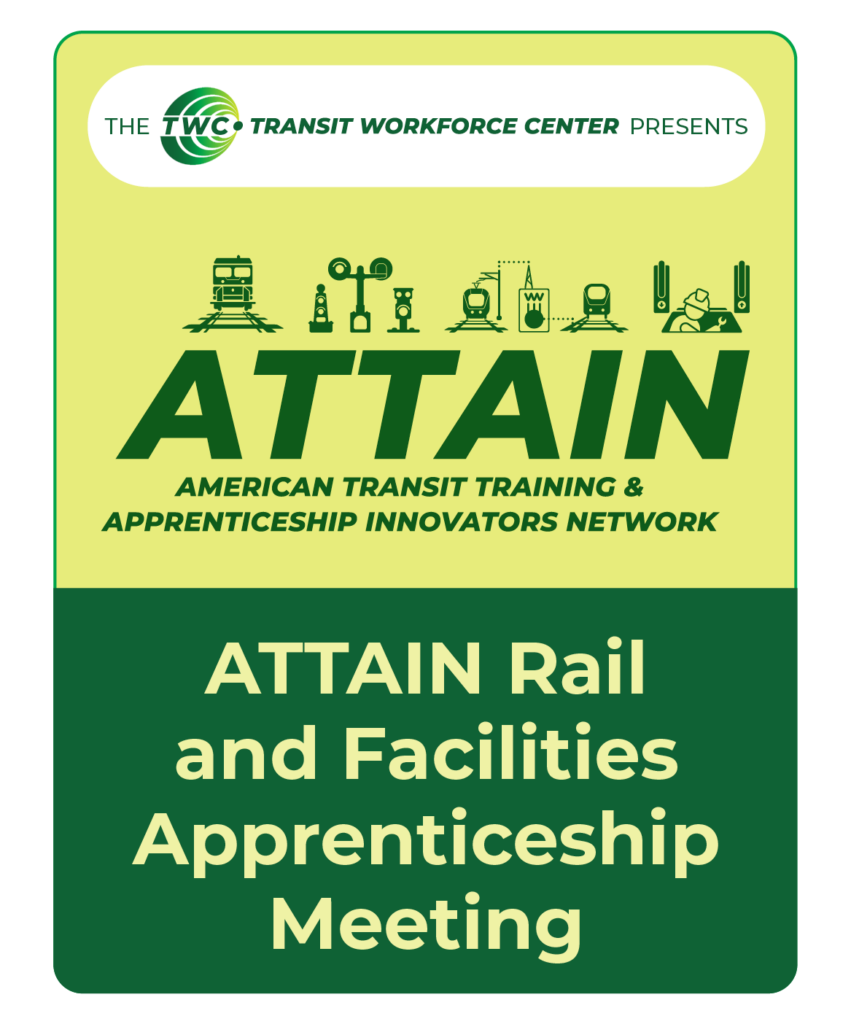
ATTAIN Rail and Facilities Apprenticeship Meeting
This recorded meeting of the ATTAIN Rail and Facilities Committee serves as a resource for transit industry stakeholders and includes presentations on apprenticeship and case studies of successful programs across the country.
Transit Workforce Center
September 2023
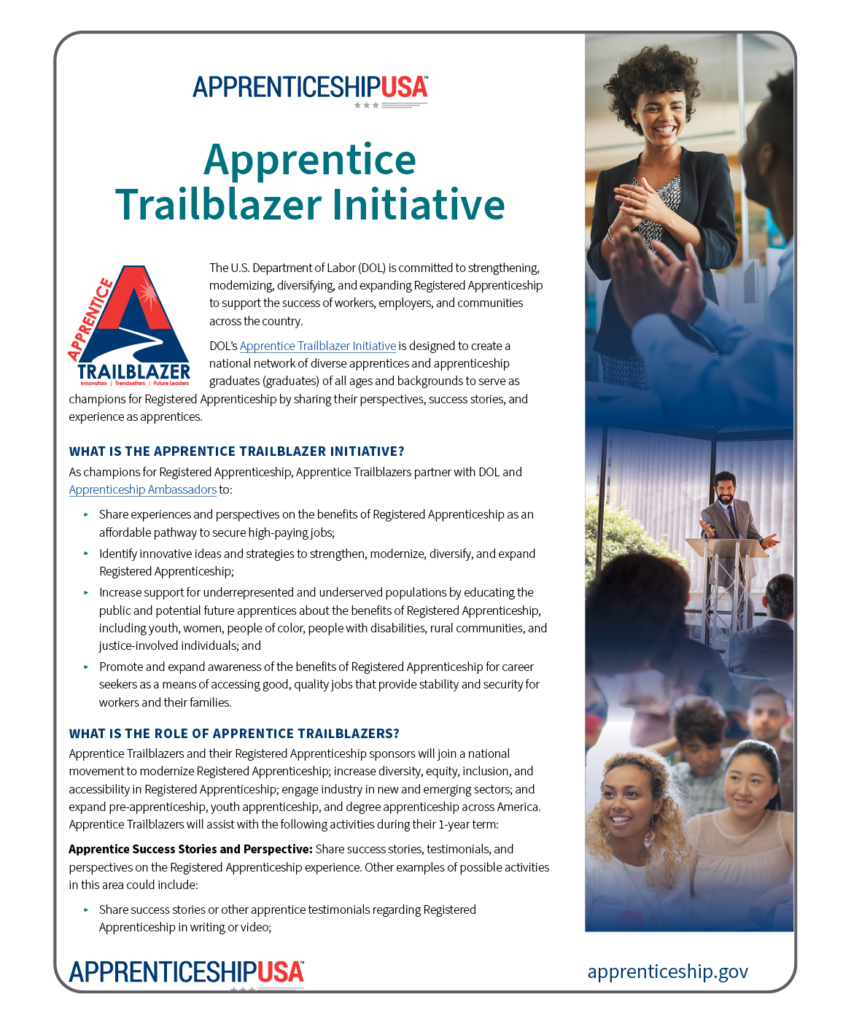
Apprentice Trailblazer Initiative
The Apprentice Trailblazer Initiative is designed to create a national network of apprentices and apprenticeship graduates to feature their stories and hear their perspectives, show how Registered Apprenticeships increase opportunities, and bring awareness to other career seekers who may be interested in becoming apprentices.
Department of Labor; ApprenticeshipUSA
TOPICS: Apprenticeship , Career Pathways , Community Engagement , Mentorship
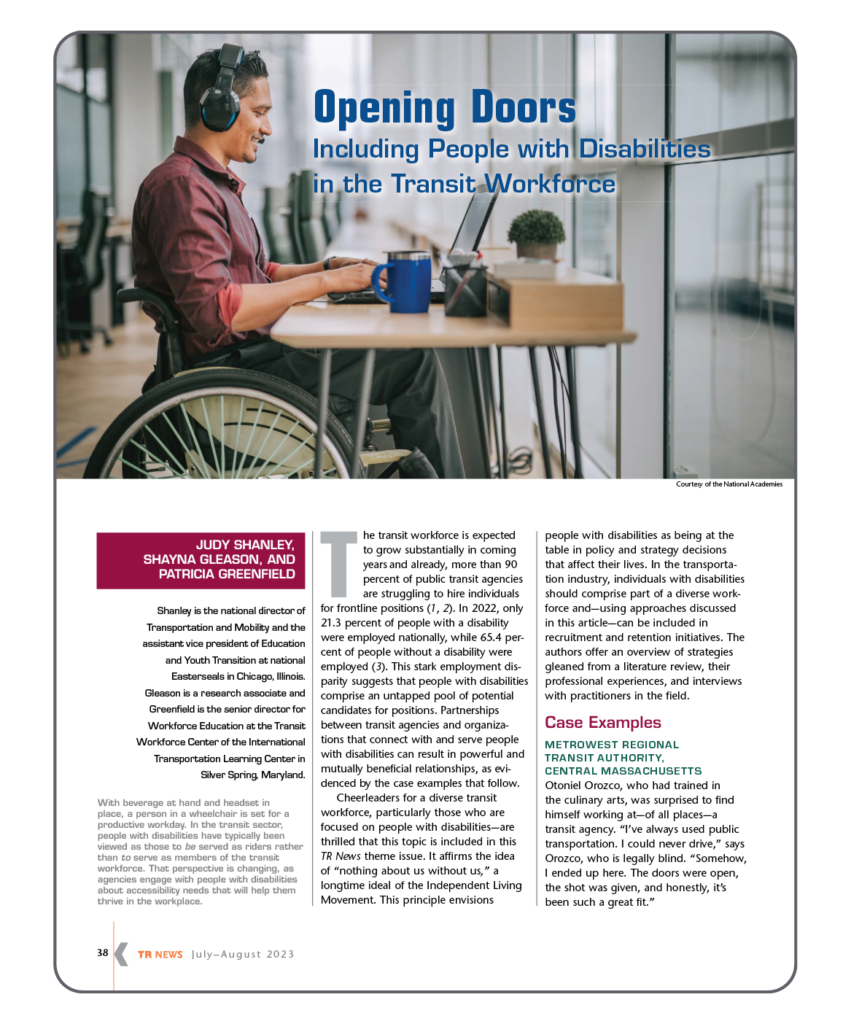
Opening Doors: Including People with Disabilities in the Transit Workforce
TR News
August 2023
In the transportation industry, individuals with disabilities should be included in recruitment and retention initiatives. “Opening Doors: Including People with Disabilities in the Transit Workforce” offers an overview of strategies and is one of the feature articles in the July-August 2023 edition (Issue 346) of TR News, TRB’s magazine.
Authors: Judy Shanley (National Center for Mobility Management), Shayna Gleason (International Transportation Learning Center), and Patricia Greenfield (International Transportation Learning Center)
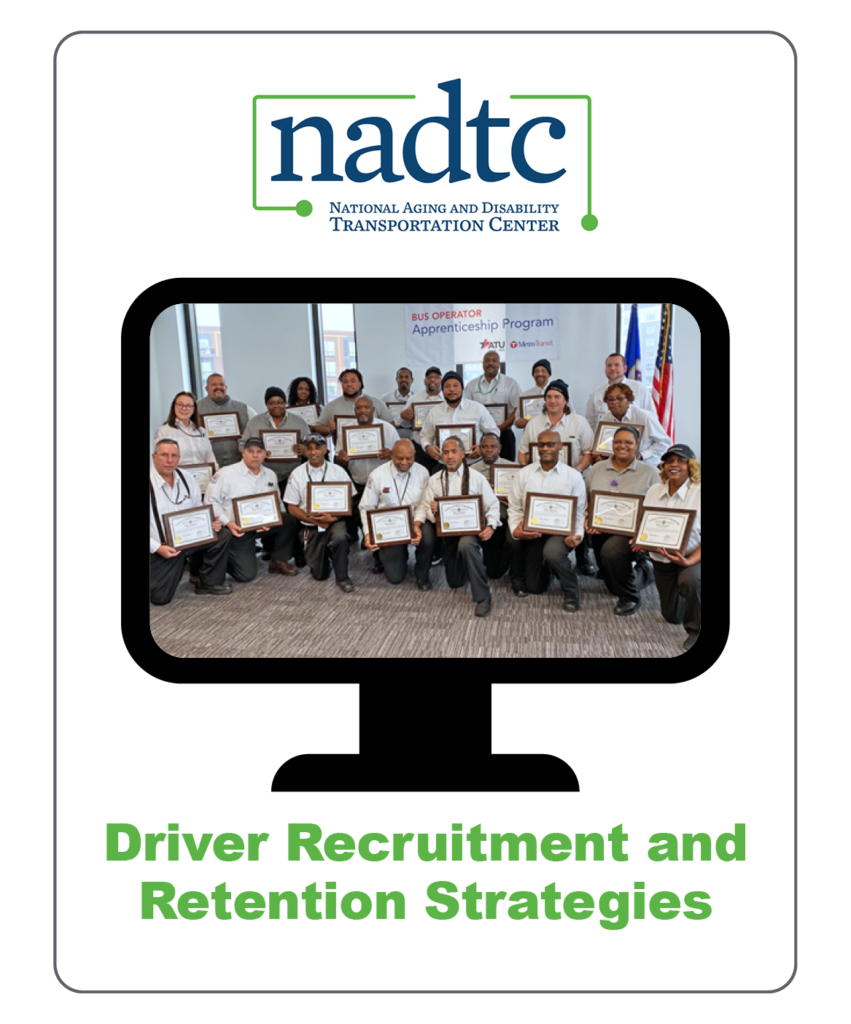
Driver Recruitment and Retention Strategies
This blog post from the National Aging and Disability Transportation Center discusses recruitment and retention strategies for transit agencies, particularly in regard to older and disabled workers in the face of industry-wide labor shortages. It includes examples of successful partnerships and effective mentoring programs.
National Aging and Disability Transportation Center
July 2023
TOPICS: Community Engagement , Hiring and Recruitment , Mentorship , Retention , Workforce Shortage
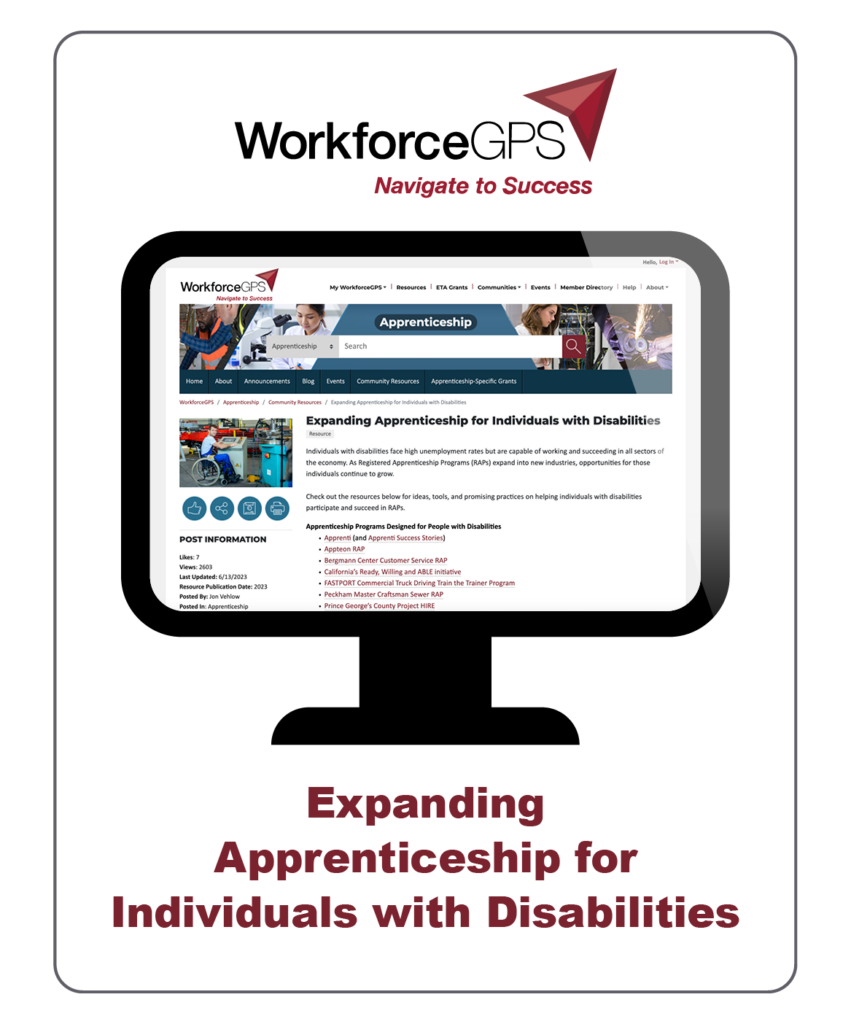
Expanding Apprenticeship for Individuals with Disabilities
This landing page features a variety of resources aimed at providing information, ideas, tools, and practices for supporting individuals with disabilities in apprenticeship programs. The resources include specific programs, toolkits and guides, outreach and background materials, and research.
WorkforceGPS
June 2023
TOPICS: Apprenticeship , Community Engagement , Mentorship
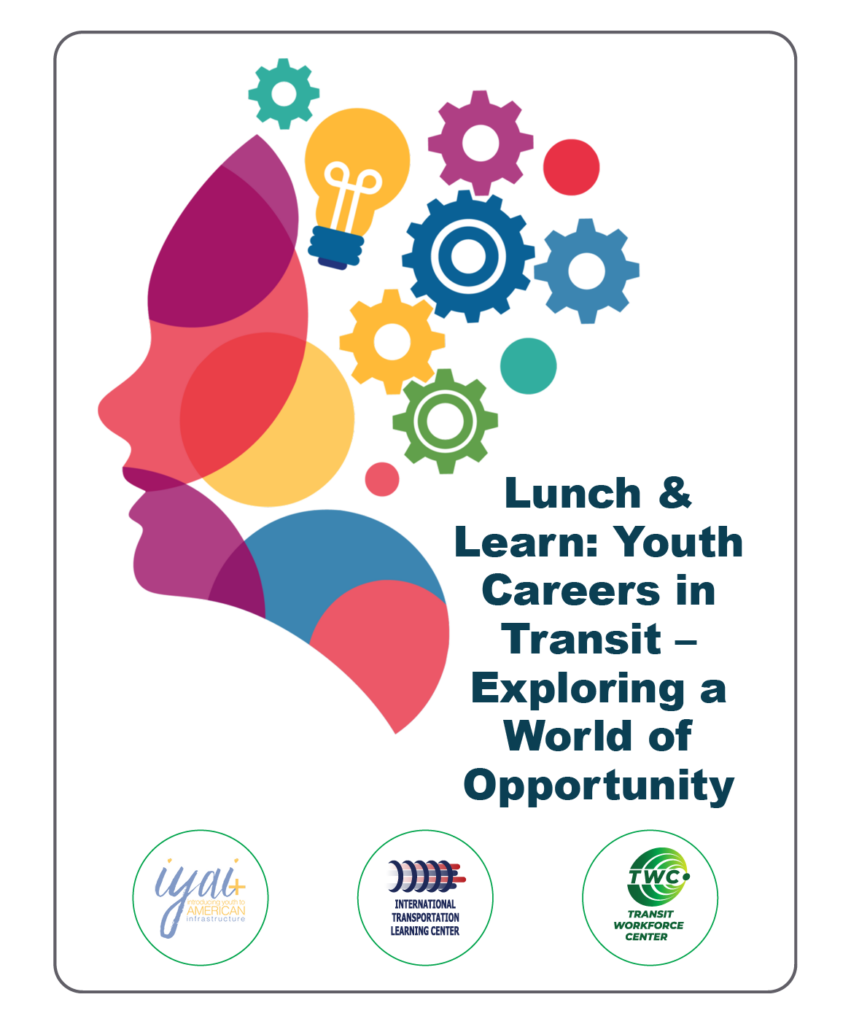
Lunch & Learn: Youth Careers in Transit – Exploring a World of Opportunity
This is Part 4 of Iyai’s 6-part 2023 Transportation/Mobility Career Awareness Lunch and Learn series. This webinar is co-sponsored with the International Transportation Learning Center / Transit Workforce Center. This webinar features presenters at various stages of their transit careers discussing their work and their own career pathways, engaging in an interactive discussion with the audience.
introducing youth to American infrastructure; International Transportation Learning Center/Transit Workforce Center
May 2023
TOPICS: Apprenticeship , Career Pathways , Community Engagement , Mentorship
Program: Iyai’s Dr. Beverly Scott and TWC’s Shayna Gleason present an overview of the program series and career landscape, followed by participants talking about their work and careers. Speakers include:
- Marvin Alfred, President, Amalgamated Transit Union (ATU) Local 113 (Toronto);
- Kyisha Bond, mechanic apprentice, IndyGo (Indianapolis),
- Inez Evans, President and CEO, IndyGo (Indianapolis);
- Andrew Falotico, Health and Safety Representative, ATU Local 113 (Toronto);
- Desiree Patrice, Deputy Chief of Capital Transformation, MBTA (Boston).
After the presentations, Karen Philbrick from the Mineta Transportation Institute facilitates a conversation between the audience and presenters.
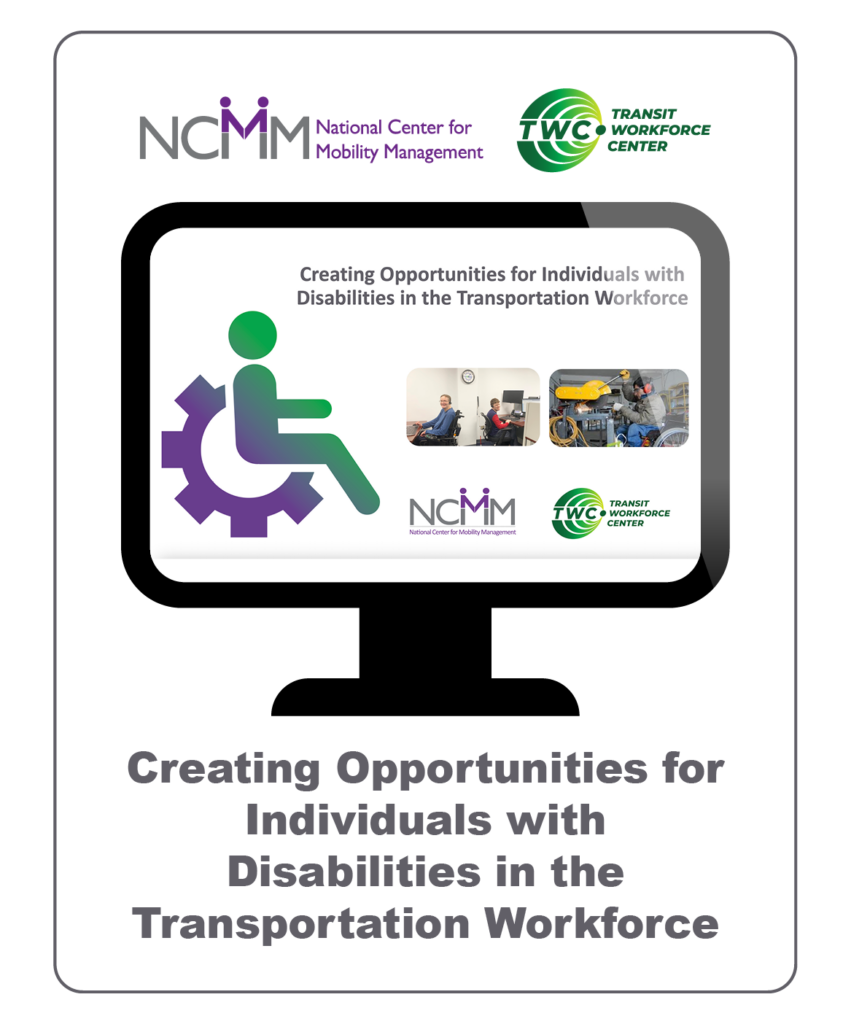
Creating Opportunities for Individuals with Disabilities in the Transportation Workforce
When transportation professionals are equipped with knowledge and skills about disability topics, they can help create welcoming and engaging employment settings for individuals with disabilities. This new NCMM/TWC learning module offers hiring professionals strategies to recruit and retain individuals with disabilities in the transportation workforce.
National Center for Mobility Management; Transit Workforce Center
May 2023
TOPICS: Community Engagement , Hiring and Recruitment , Retention
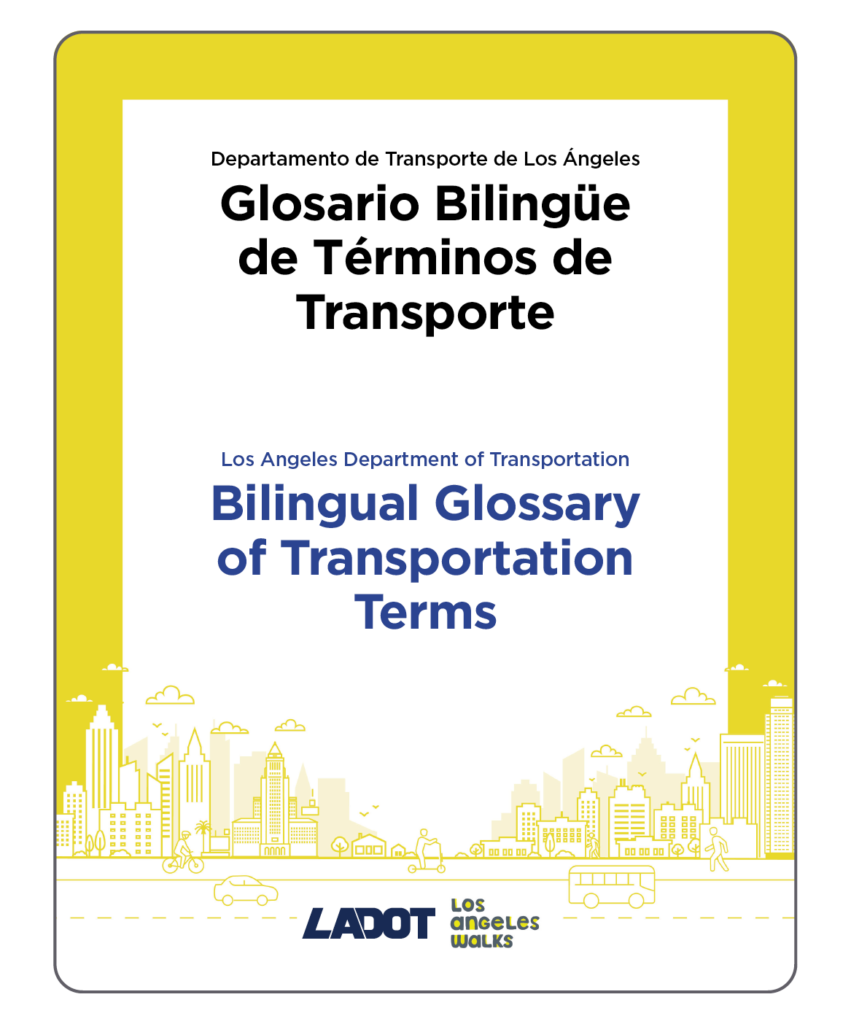
LADOT Bilingual Glossary of Transportation Terms
Los Angeles Department of Transportation
May 2023
TOPICS: Community Engagement , Hiring and Recruitment , Training
In 2020-2022, LADOT collaborated with LA Walks, community members, transportation and planning practitioners, advocates and others to develop LADOT’s first Spanish glossary. The project includes over 100 transportation planning and community engagement terms to improve and standardize LADOT’s Spanish language communication, as well as empower Spanish speaking communities to advocate for transportation improvements.
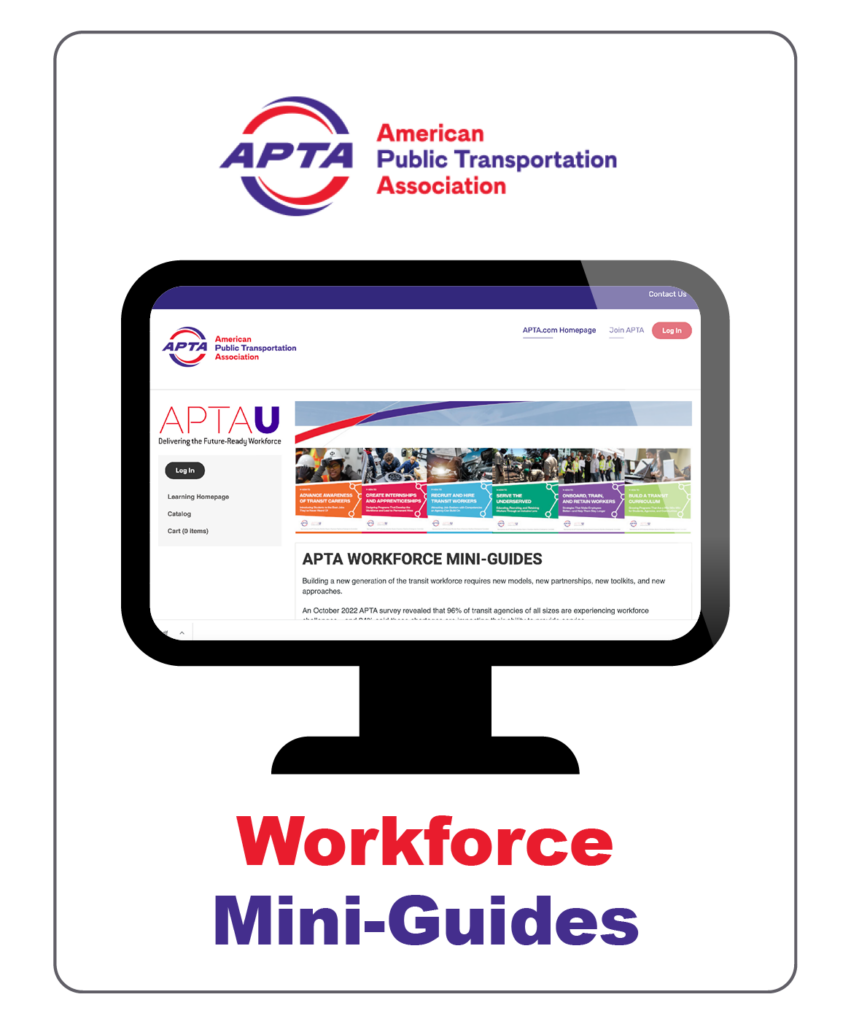
Workforce Mini-Guides
These six workforce development mini-guides are designed to help develop and implement successful strategies to address the critical workforce shortages seen across the public transportation industry. They cover these topics: advancing awareness of transit careers; creating internships and apprenticeships; recruiting and hiring transit workers; serving the underserved in the workforce; onboarding, training, and retaining workers; and building a transit curriculum.
American Public Transportation Association
April 2023
An October 2022 survey conducted by APTA revealed that 96 percent of transit agencies of all sizes are experiencing workforce challenges, and 84 percent said these shortages are impacting their ability to provide service. APTA developed these mini-guides building on their 2021 Transit Workforce Readiness Guide and combining industry insights and stories, case studies, lessons learned, and best practices.
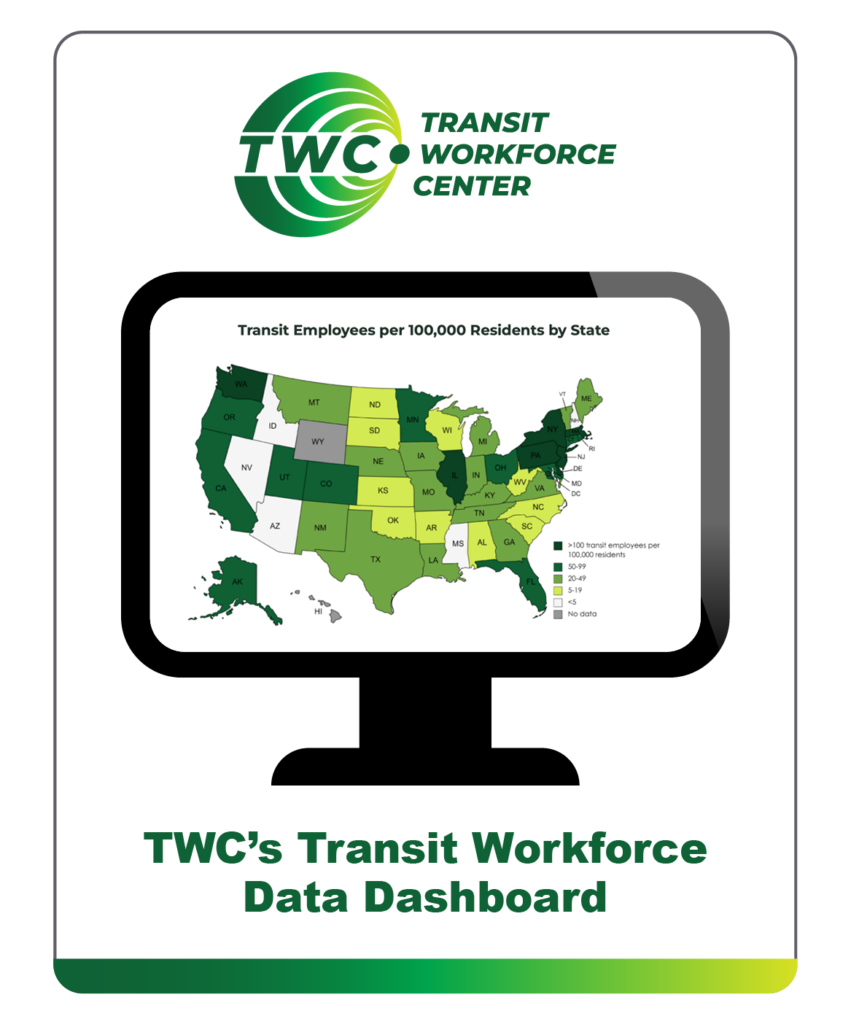
TWC’s Transit Workforce Data Dashboard
Launched in March, 2023, the Transit Workforce Data Dashboard presents quantitative, descriptive data about the composition of the transit workforce and trends in transit employment using a series of charts and graphics. This information is relevant for industry discussions in a range of contexts, including: strategic workforce planning in recruitment, retention, and other areas; examining and addressing opportunities and challenges related to workforce demographics; and identifying training and funding needs.
Transit Workforce Center
March 2023
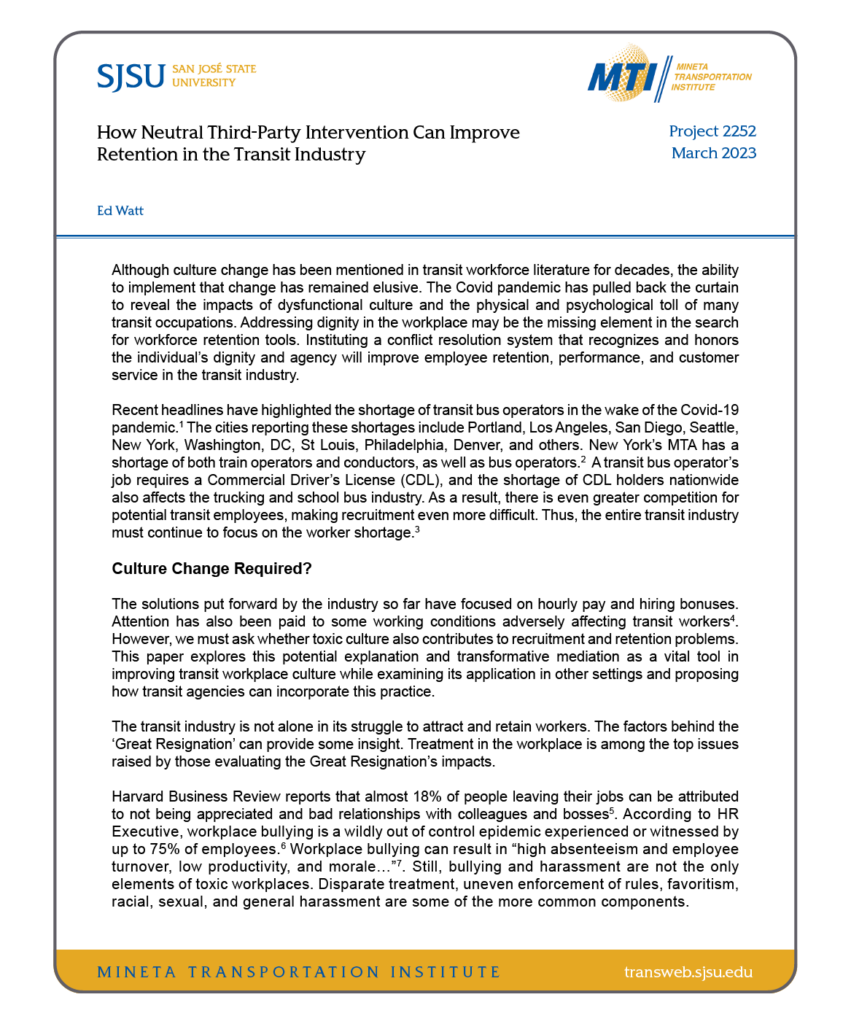
How Neutral Third-Party Intervention Can Improve Retention in the Transit Industry
This study proposes methods that follow transformative mediation in order to improve hiring and retention at transit agencies and other companies by providing an organizational culture that respects each person’s dignity, identity, and opinions.
Mineta Transportation Institute
March 2023
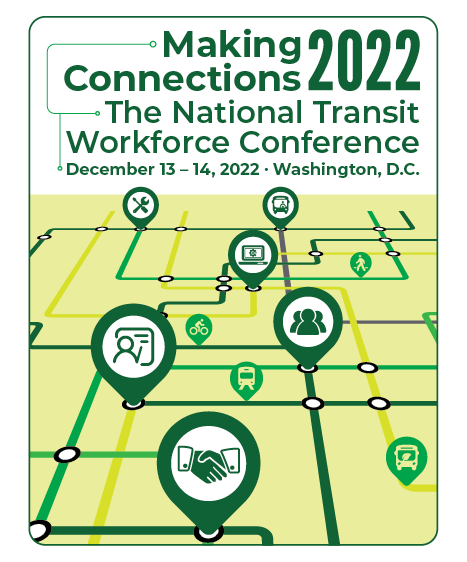
Making Connections 2022 – Conference Overview and Videos
The Transit Workforce Center hosted Making Connections 2022: The National Transit Workforce Conference in Washington, D.C. on December 13-14, 2022. This conference brought together participants from urban, suburban, rural, and tribal public transportation and industry stakeholders in plenaries, workshops, networking, and ongoing dialogue. Discussions and sessions featured topics including recruitment and retention, training, mentoring and apprenticeships, new technologies, and preparing today’s and tomorrow’s workforce.
Transit Workforce Center
December 2022
Session materials from Making Connections 2022 are hosted on the TWC Resource Center. Please click here to view all related materials. A PDF copy of the conference schedule is linked below.
Opening Video:
Recap Video:
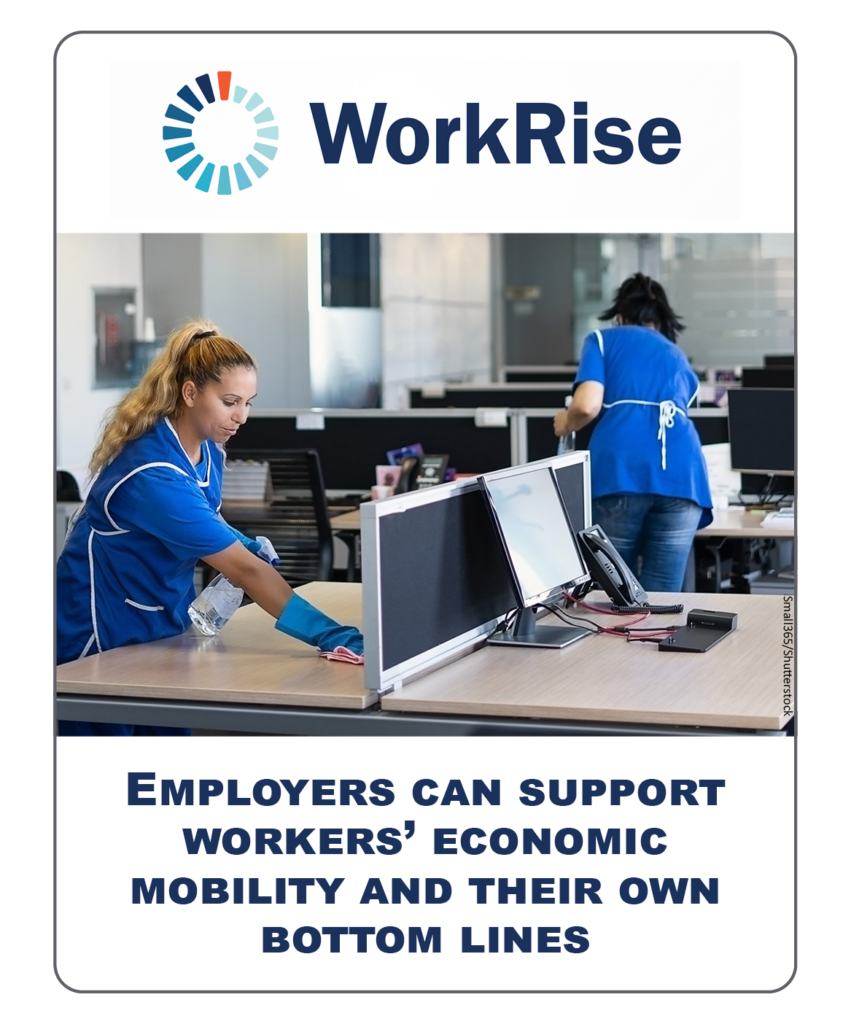
Employers can support workers’ economic mobility and their own bottom lines
This article provides a concise description of several strategies employers can use to create clear advancement pathways in their workplaces, which will help attract and retain quality candidates. It discusses research around what modern-day employees are looking for in a workplace and a position. It also links to a related article, which provides an overview of the framework created by Jobs for the Future (JFF) to describe the components of a good job.
WorkRise
November 2022
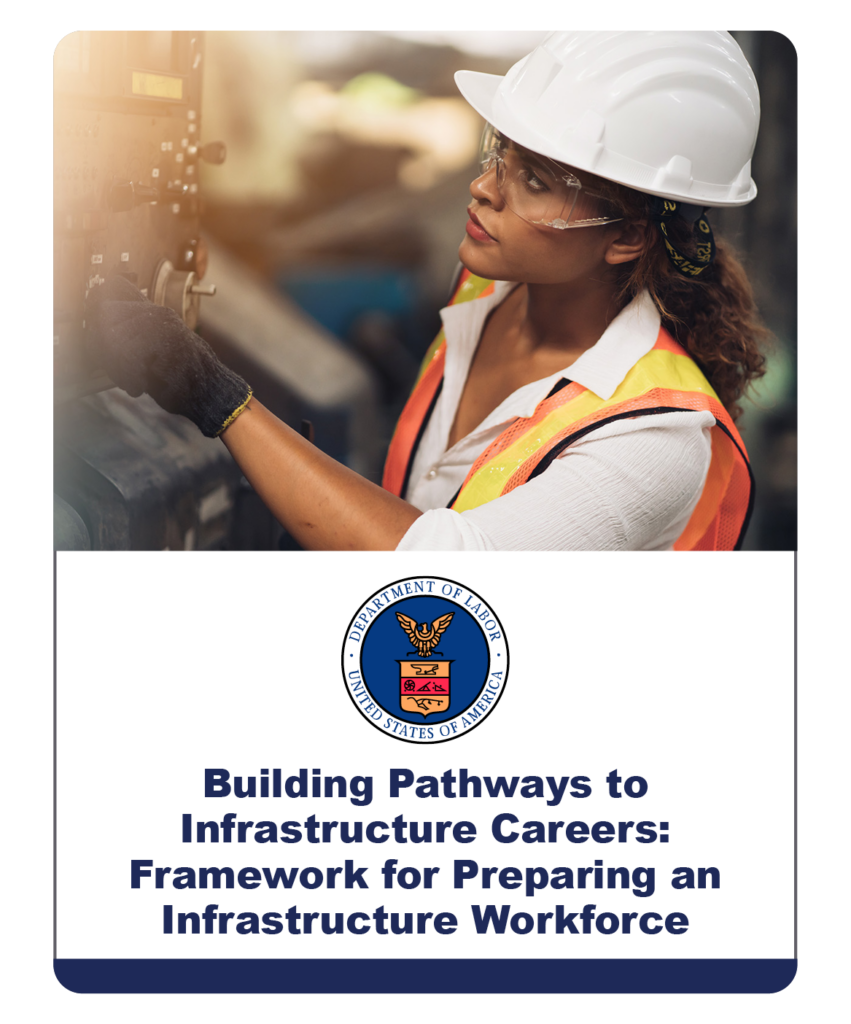
Building Pathways to Infrastructure Careers: Framework for Preparing an Infrastructure Workforce
This resource provides a framework for all workforce stakeholders, including infrastructure project leads, to engage the public workforce system in implementing the Bipartisan Infrastructure Law with strong workforce commitments and proven strategies that produce high-quality education, training, and employment opportunities for all workers.
U.S. Department of Labor, Employment and Training Administration
October 2022
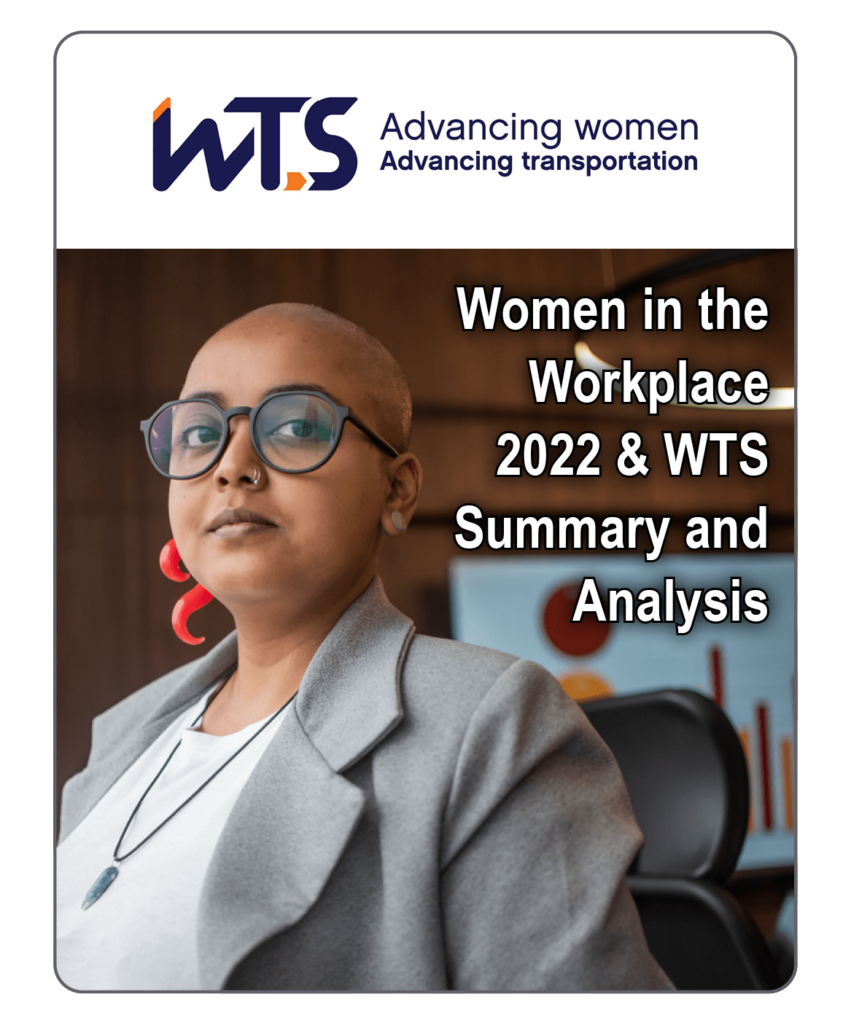
Women in the Workplace 2022
Launched in 2015 by LeanIn.Org and McKinsey & Company, Women in the Workplace is the largest study on the state of women in corporate America. The summary from WTS International outlines the report’s implications for the transportation workforce.
LeanIn.Org; McKinsey & Company; WTS International
October 2022
TOPICS: Career Pathways , Community Engagement
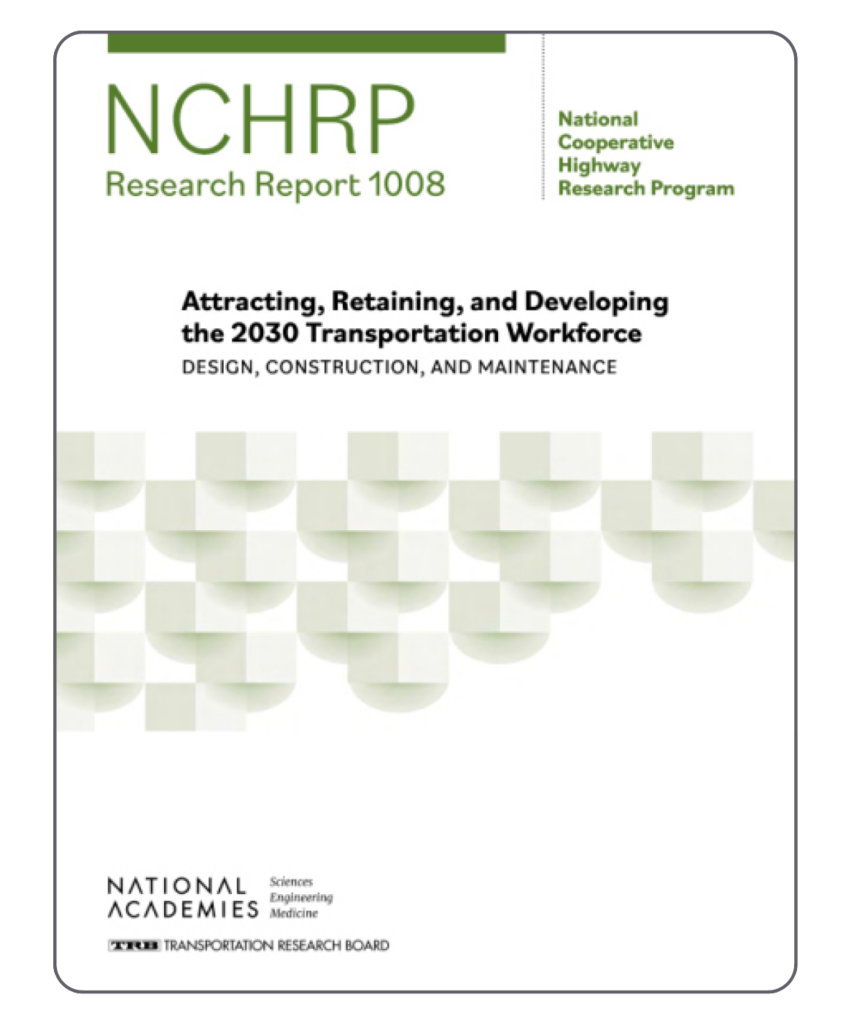
Attracting, Retaining, and Developing the 2030 Transportation Workforce
This report provides a guide with specific strategies and action plans to help agencies identify and address workforce needs through 2030 and beyond.
National Cooperative Highway Research Program
October 2022
State departments of transportation are responsible for providing a safe, efficient, and effective transportation system of infrastructure and services. To meet these responsibilities, transportation agencies need a highly skilled workforce with the expertise required to identify and address current transportation needs while also being prepared to address the challenges of the future.
Contributor(s): National Academies of Sciences, Engineering, and Medicine; Transportation Research Board; National Cooperative Highway Research Program; Candace Blair Cronin; Allison Alexander; Grace Arnold; Juan Carlos Batarse; Kelly Dray; Sasha Iliev; Jessica Jenkins; Erik Smallwood; Rachel Smart; Jake Streng; Mara Campbell; Susan Gallagher; Tyler Reeb; Tom O’Brien; Glenn McRae
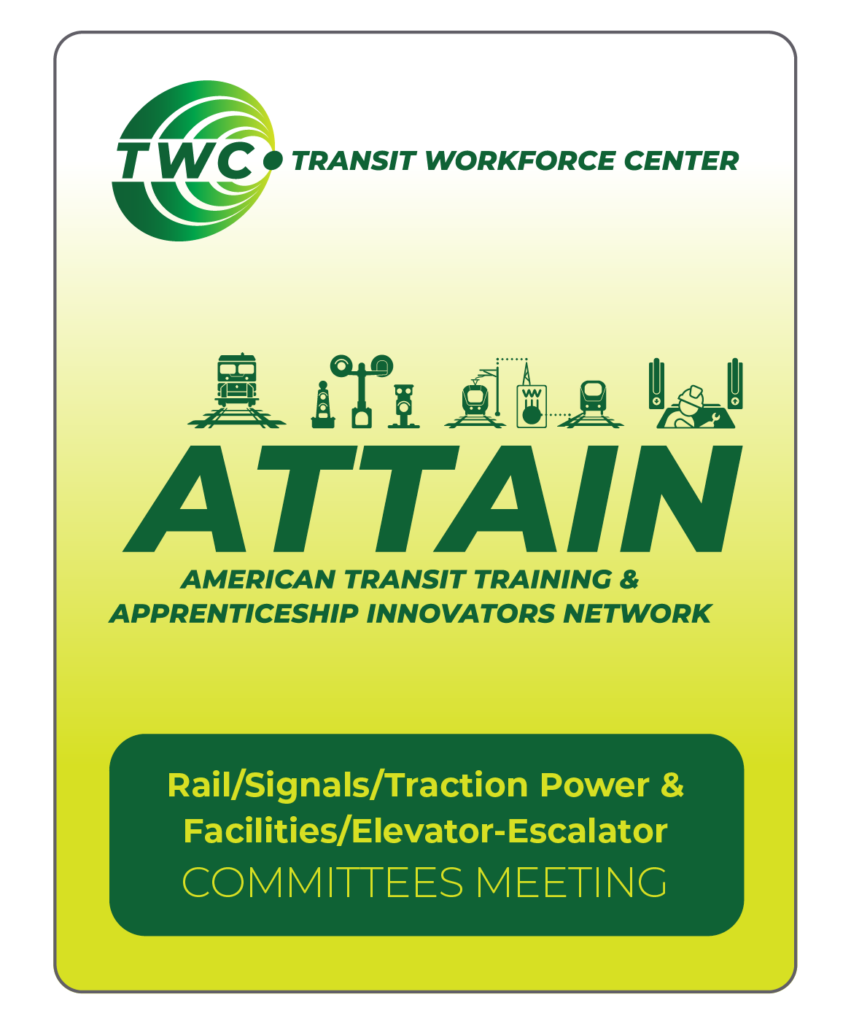
ATTAIN Rail/Signals/Traction Power and Facilities/Elevator-Escalator Committees Meeting
This recorded meeting of the ATTAIN committees for Rail/Signals/Traction Power and Facilities/Elevator-Escalator serves as a resource for transit industry stakeholders and includes presentations on apprenticeship and case studies of successful programs across the country.
Transit Workforce Center
September 2022
TOPICS: Apprenticeship , Career Pathways , Community Engagement , Hiring and Recruitment , Training
The American Transit Training and Apprenticeship Innovators Network (ATTAIN), run by the Transit Workforce Center (TWC), is a peer network created for transit agencies and labor unions to explore new apprenticeship programs or enhance existing programs for their frontline workforce.
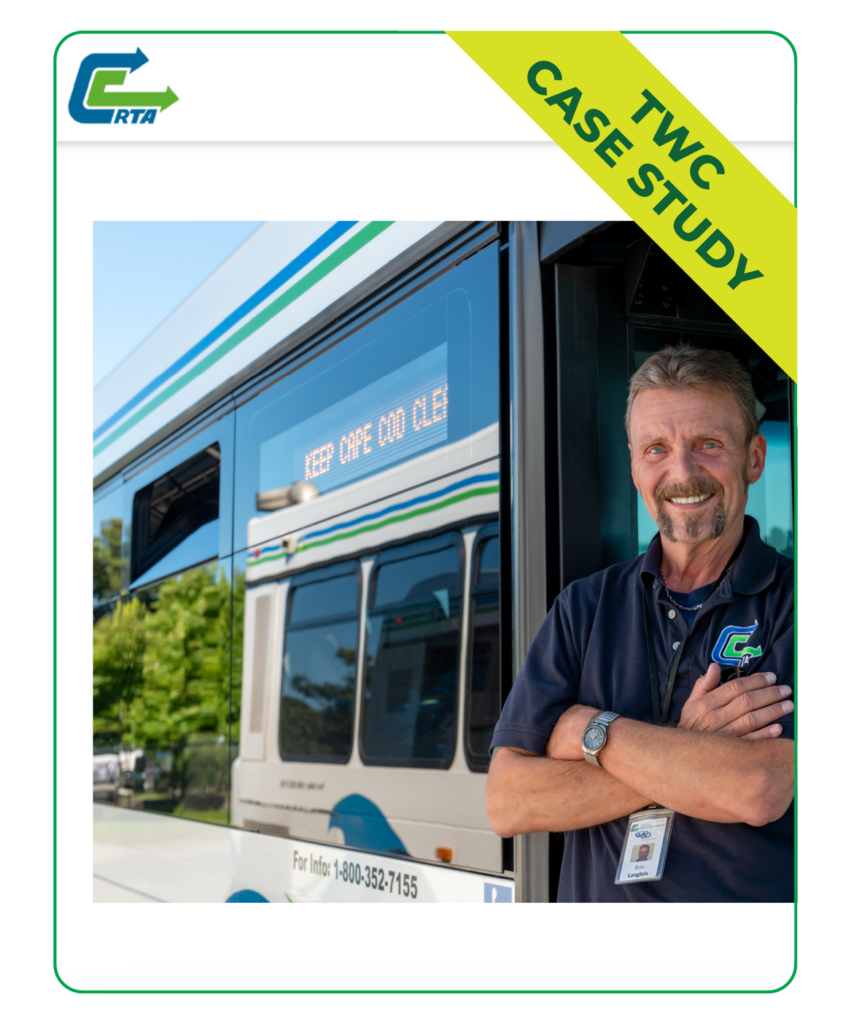
Recruiting Older Workers and Retirees at Cape Cod Regional Transit Authority
Cape Cod Regional Transit Authority; Transit Workforce Center
September 2022
Cape Cod Regional Transit Authority (CCRTA) in Massachusetts serves 15 towns within a 400 square miles area in an area where the population triples in the summer with seasonal residents. CCRTA runs seven year-round fixed route lines, several on-demand and hybrid on-demand services, and three summer shuttle services. In 2021, CCRTA served approximately 2.5 million people with 98 drivers.
Faced with driver shortages, CCRTA and Amalgamated Transit Union Local 1548 worked together and negotiated driver raises and $1,000 bonuses paid after 90-days. In addition, a six-step salary scale to reach the top pay grade was reduced to two steps. Drivers can now reach the top pay level within two years.
Barnstable County’s older adult population is among the largest per capita in the country, and CCRTA has instituted hiring initiatives aimed toward the older worker and retiree population. In connecting with this population, CCRTA has taken a variety of actions, including:
- Reaching out through Cape Cod Elder Services to communicate CCRTA’s interest in hiring older workers. CCRTA’s Human Services Transportation Manager sits on this organization’s board, facilitating ongoing contact.
- Targeting recruitment of retiring teachers, firefighters, police, and school bus drivers. Cape Cod RTA staff visited schools, fire houses, police stations, and municipal offices to share recruitment information.
- Visited each town on Cape Cod, talked with local retirement agency officials, and posted and mailed banners and notices.
- Overall increase in the agency’s traditional and social media presence generally, including advertising explicitly aimed at older adults, including on social media. Developed advertising, messaging, and imagery to make older workers and retirees feel welcome. To see samples of advertising, visit Cape Cod RTA Jobs on Facebook, the ad on their website’s front page, and see the video, featuring older drivers, on the CCRTA career page.
- Emphasizing the short time it takes to reach the highest salary level, a compelling message for older people and retirees, who often value salaries more than benefits, as well as the ability to reach the highest level within their time at the agency.
- Offering various employment options, including full-time and part-time, and seasonal. The agency has found that individual needs lead to varied choices; they estimate their older employees have split 50-50 in what scheduling option they choose.
- Providing full CDL training, testing and additional agency-specific training for all employees without CDLs. The agency pays for all training.
- Offering options for non-CDL drivers, who operate smaller vans. The agency encourages the CDL route because it gives drivers more flexibility in shifts and allows them to work and get paid at a higher rate.
- Currently exploring working with the Barnstable County Retirement Commission to arrange for a notice about CCRTA employment options to be part of the Commission’s information packet when an employee puts in for retirement.
CCRTA values its older workforce and their commitment to the job; through its efforts, it has been able to hire a dozen older adults / retirees as drivers. The agency notes that with this population, it is reasonable to expect excellent attendance, while also allowing for the potential of more short-term disability and time for medical appointments. COVID-19 saw CCRTA lose about half of its older adult workforce, given that population’s sensitivity to exposure. However, CCRTA is renewing its recruitment efforts in this area through the various methods noted.
For more information, contact:
Penny Grossman, H.R. Manager – Pgrossman@capecodrta.org – 508-385-1430, ext. 106
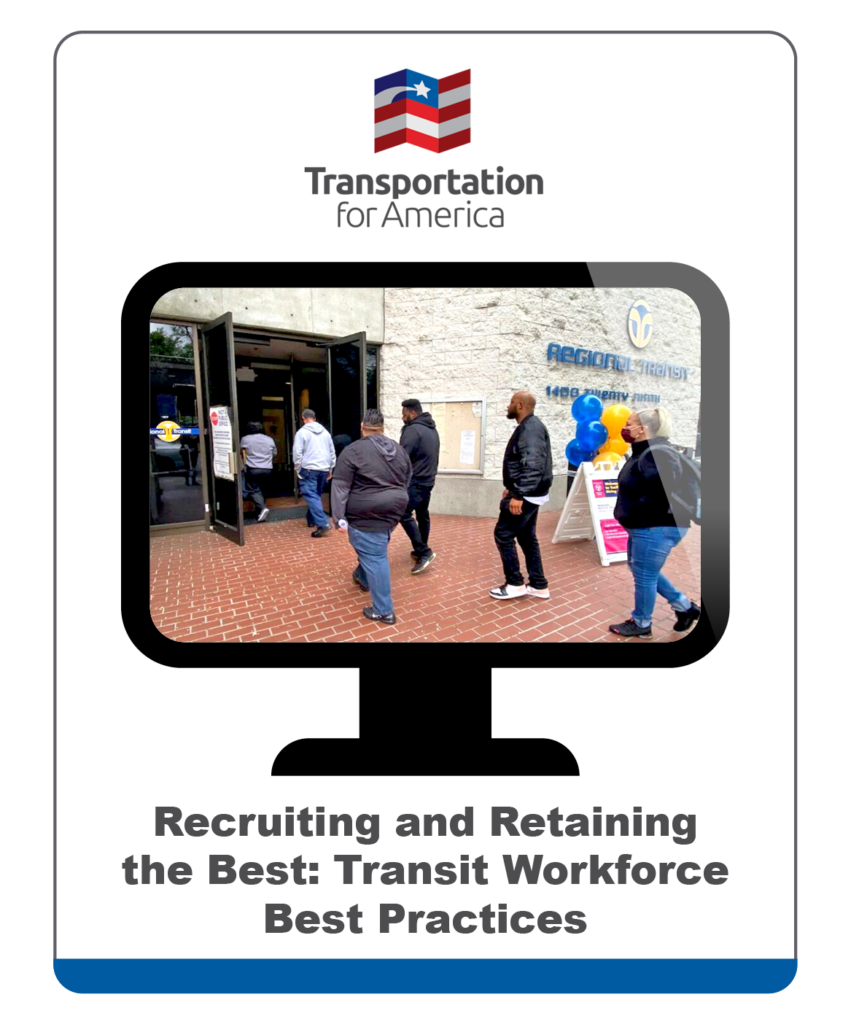
Recruiting and Retaining the Best: Transit Workforce Best Practices
This blog post from Transportation for America details successful strategies and best practices employed by transit agencies to empower their operator and maintenance workforces.
Transportation for America
September 2022

Wire Women: Lighting it Up
This illustrated publication tells the stories of women who are undertaking apprenticeship to become union electricians. This resource could be used by transit agencies, unions, or apprenticeship programs as promotional material or for educational purposes.
Sharon Szymanski
September 2022
TOPICS: Apprenticeship , Career Pathways , Community Engagement
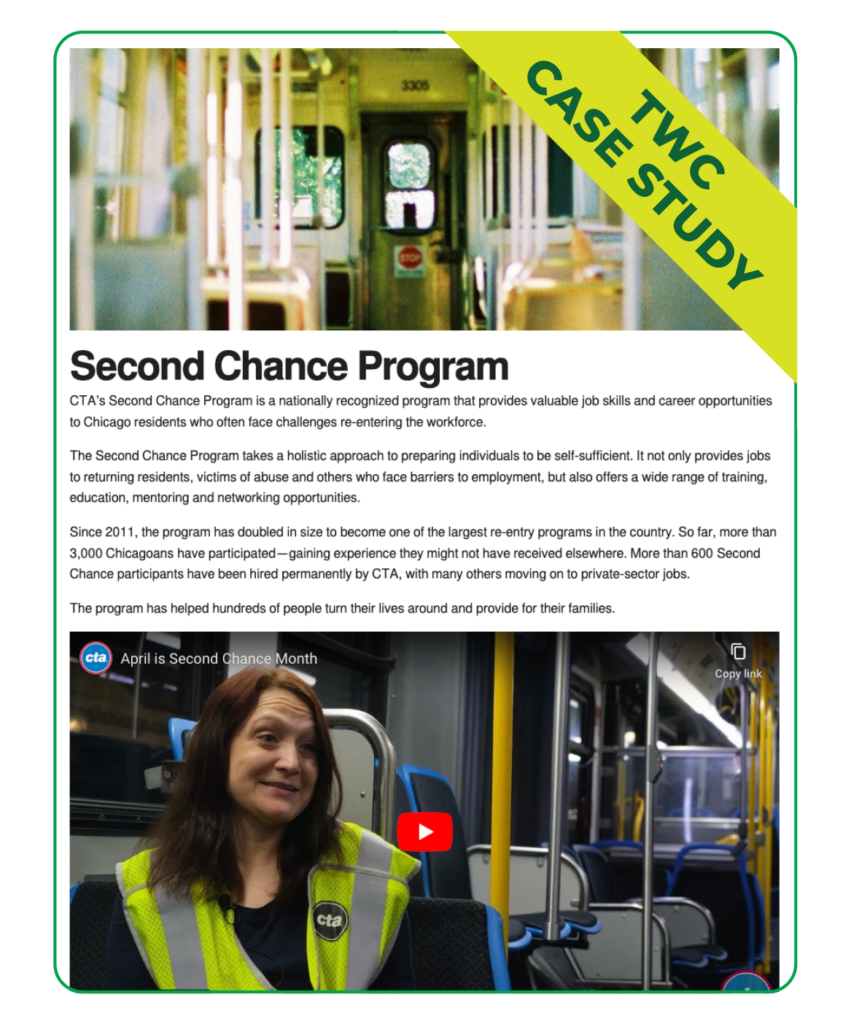
Second Chance Transit Programs
Several transit agencies across the country have established Second Chance programs to support formerly-incarcerated individuals as they reenter the workforce; these programs set pathways into frontline transit positions, often focusing on driver recruitment. These initiatives involve active collaboration between transit agencies and departments of corrections. Agencies have also worked with other partners, including their local unions, state and local workforce development agencies, ex-offender support programs, and local community organizations.
August 2022
Basic descriptions of some current state and local programs can be found at the links below.
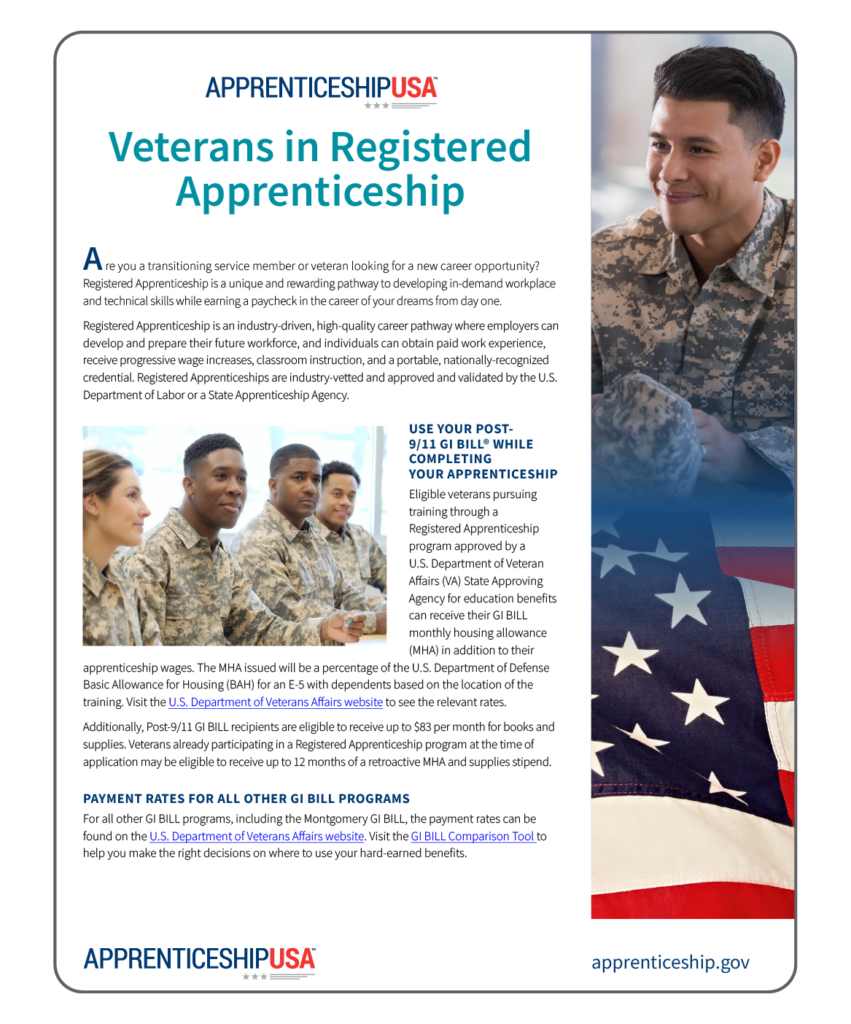
Veterans in Registered Apprenticeship
This fact sheet provides an overview of how veteran-specific public benefits can be applied to support a veteran’s completion of a registered apprenticeship program. It also provides links to resources for more detailed information on apprenticeship resources for service members, employment resources for veterans, and more.
ApprenticeshipUSA
August 2022
TOPICS: Apprenticeship , Community Engagement
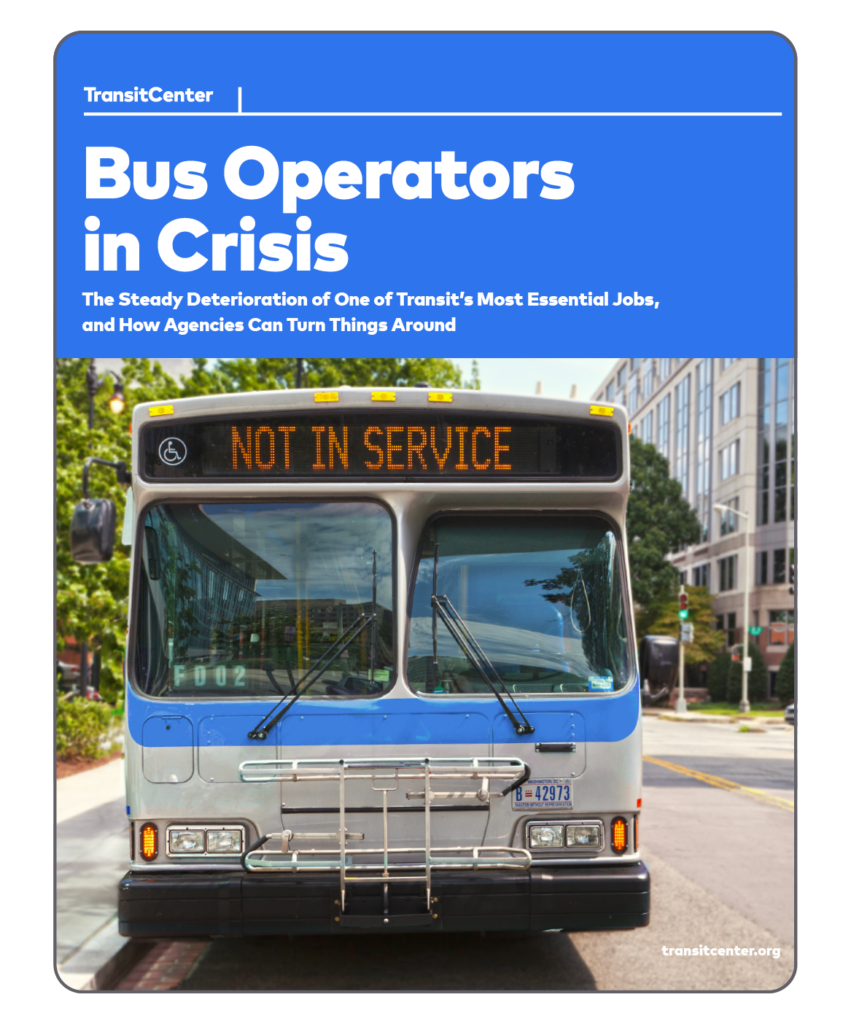
Bus Operators in Crisis
TransitCenter’s report, entitled Bus Operators in Crisis: The Steady Deterioration of One of Transit’s Most Essential Jobs, and How Agencies Can Turn Things Around, analyzes the nationwide phenomenon of bus operator shortages and advocates for enhanced job quality in the occupation. It details the challenges American operators are facing, and offers solutions that transit agencies can take to solve issues locally, as well as steps that state and the federal governments can take to provide agencies with necessary support.
TransitCenter
July 2022
TOPICS: Apprenticeship , Career Pathways , Community Engagement , Hiring and Recruitment , Retention
This resource also includes a link to a webinar hosted in July, 2022 presenting information from the report and slides from the webinar.
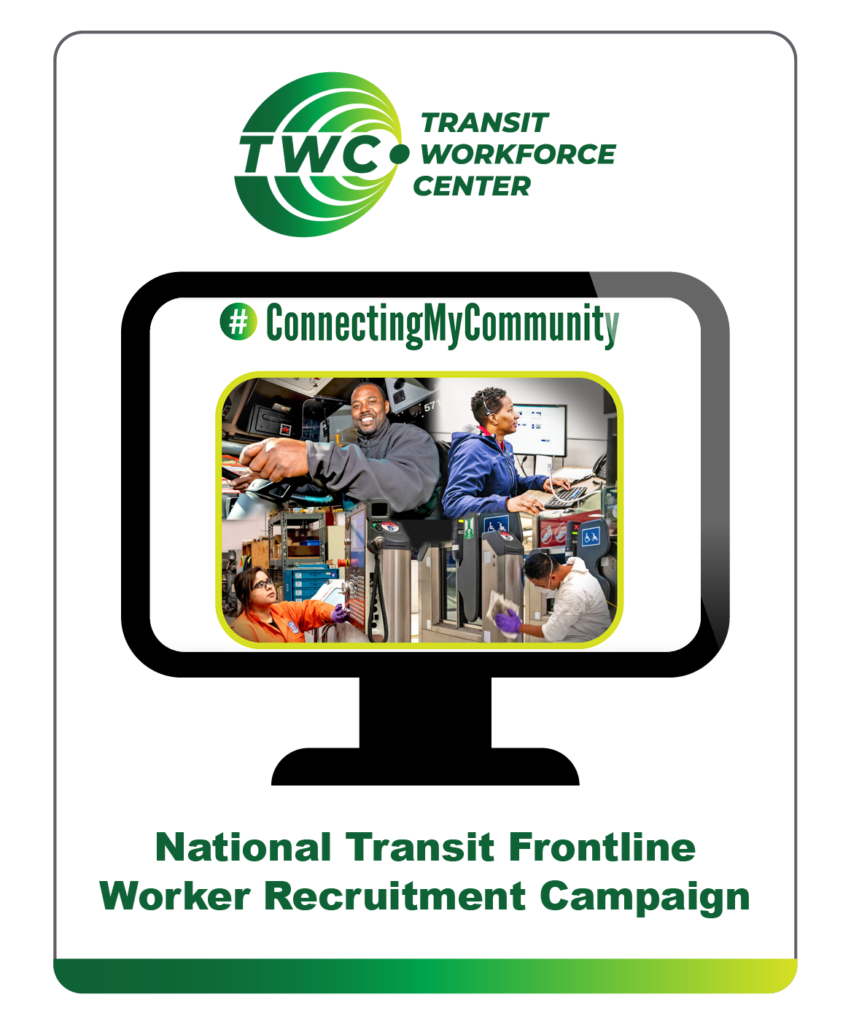
National Transit Frontline Worker Recruitment Campaign
Across the United States, whether large, small, urban, rural, or tribal, transit agencies are facing the challenge of recruiting and retaining drivers, mechanics, and technicians who can operate and maintain the buses of our public transit systems. To help support local transit efforts, TWC is developing the #ConnectingMyCommunity national frontline worker recruitment campaign, coordinated with the Federal Transit Administration (FTA) and industry, labor, and community partners from around the country.
Transit Workforce Center
July 2022
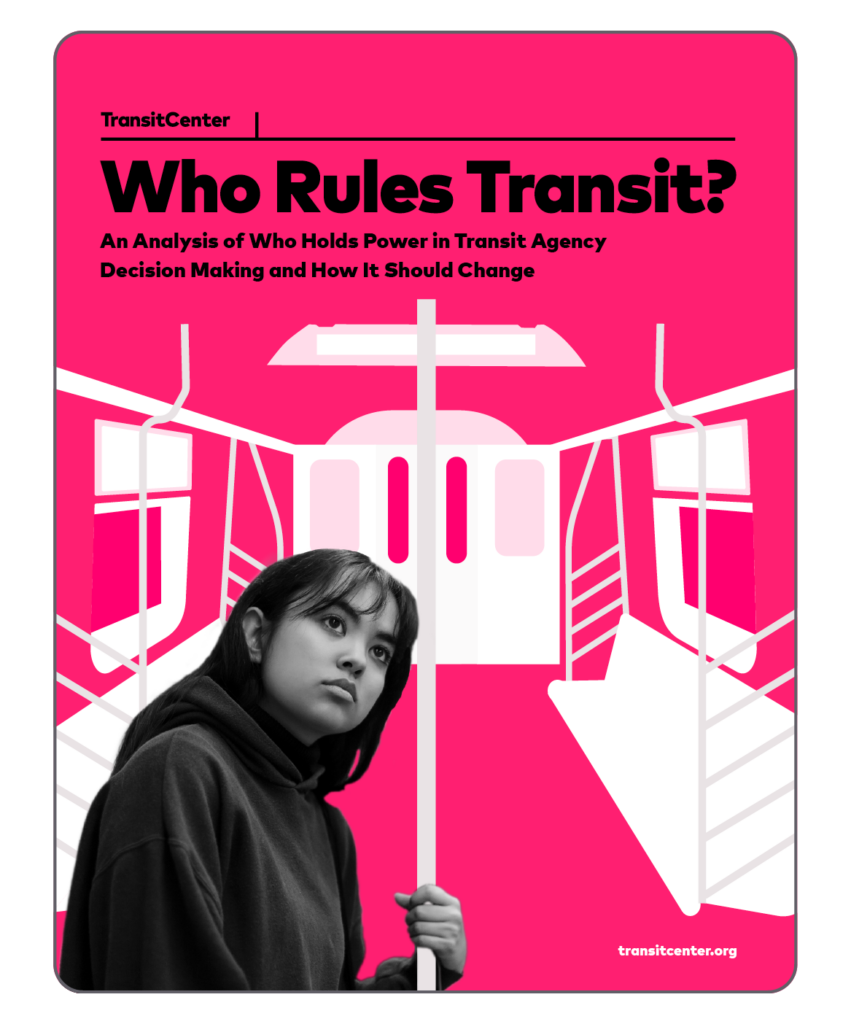
Who Rules Transit?
This report examines who makes key decisions at transit agencies and who is affected by these decisions. The report provides case studies of agencies that have taken steps to give transit riders and workers more power in the decision-making process.
TransitCenter
April 2022
TOPICS: Community Engagement , Policy and Planning
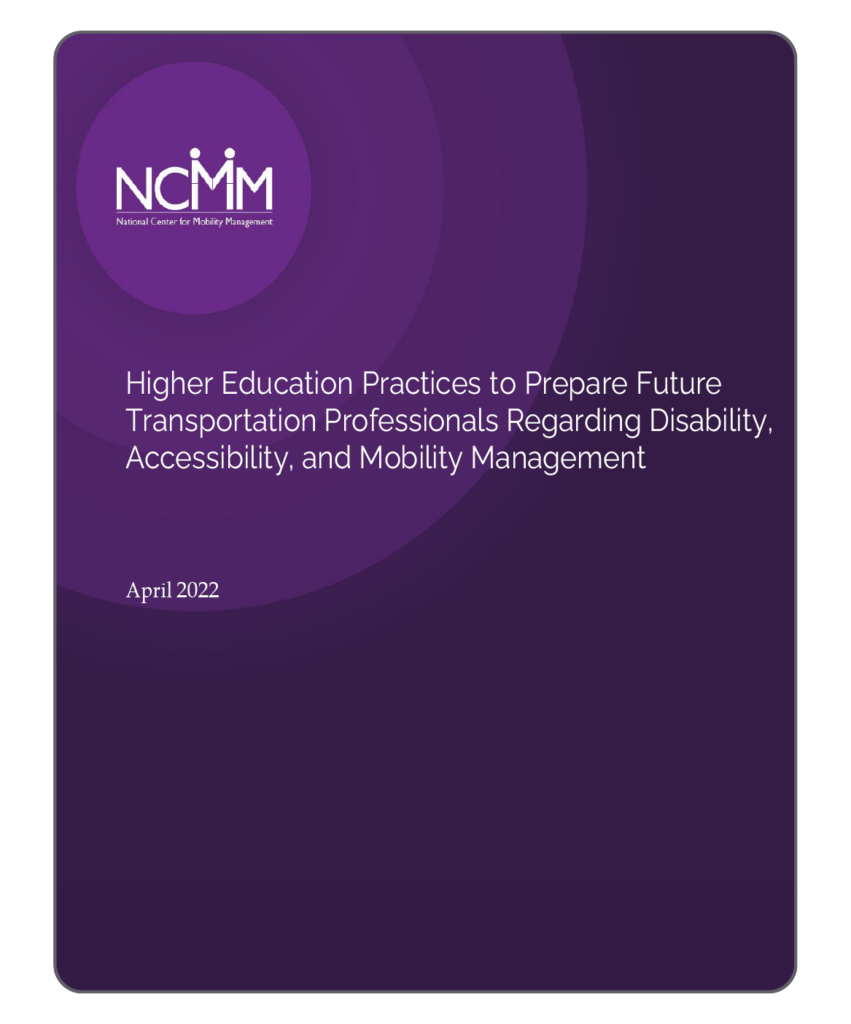
Higher Education Practices to Prepare Future Transportation Professionals Regarding Disability, Accessibility, and Mobility Management
This National Center for Mobility Management (NCMM) Information Brief provides the results of a NCMM study regarding mobility management, disability, and accessibility content in higher education preparation programs. This brief offers recommendations regarding how to integrate such content, as well as information on the recruitment and retention of individuals with disabilities in the transportation industry.
Please click the link below to view NCMM’s Mobility Management in Practice Series; this brief is listed among several 2022 publications.
National Center for Mobility Management (NCMM)
April 2022
TOPICS: Community Engagement , Hiring and Recruitment , Retention , Training
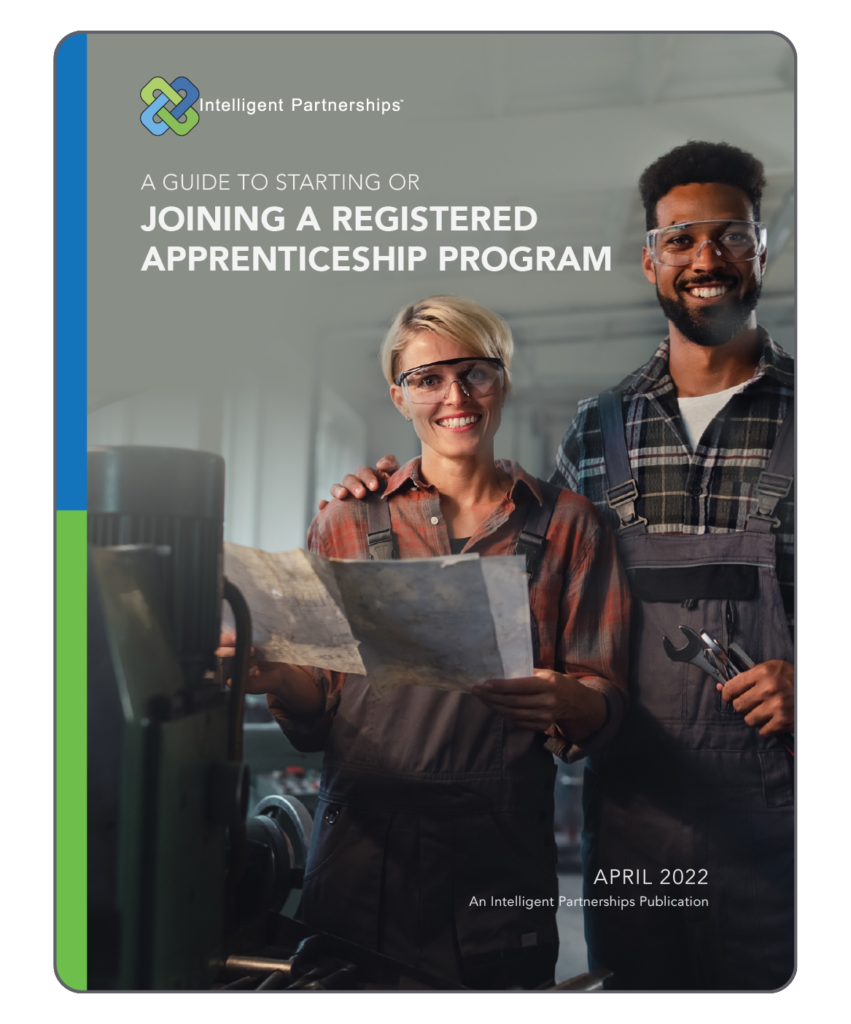
A Guide to Starting or Joining a Registered Apprenticeship Program
This publication provides an overview of registered apprenticeship, the benefits of registered apprenticeships to the employer, and the basic steps to get started.
You can also consult with your state office on registered apprenticeship for technical assistance and support for questions on the apprenticeship model, guidance on each phase of developing a program, connections to training providers, and advice on available funding sources to support apprenticeships: https://www.apprenticeship.gov/about-us/state-offices
Intelligent Partnerships
April 2022
TOPICS: Apprenticeship , Career Pathways , Community Engagement , Policy and Planning , Training
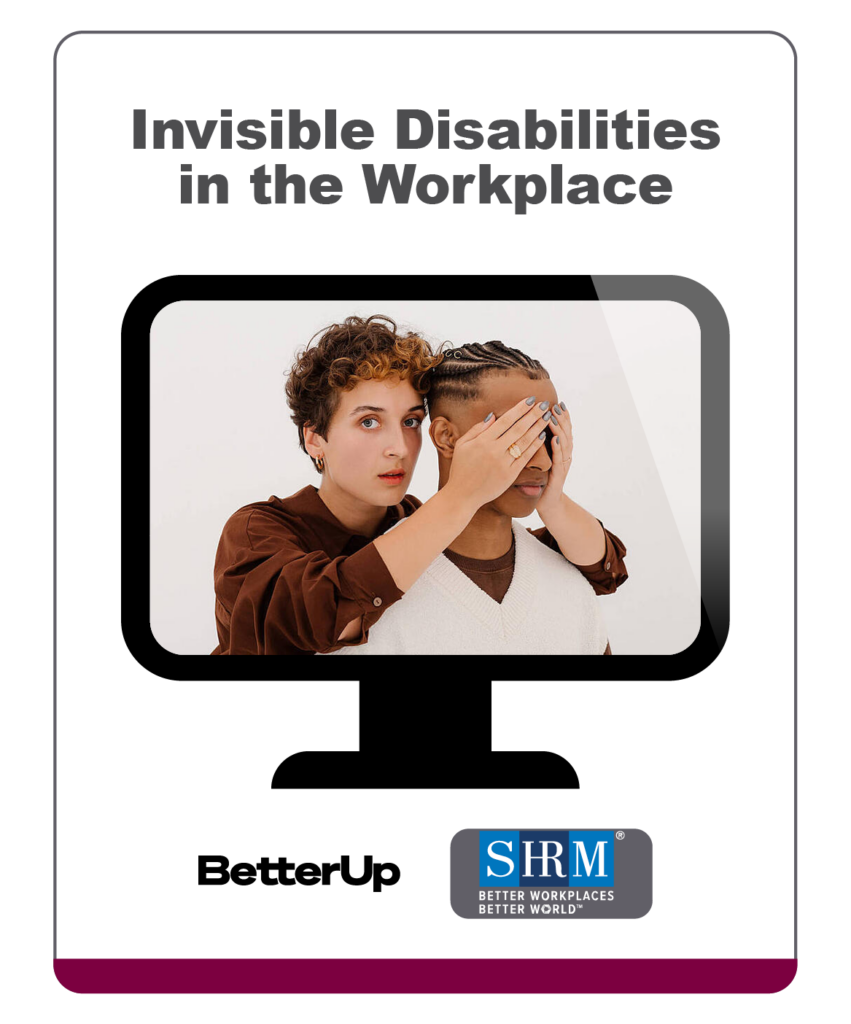
Invisible Disabilities in the Workplace
These two resources provide insight for employers into what “invisible” or “hidden” disabilities are, how to provide opportunities for employees to voluntarily disclose them, and how to support individuals with such disabilities to be successful in the workplace.
BetterUp; SHRM
February 2022
TOPICS: Community Engagement , Hiring and Recruitment , Retention
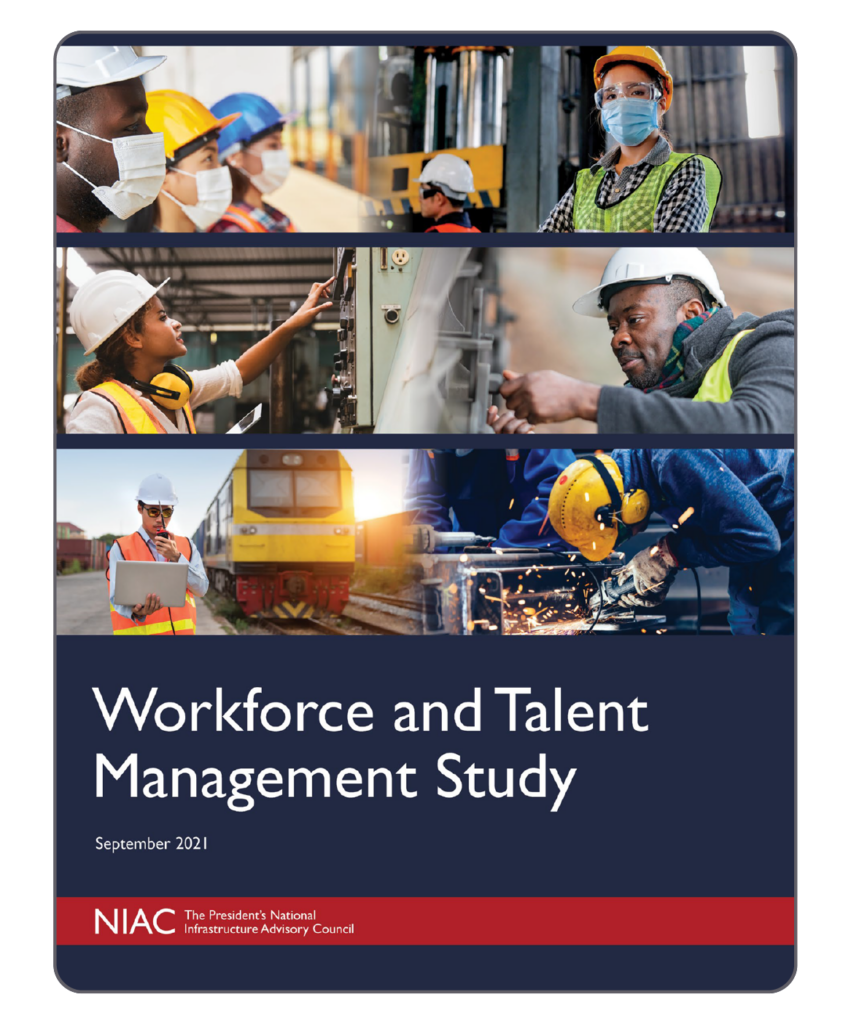
Workforce and Talent Management Study
This study provides an in-depth examination of the U.S workforce development system and offers nine recommendations to inform future policy development and keep the critical infrastructure workforce nimble in the face of change. The recommendations are guided by the principle that all workers must have access to the education, training, and resources necessary to begin and advance in critical infrastructure careers
National Infrastructure Advisory Council
September 2021
The Education/Career Readiness Continuum graphic on page 11 of the report might be useful to agencies considering comprehensive workforce development plans.

Rural Apprenticeships for Young People: Challenges and Strategies for Success
This report evaluates four rural registered apprenticeship programs in Maine, Arizona, Missouri, and Mississippi and identifies the key strategies in their approaches. It begins with defining rural apprenticeship programs and exploring their obstacles and benefits, and then discusses each of the four cases and concludes with recommendations for decisionmakers seeking to expand apprenticeship access in rural communities.
Urban Institute
August 2021
TOPICS: Apprenticeship , Community Engagement , Policy and Planning
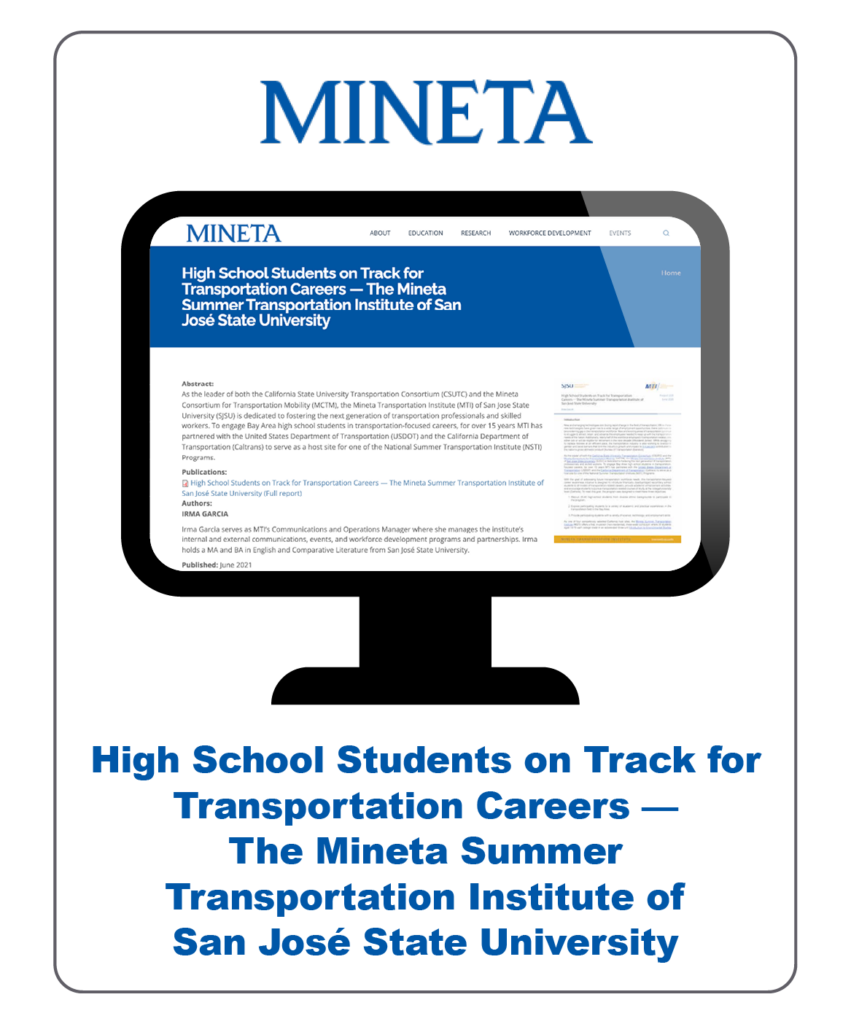
High School Students on Track for Transportation Careers
Mineta Transportation Institute
June 2021
TOPICS: Career Pathways , Community Engagement , Policy and Planning
This report provides an overview of the Mineta Summer Transportation Institute, one of the National Summer Transportation Institute (NSTI) Programs, which recruits high-school students, exposes them to a variety of academic and practical experiences in the transportation field in the Bay Area, and provides participating students with a variety of science, technology, and employment skills. The report shares program history, demographics, activities, etc.
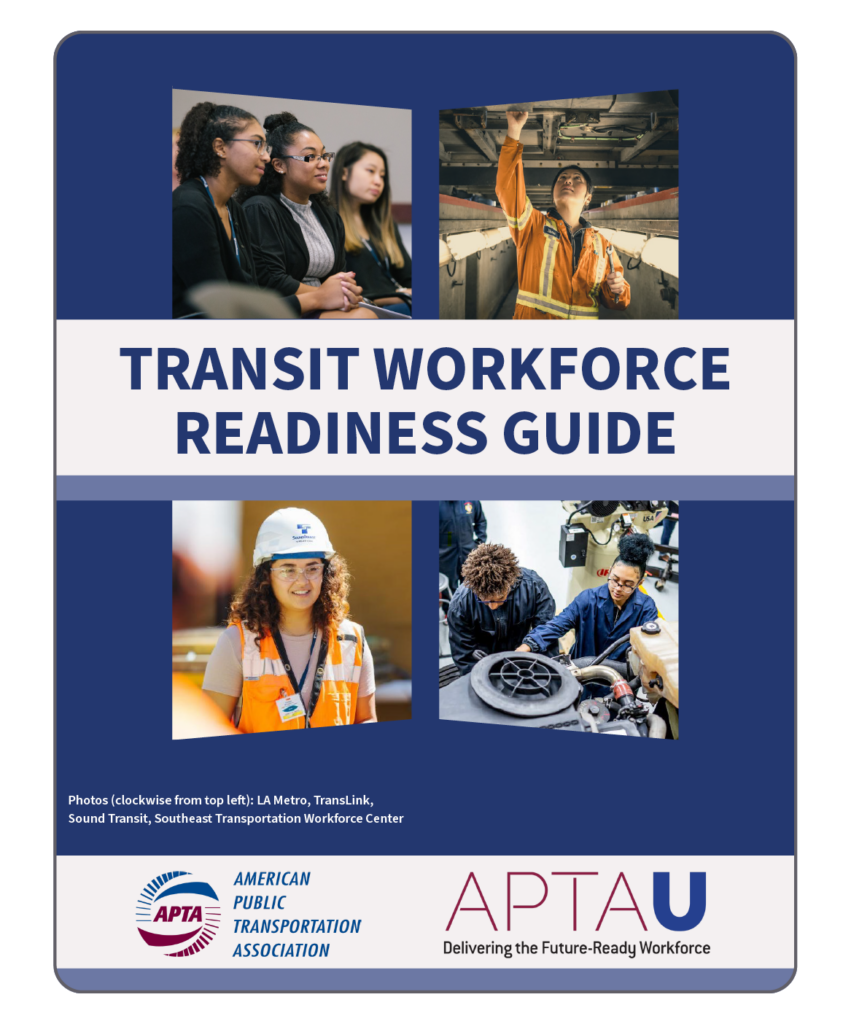
APTA Transit Workforce Readiness Guide
APTA’s Transit Workforce Readiness Guide is a highly interactive and easy-to-use online resource for executives and their staff to assist organizations in building a talent pipeline by attracting high school students into entry-level transit positions.
American Public Transportation Association
March 2021
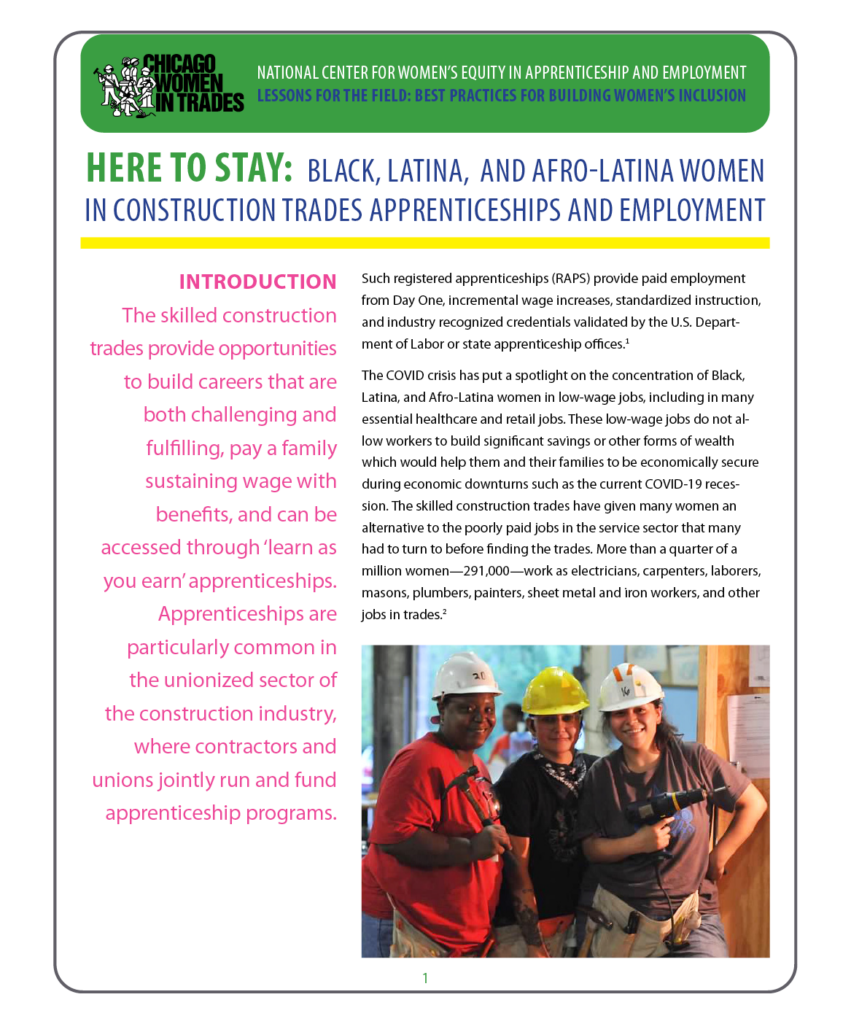
Here to Stay: Black, Latina, and Afro-Latina Women in Construction Trades Apprenticeships and Employment
Chicago Women in the Trades; Institute for Women's Policy Research
March 2021
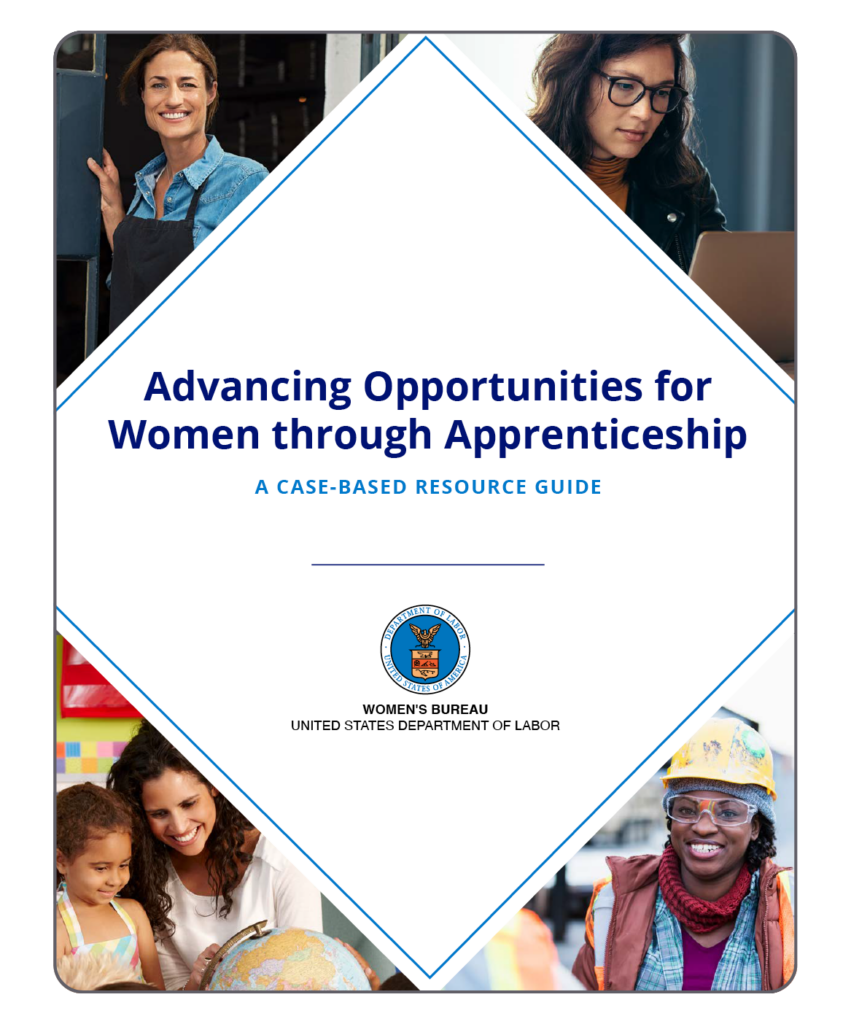
Advancing Opportunities for Women through Apprenticeship: A Case-Based Resource Guide
The Advancing Opportunities for Women through Apprenticeship case-based resource guide provides a framework for meaningful expansion of apprenticeship programs for women. The guide includes case studies on four high-quality pre-apprenticeship and apprenticeship programs in a range of industry sectors.
Department of Labor
TOPICS: Apprenticeship , Career Pathways , Community Engagement , Mentorship , Policy and Planning , Retention
The case studies were developed through on-site visits to the program locations; interviews with program staff, partners, and current and former participants; and a review of program materials and data. They provide information and insights related to partnership development, program design, and outcomes that outline how pre-apprenticeship and apprenticeship programs can help women access family-sustaining jobs and quality career pathways. The guide identifies common strategies across the four programs to help others learn how to create programs that successfully open pathways to in-demand jobs for women through apprenticeships.
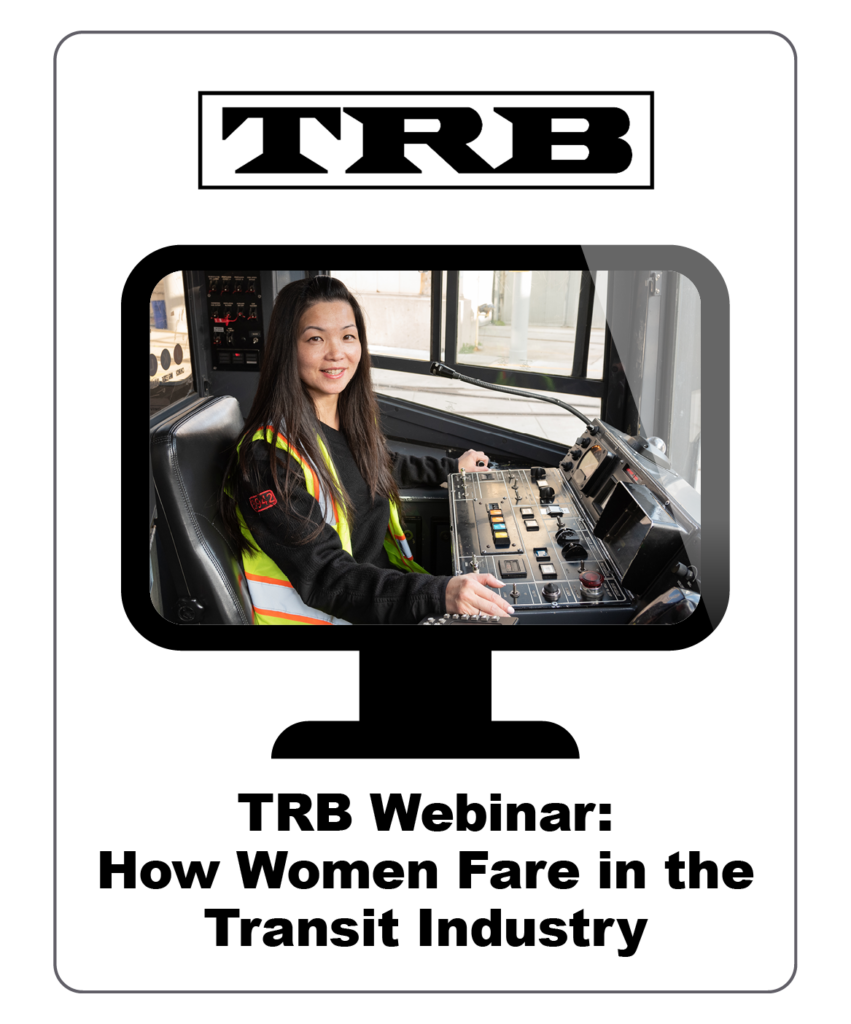
How Women Fare in the Transit Industry
In this TRB webinar, panelists discuss strategies to support women in transit and share examples of transit agencies that have effectively implemented programs to retain and advance women in the industry.
Transportation Research Board
September 2020
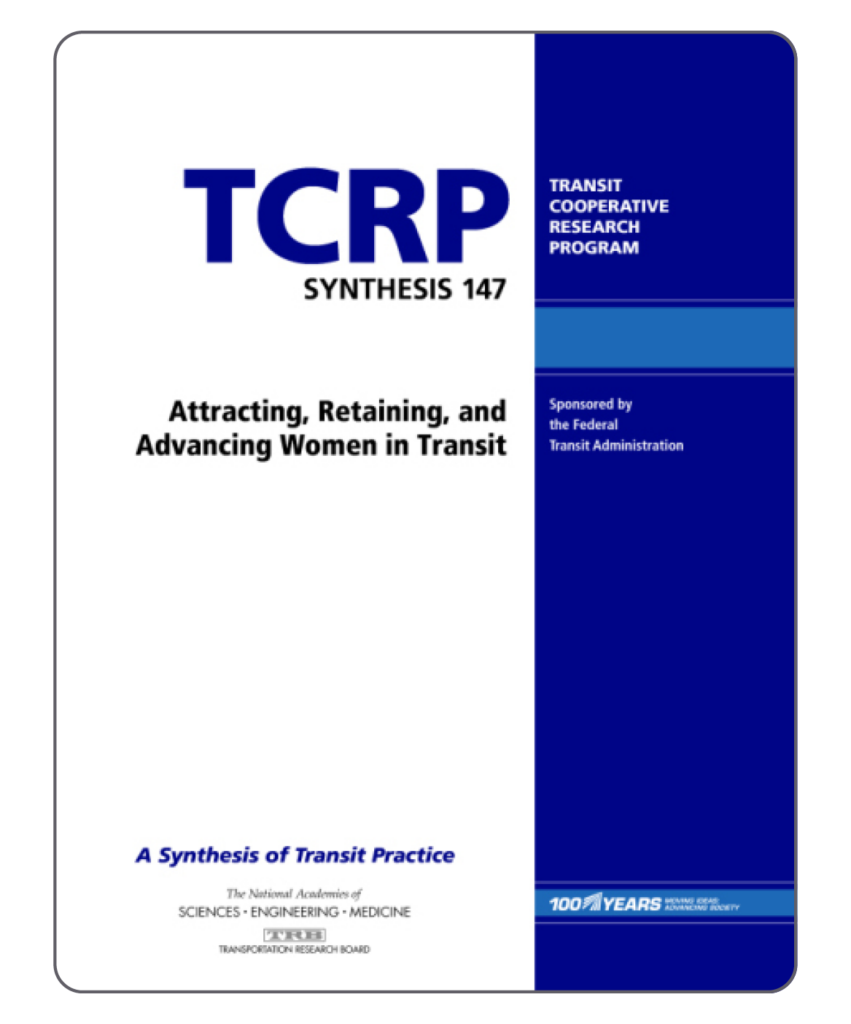
Attracting, Retaining, and Advancing Women in Transit
This TCRP report explores the strategies that have been deployed in transit and other related industries in order to attract, retain, and advance women in a variety of roles. It includes a survey and case studies from several major transit agencies.
Transit Cooperative Research Program
January 2020
TOPICS: Community Engagement , Hiring and Recruitment , Retention
Contributor(s): National Academies of Sciences, Engineering, and Medicine; Transportation Research Board; Transit Cooperative Research Program; ICF Allison Alexander
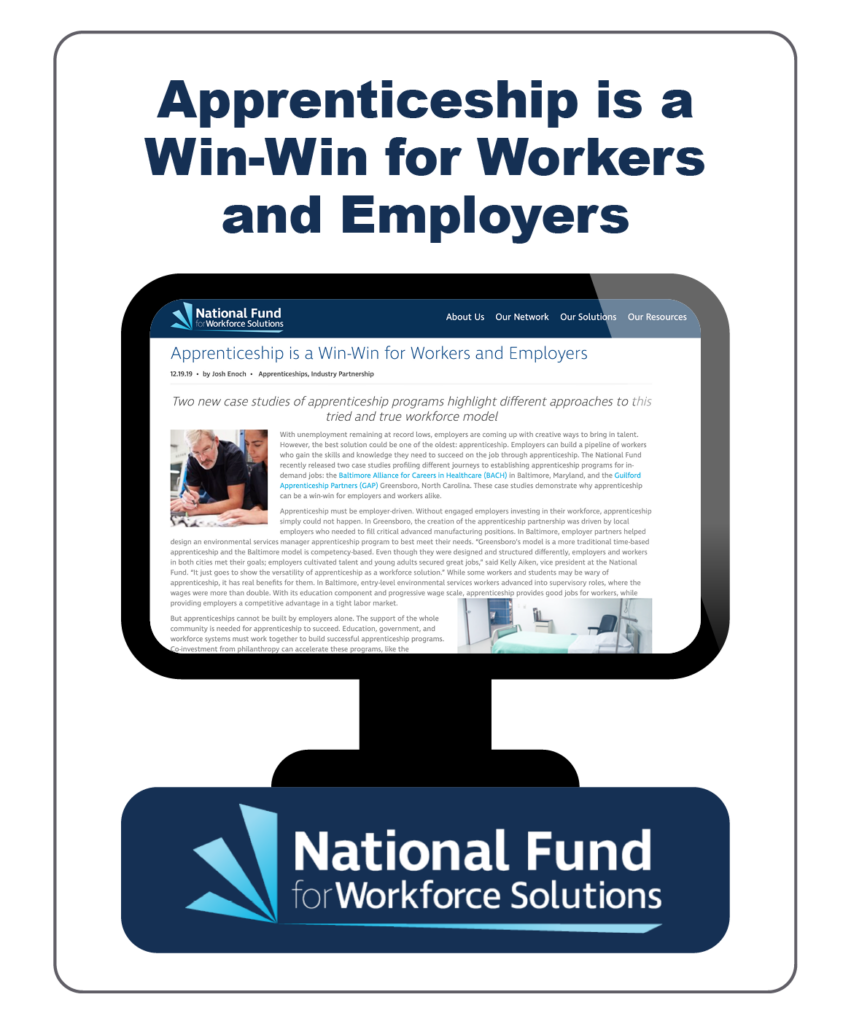
Apprenticeship is a Win-Win for Workers and Employers
These two case studies provide an analysis of apprenticeship programs at Baltimore Alliance for Careers in Healthcare (BACH) in Baltimore, Maryland, and the Guilford Apprenticeship Partners (GAP) in Greensboro, North Carolina. The case studies highlight the different approaches each organization used for their apprenticeship programs.
National Fund for Workforce Solutions
December 2019
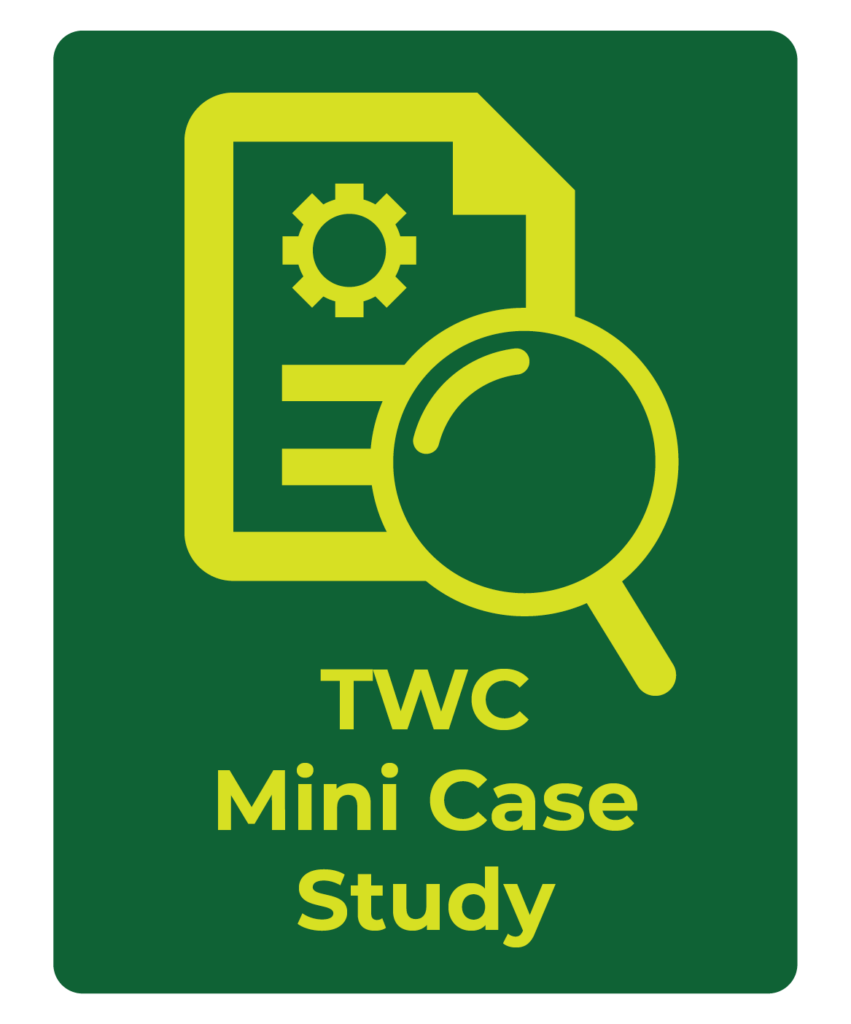
Emerging Leaders Presentation: Recruiting & Retaining Bus Operators
This slidedeck, from the APTA Emerging Leaders Program class of 2019 presentations, provides an overview of research and transit agency case studies to capture key themes on the topics of bus operator recruitment and retention.
American Public Transportation Association
December 2019
TOPICS: Career Pathways , Community Engagement , Hiring and Recruitment , Retention
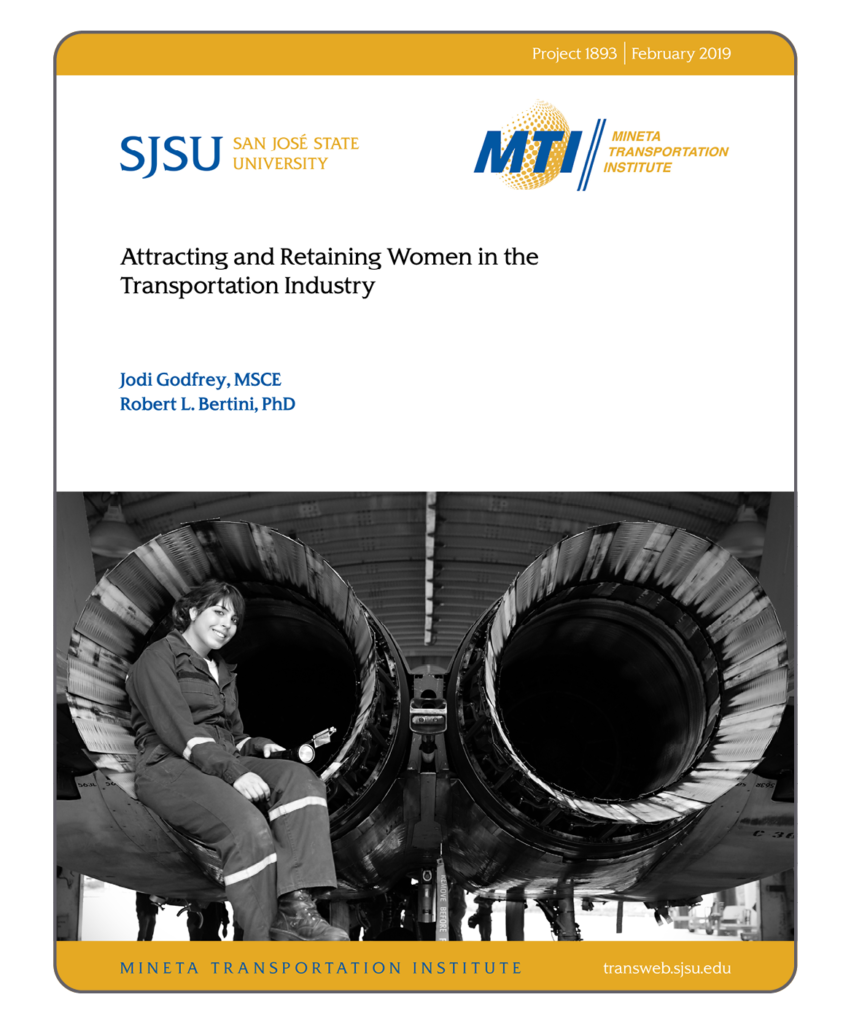
Attracting and Retaining Women in the Transportation Industry
This study synthesizes previously conducted research and identifies additional research needed to attract, promote, and retain women in the transportation industry, particularly emphasizing the importance of community-orientation and mentoring.
Mineta Transportation Institute
February 2019
TOPICS: Community Engagement , Hiring and Recruitment , Mentorship , Retention
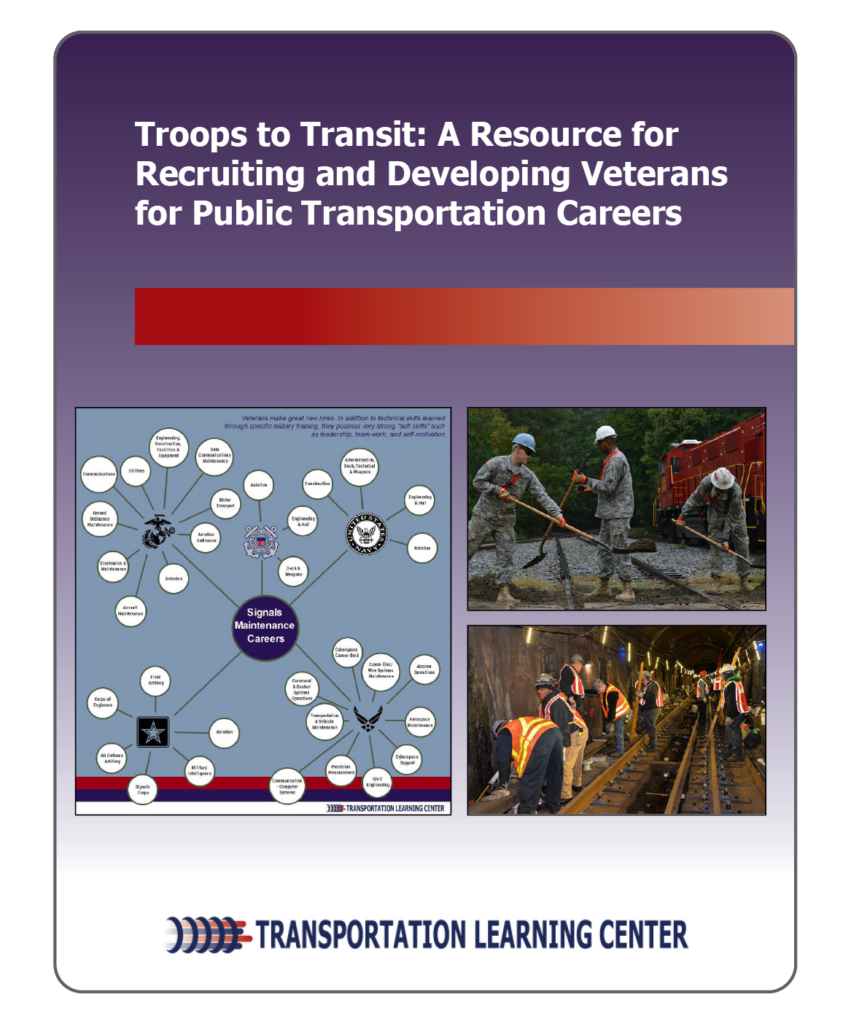
Troops to Transit: A Resource for Recruiting and Developing Veterans for Public Transportation Careers
The International Transportation Learning Center’s analysis of Bureau of Labor Statistics data has shown that the transportation industry in large will likely see a massive front-line labor shortage in the next ten years unless it is able to find and hire skilled workers. In fact, it is estimated that 126 percent of today’s transit workforce will have to be hired and trained in the next ten years.
In order to help fill this need, the center has produced a Veterans Crosswalk tool (see Excel document below) which matches skill-sets learned during military service with the kinds of skills that public transportation agencies look for when hiring signals maintainers. This product was produced in cooperation with a Veterans Taskforce made up of veterans who are also Subject Matter Experts in the field of Signals Maintenance. This detailed matrix has been distilled down into a user-friendly Veteran’s Factsheet (see PDF below) which provides at-a-glance information for both veterans interested in a signals career and for agencies looking to hire skilled veterans.
The tool is accompanied by a summary report.
International Transportation Learning Center
November 2016
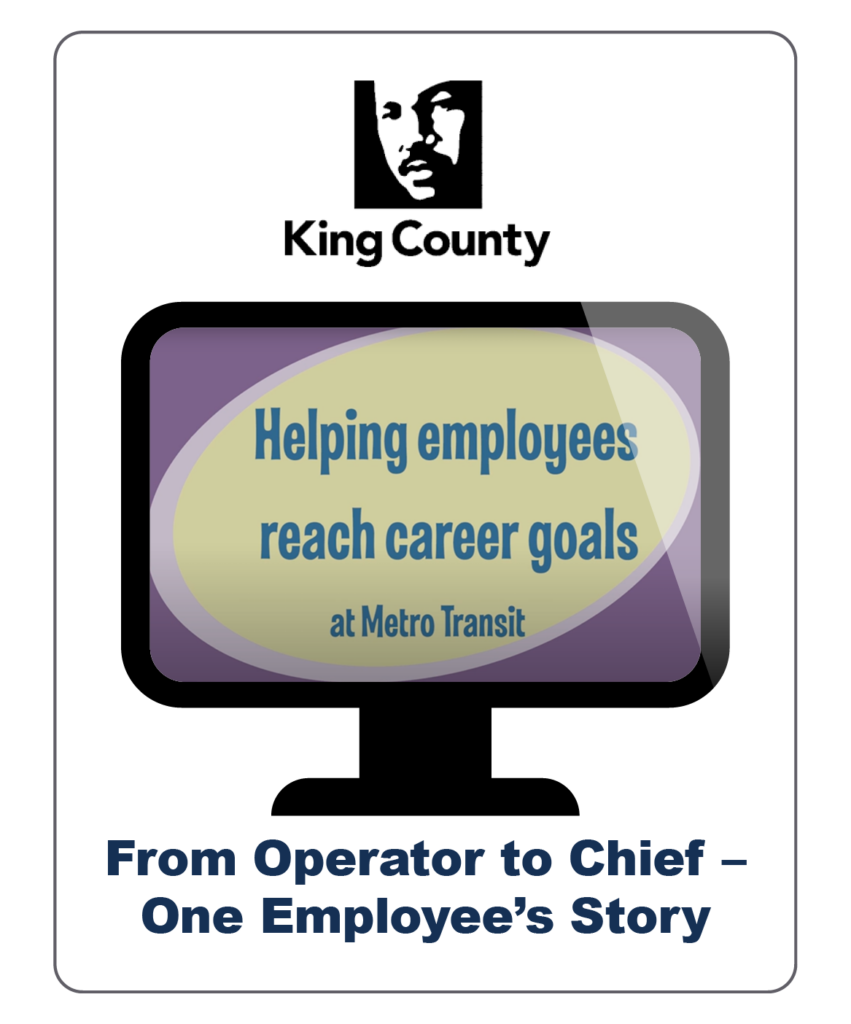
From Operator to Chief – One Employee’s Story
This video provides a description of King County DOT’s program for recruitment and advancement options for current employees, along with one employees’ story about how he was supported in his journey from bus operator to Base Chief.
King County Department of Transportation
October 2015
TOPICS: Career Pathways , Community Engagement , Hiring and Recruitment , Retention , Training
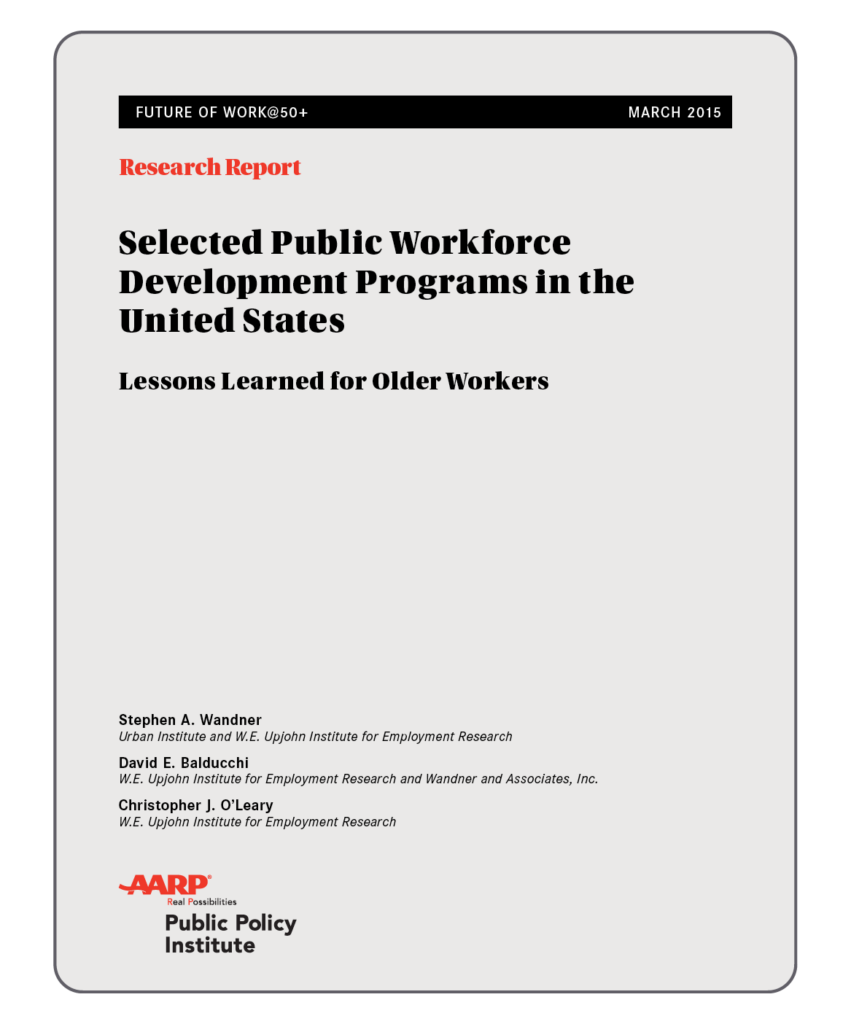
Selected Public Workforce Development Programs in the United States: Lessons Learned for Older Workers
This report provides a selective review of public workforce development programs in the United States over the past 80 years, placing special emphasis on the importance these programs have to older Americans. It discusses how the public workforce system developed, how it operates today, significant programs and target groups, common employment services and job training strategies, and what is known about program effectiveness.
American Association of Retired Persons
March 2015
TOPICS: Community Engagement , Policy and Planning
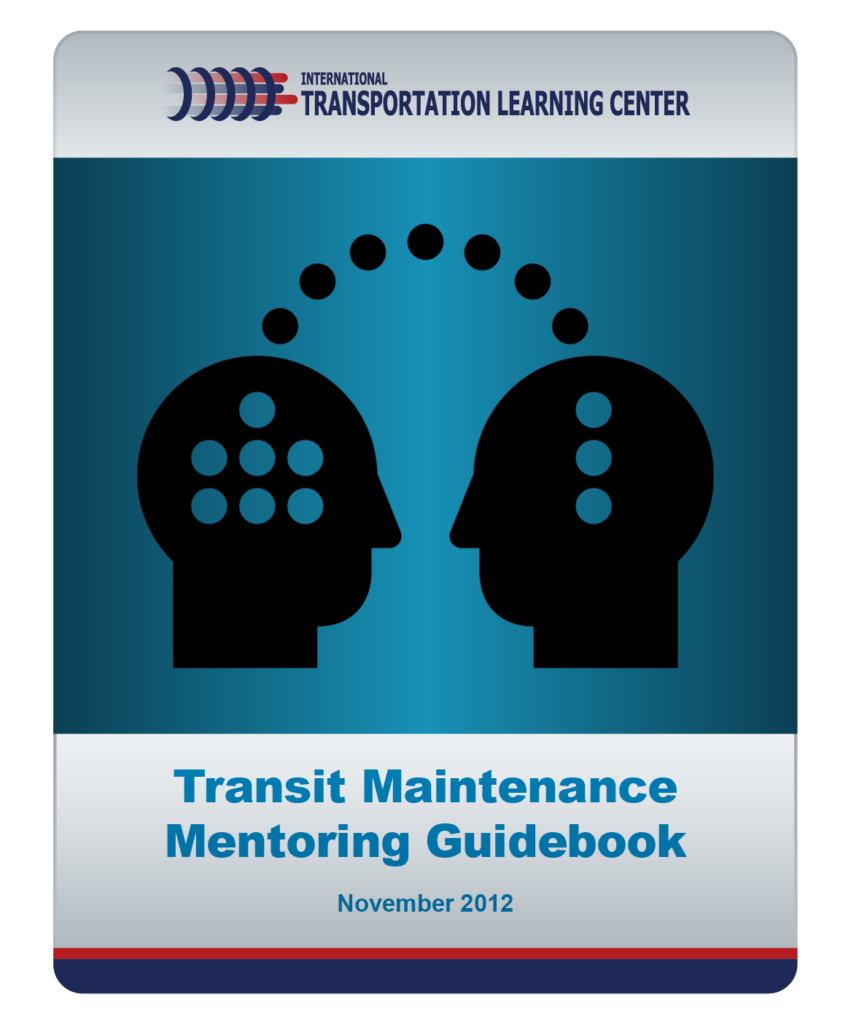
Transit Maintenance Mentoring Guidebook
The purpose of this report is to serve as a guidebook, offering information that transit agencies can use to establish mentoring as a training method with guidance, suggestions, and examples to implement or expand upon existing mentoring programs. It is based on a generic mentoring guidebook developed by the USDOT, modified and enhanced to reflect transit maintenance applications.
International Transportation Learning Center
November 2012
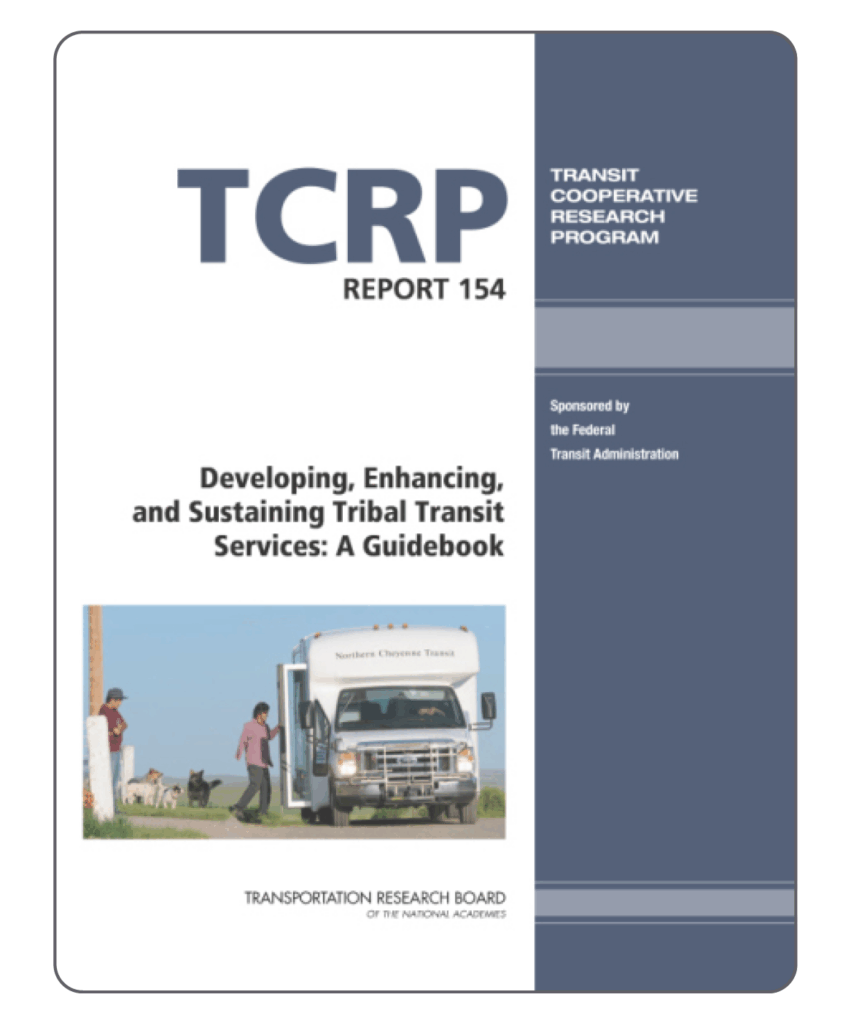
Developing, Enhancing, and Sustaining Tribal Transit Services: A Guidebook
TRB’s Transit Cooperative Research Program (TCRP) Report 154: Developing, Enhancing, and Sustaining Tribal Transit Services: A Guidebook offers guidance about the various steps for planning and implementing a tribal transit system. The steps that are described may be used for planning a new transit system, enhancing an existing service, or taking action to sustain services.
Transit Cooperative Research Program
January 2012
TOPICS: Community Engagement , Policy and Planning , Training
Contributor(s): National Academies of Sciences, Engineering, and Medicine; Transportation Research Board; Transit Cooperative Research Program; Albert T. Stoddard, III; David Sampson; Jill Cahoon; Ronald Hall; Peter Schauer; Valerie J. Southern; Tangerine Almeida
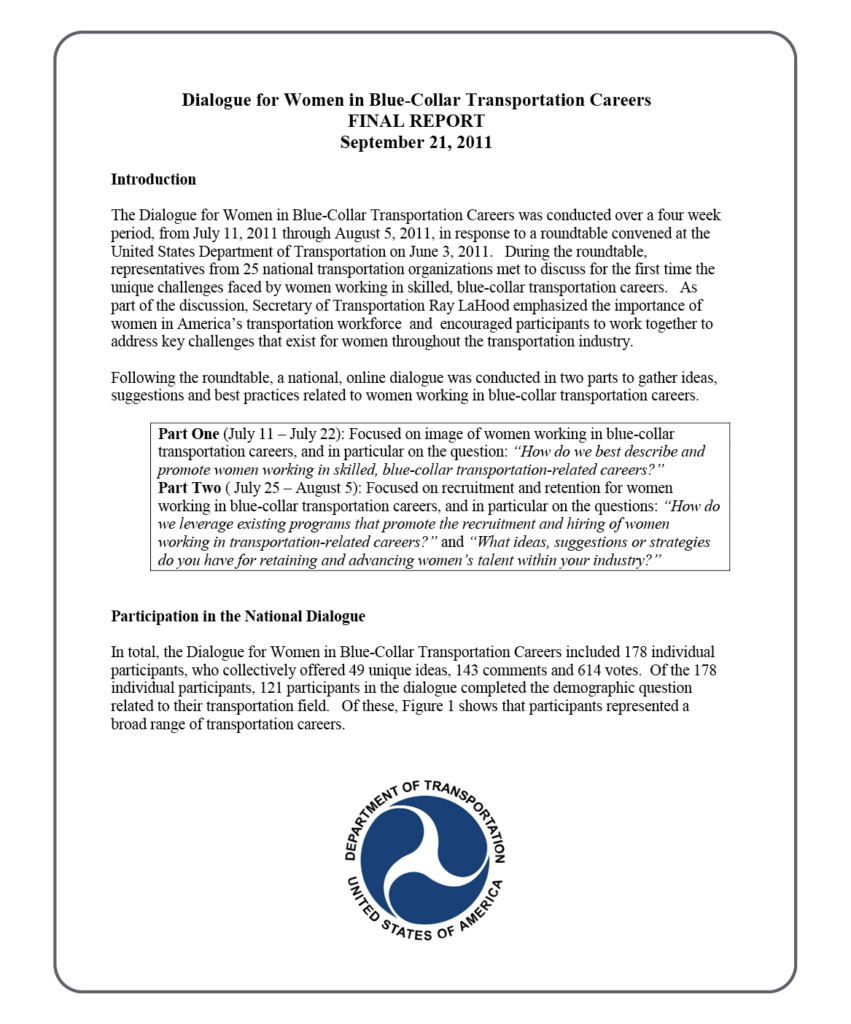
Dialogue for Women in Blue-Collar Transportation Careers
This short summary report describes unique challenges and recommendations regarding women in blue-collar positions in transportation.
US Department of Transportation
September 2011
TOPICS: Community Engagement , Hiring and Recruitment , Retention
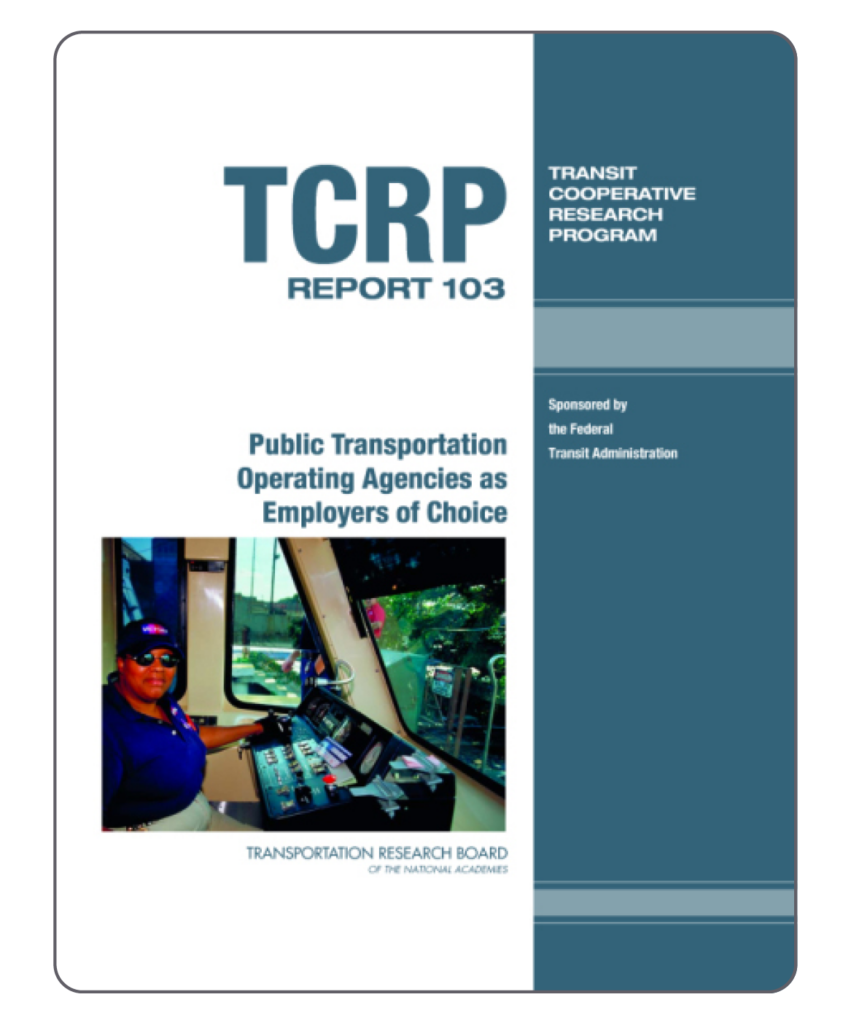
Public Transportation Operating Agencies as Employers of Choice
TRB’s Transit Cooperative Research Program (TCRP) Report 103 documents principles, techniques, and strategies that are used in workforce recruitment, development, and retention. The report includes a companion document, “Communications Strategy and Implementation Plan, Positioning the Public Transportation Operating Agency as an Employer of Choice” that describes strategies and solutions that offer the greatest potential for positioning public transportation operating agencies as an employer of choice.
Contributors: Watson Wyatt Worldwide and Focus Group Corporation
Transit Cooperative Research Program
January 2004
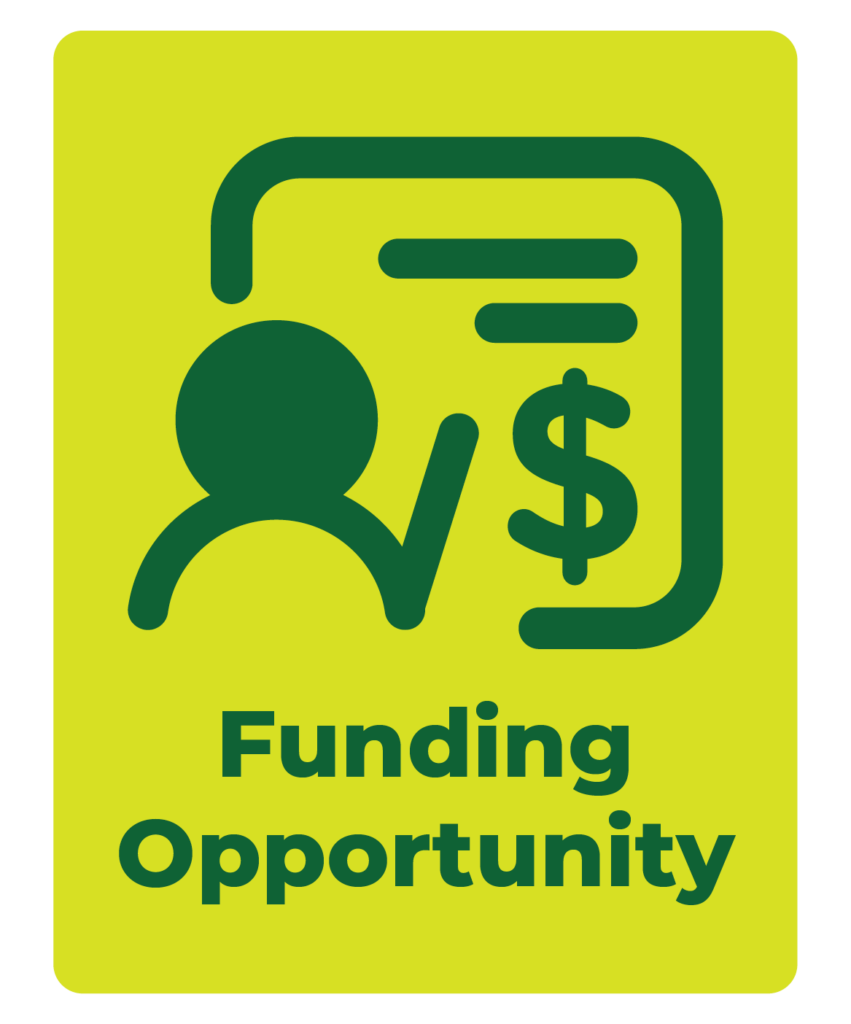
Appalachian Regional Initiative for Stronger Economies (ARISE)
Administering Agency: Appalachian Regional Commission (ARC)
Closing Date for Applications: Applications will be accepted on a rolling basis
Funding Range: $73.5M available total
Geographic Scope: Regional
Description: ARISE is an ARC initiative that aims to drive large-scale, regional economic transformation through multistate, collaborative projects across Appalachia.
With the additional funding provided by the Bipartisan Infrastructure Law, also known as the Infrastructure Investment and Jobs Act of 2021, ARC launched ARISE to strengthen Appalachian business and industry, and to grow and support the development of new opportunities across multiple states.
Posted January 20, 2023 to TWC Resource Center. Please refer to the link below for the most up to date information from the funder.
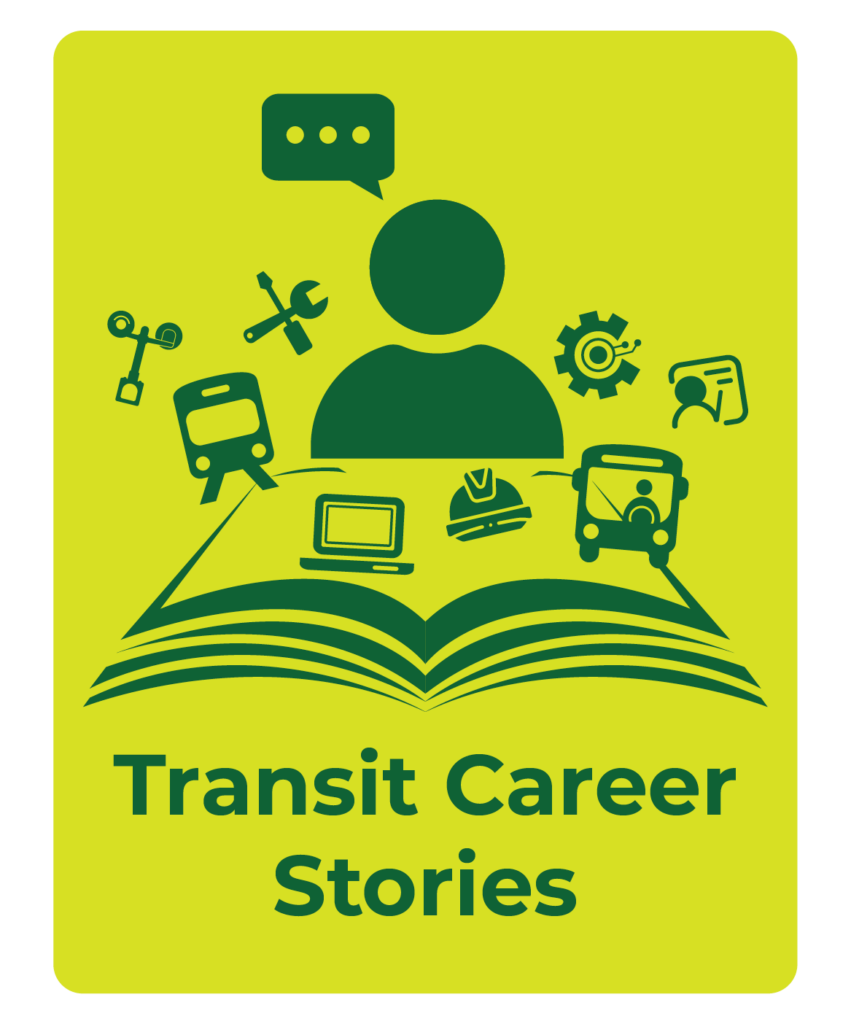
Transit Career Stories
Transit Workforce Center
TOPICS: Career Pathways , Community Engagement , Mentorship
These Transit Career Stories showcase workers’ journeys and career pathways to help increase awareness of transit careers. Learn from these professionals and community leaders through their own telling of what they do, how they got there, and what makes their work exciting and rewarding.
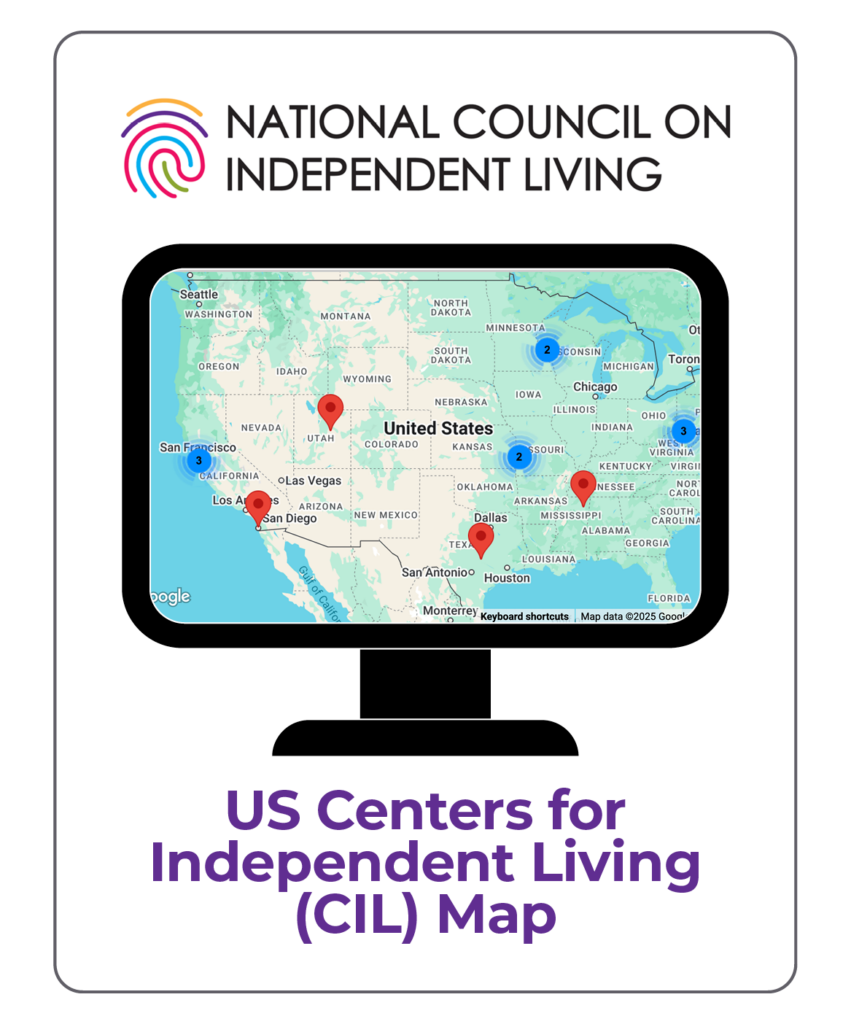
US Centers for Independent Living (CIL) Map
National Council on Independent Living
NCIL maintains a map of US CILs on their website. CILs can be a great partner in connecting people with disabilities to transit jobs. CILs are advocacy organizations run by and for people with disabilities in local communities. CILs provide peer support, independent living skills training, information and referral, individual and systems advocacy, and transition from institutions and secondary education. Use the link below to find the nearest your nearest CIL.








